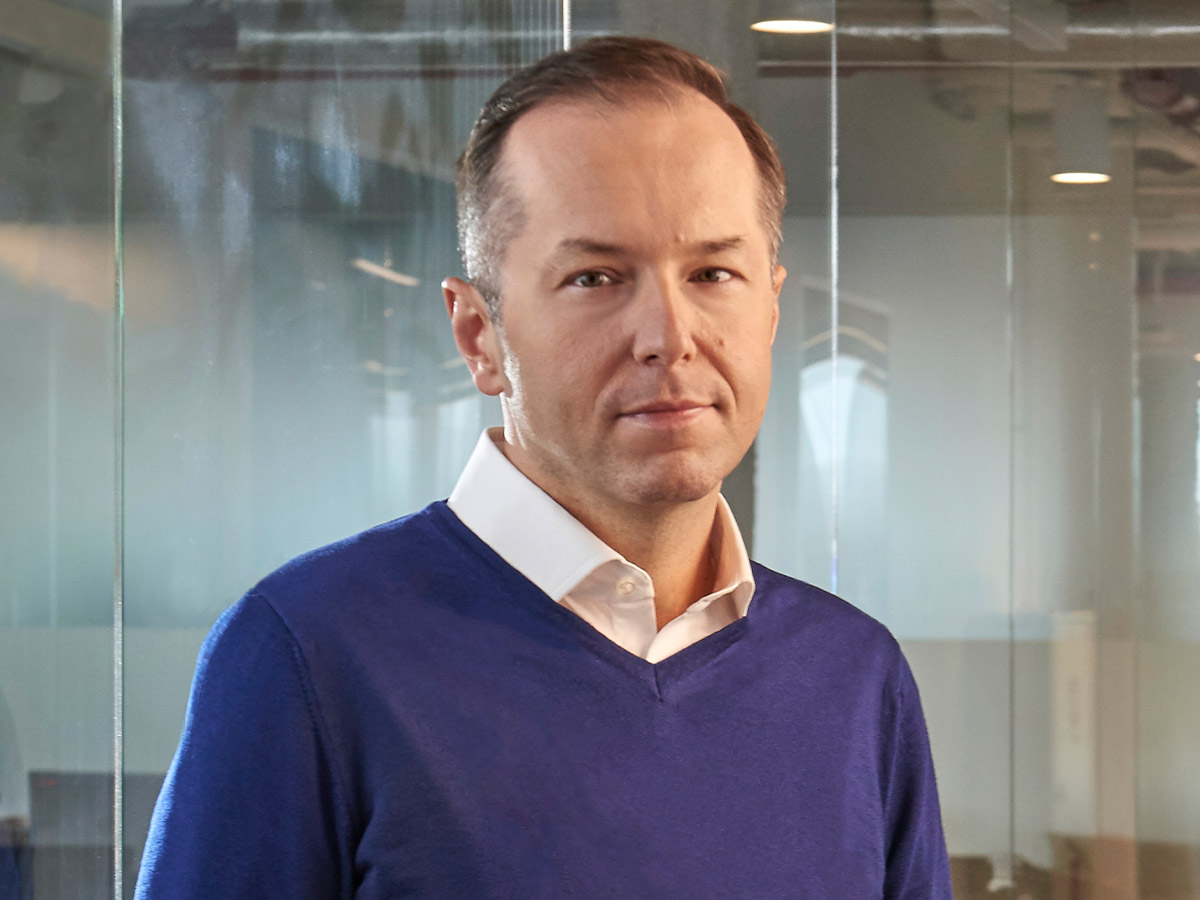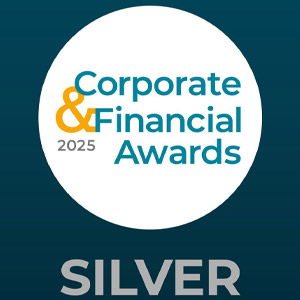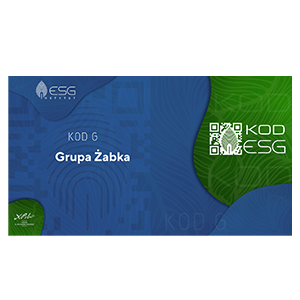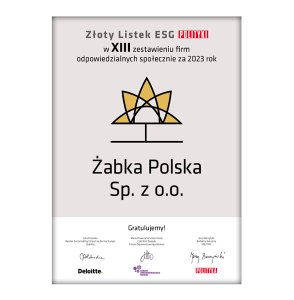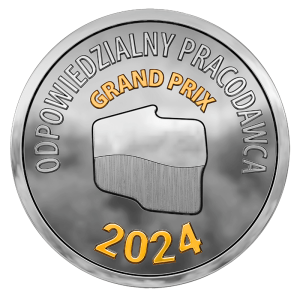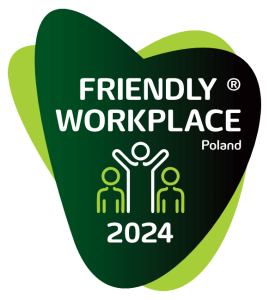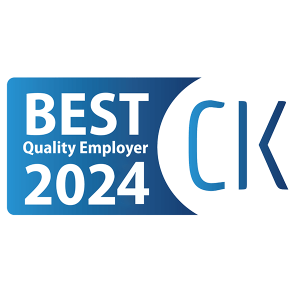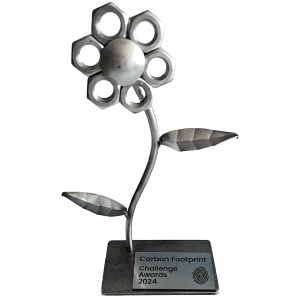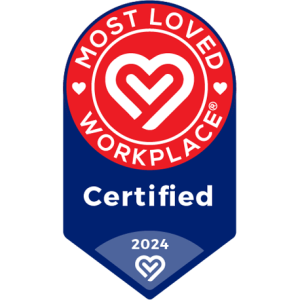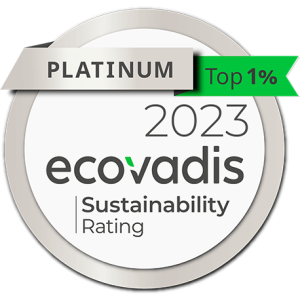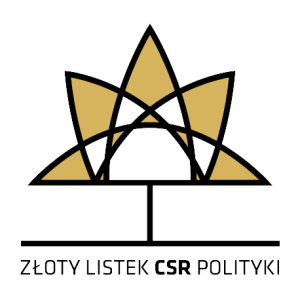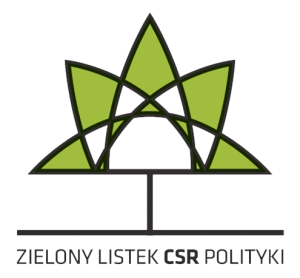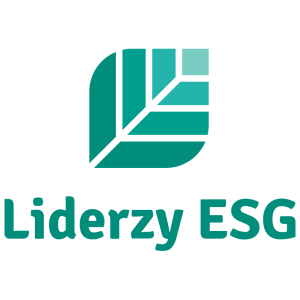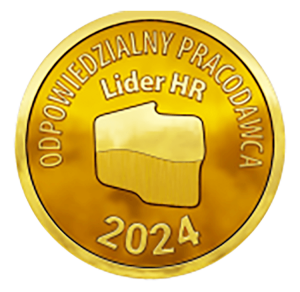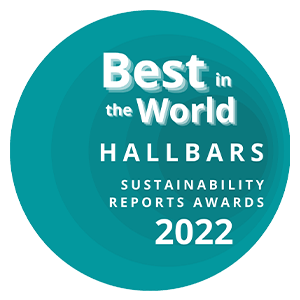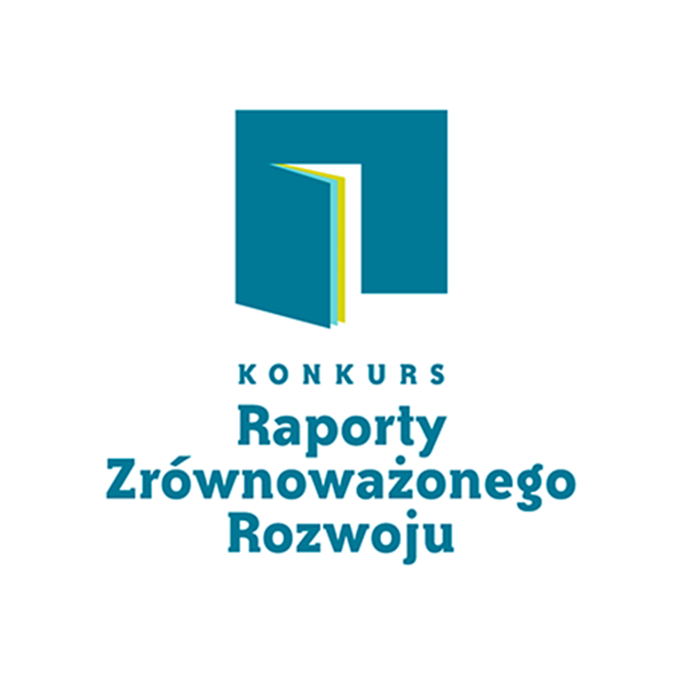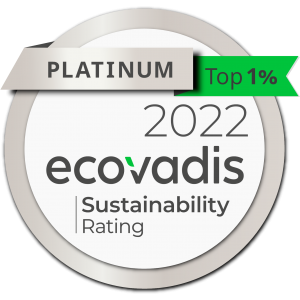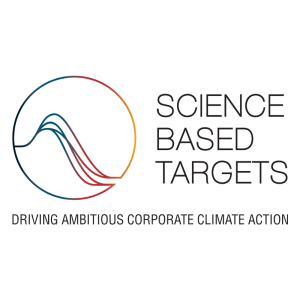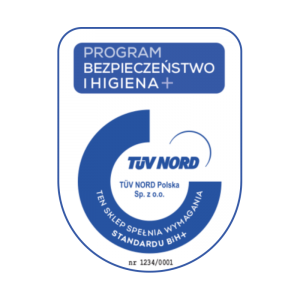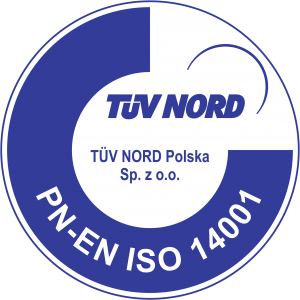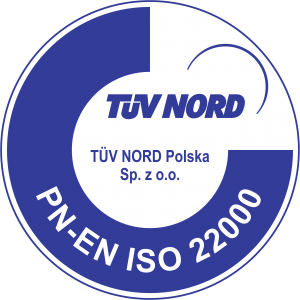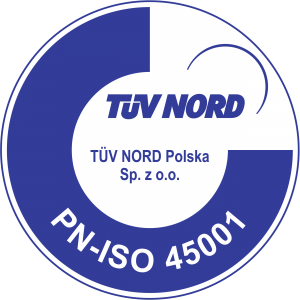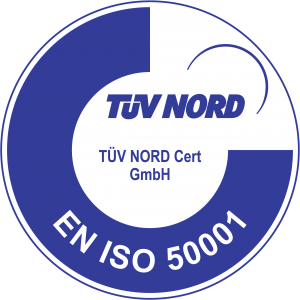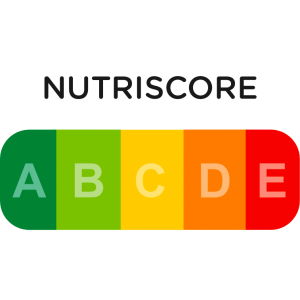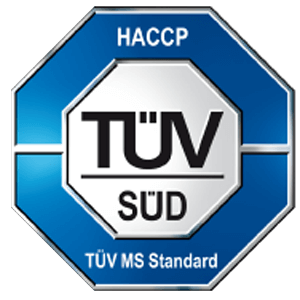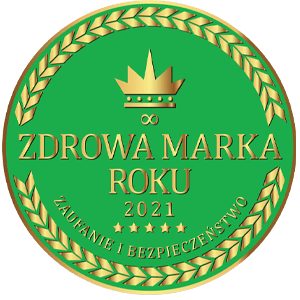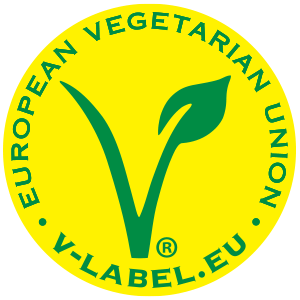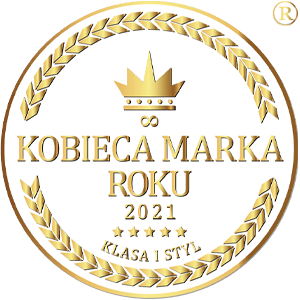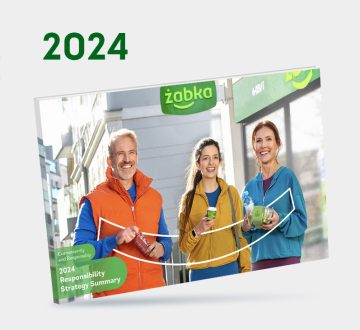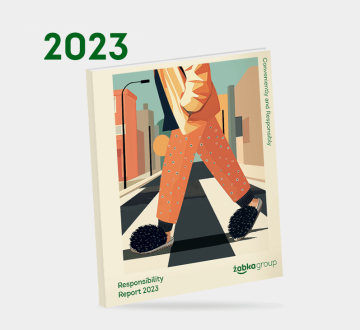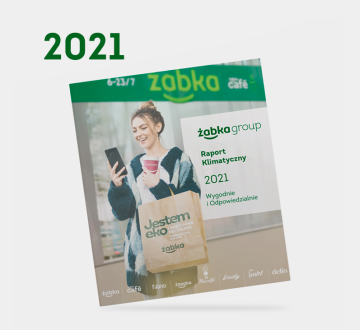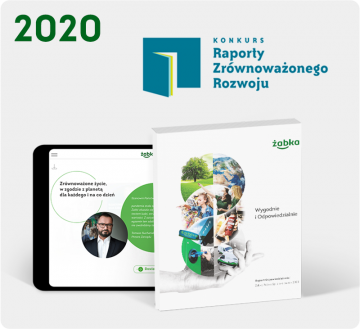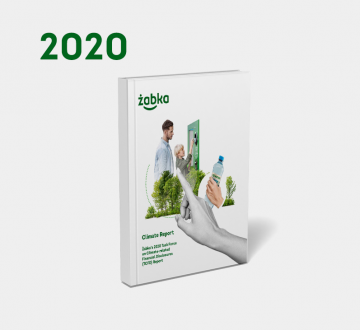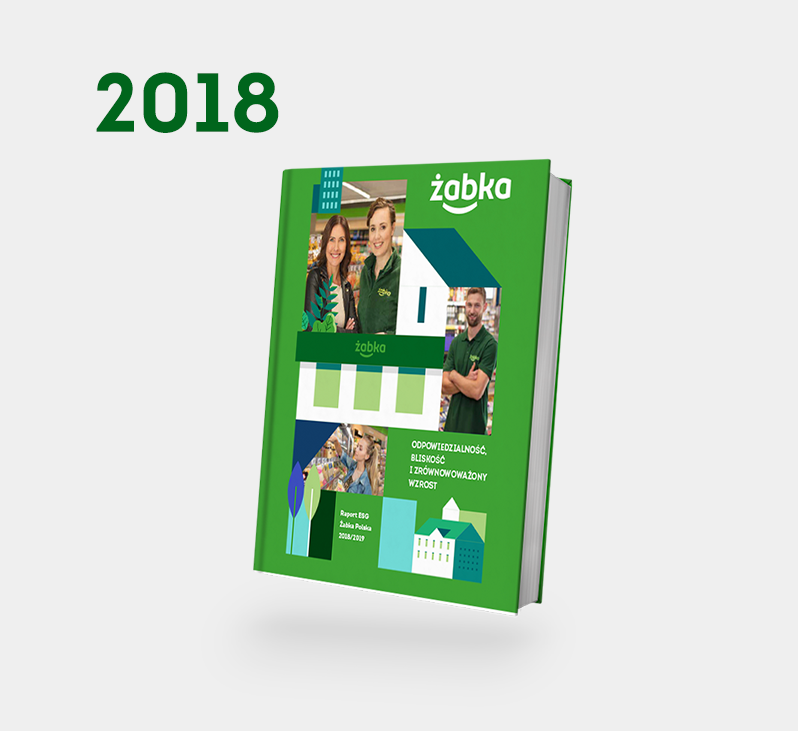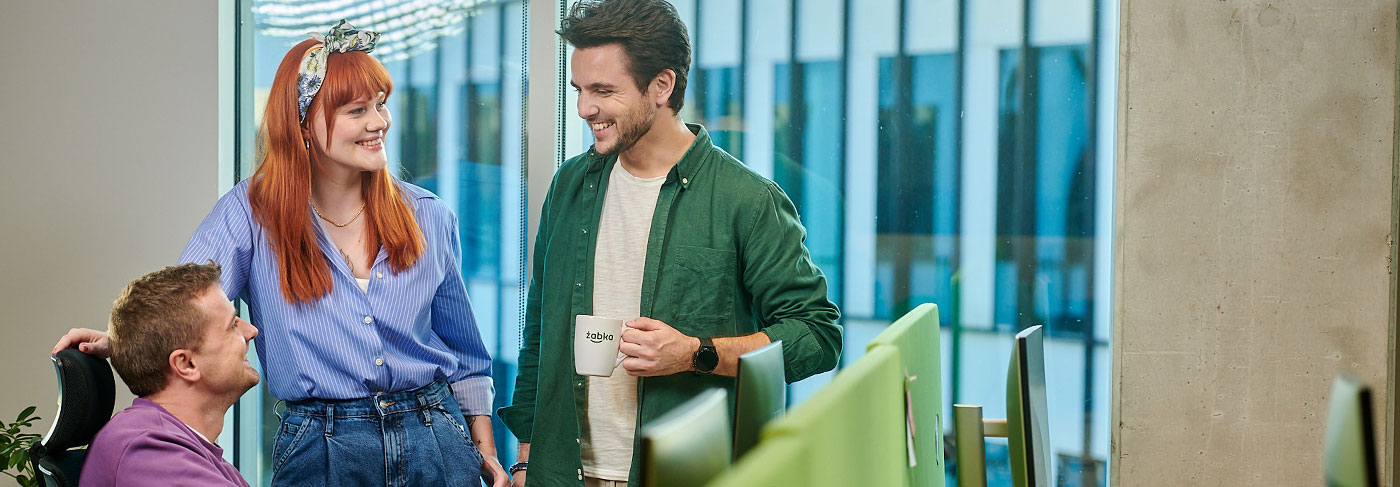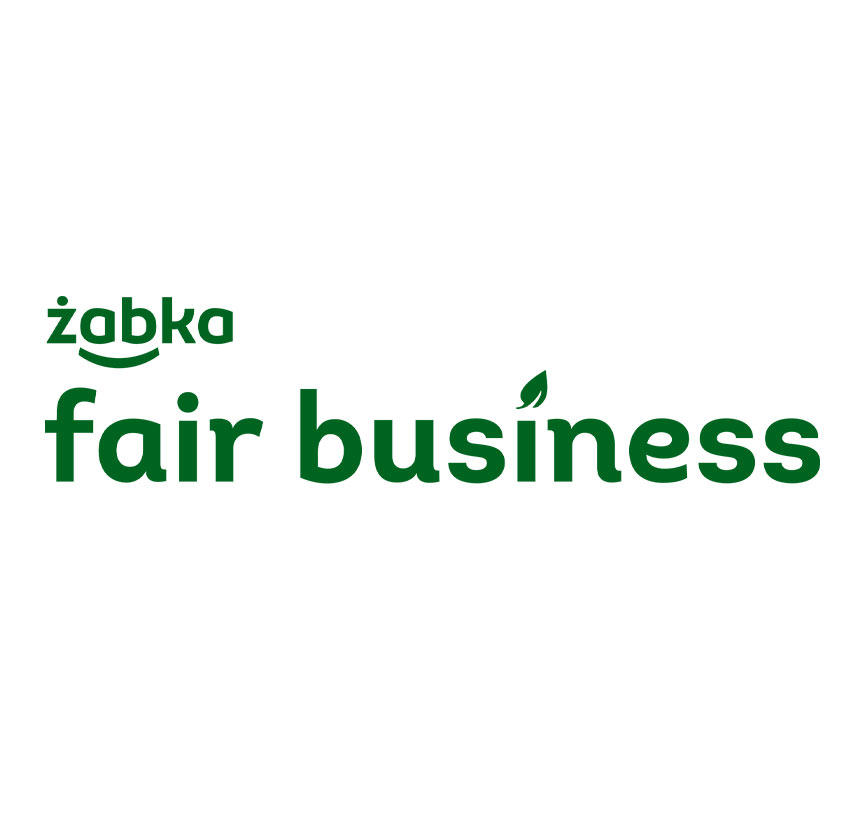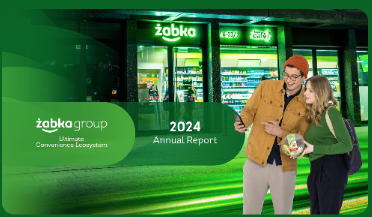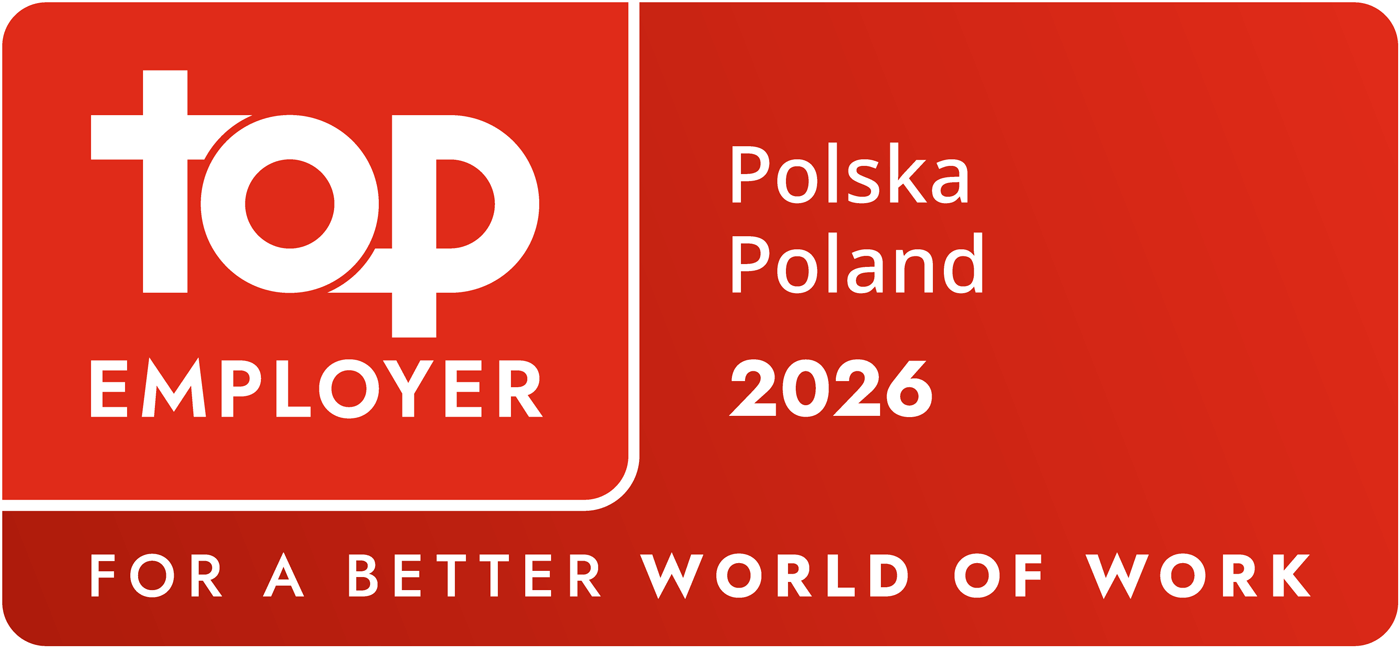Żabka Group’s ESG Framework
We create value by making people’s lives easier and by allowing them to free up their time, while promoting sustainable living for everyone, every day. Żabka Group’s ESG Framework is implemented under four pillars.
-
We make it easy for customers to change their habits for the better. read more >
-
We make a positive impact with entrepreneurs on the economy. read more >
-
We shape a purpose-led trusted organisation of empowered people. read more >
-
We minimise our environmental impact across the whole value chain. read more >
Management Committee about ESG Framework
Aiming to implement the ESG Framework, we are undertaking the following activities:

Reimagining ready meals together with Hilton Foods
Reimagining ready meals together with Hilton Foods
Every day, more than 4.1 million transactions take place in Żabka stores, and we feel a strong responsibility to support our customers in building healthy and sustainable eating habits. That’s why, as part of the “Porcja DobreGO!” initiative, we collaborate with trusted suppliers such as Hilton Foods to create tasty, nutritious, and high-quality ready meals.
As Jakub Malec, Sustainable Food Manager at Żabka, highlights: ‘Our work with the Hilton Foods team is truly unique. Our shared priority is to ensure customers have easy access to balanced meals for any time of day. Thanks to our close cooperation, we can do this even more effectively. Together, we focus on developing new recipes and improving existing ones to better meet the needs of today’s consumers.’
Regularly held workshops involving Żabka’s nutrition experts, the NPD team responsible for new product development, and Hilton Foods representatives allow us to create innovative ready meals based on expert knowledge and the highest quality standards. This process includes ingredient selection, production planning, kitchen and production testing, sensory panels, and nutritional value calculations.
Alongside new product development, we are also engaged in intensive reformulation efforts with Hilton Foods to improve the recipes of existing products. Our goal is for our meals to achieve the highest possible Nutri-Score ratings and meet clean label criteria. Hilton Foods also supports us in ensuring that the ingredients used in our meals are certified in line with our quality and sustainability policies.
An important aspect of our collaboration is inventory management and food waste prevention. Through close coordination with Hilton Foods, we can better plan orders and adjust production to actual demand, minimising waste.
It is through partnerships like this that we can fulfil our mission: promoting a sustainable lifestyle for everyone, every day.
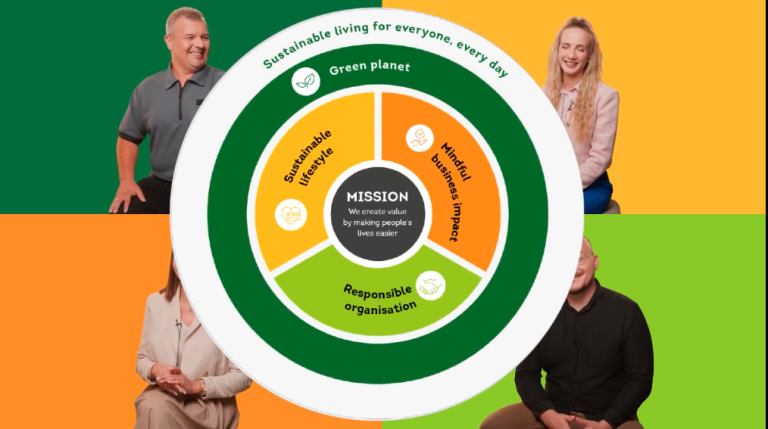
How do we implement the Responsibility Strategy with our franchisees?
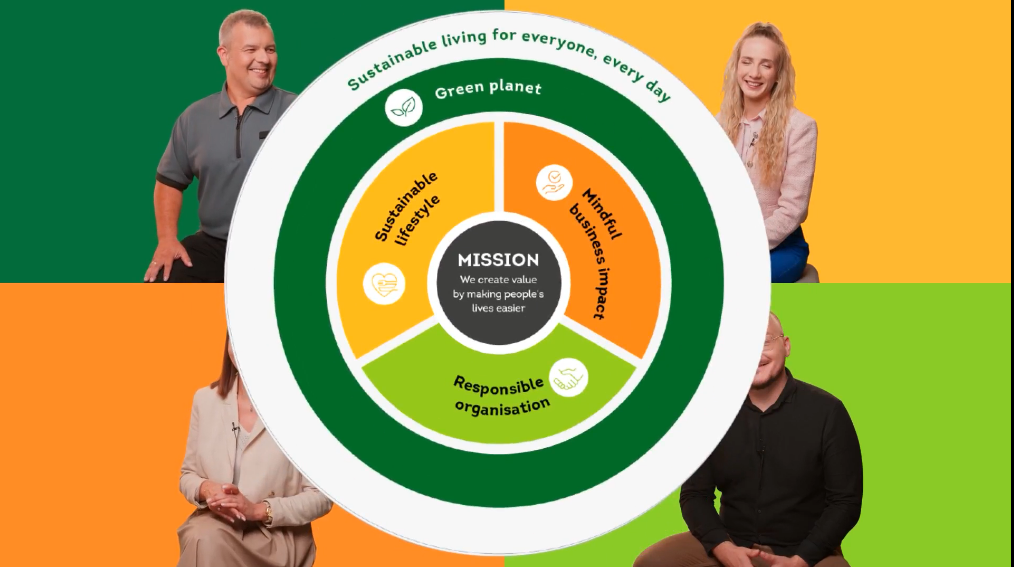
How do we implement the Responsibility Strategy with our franchisees?
How do franchisees support good nutrition?
How do franchisees minimise food waste?
How do franchisees co-create innovations at Żabka?
What can franchisees do for local communities?
What does responsible selling involve?
How do franchisees support circularity?
How do franchisees contribute to decarbonisation?

Equal pay, equal opportunities – Żabka Group once again awarded the EQUAL-SALARY certification
Equal pay, equal opportunities – Żabka Group once again awarded the EQUAL-SALARY certification
Żabka Group has once again been awarded the prestigious EQUAL-SALARY certification, reaffirming the company’s long-term commitment to ensuring pay equity across its organisation. Granted by the Swiss EQUAL-SALARY Foundation, the certification is based on international equality standards aligned with the United Nations Sustainable Development Goals and recognised by the European Commission. It confirms that Żabka consistently strives to provide equal development opportunities for all employees, regardless of gender.
Verified Pay Equity
The certification was granted following an independent audit conducted by PwC, in which 2,800 employees from the Group’s headquarters, logistics centres and subsidiaries participated. The process included a detailed analysis of payroll data, anonymous surveys, and interviews with employees, senior management and the HR team. The audit confirmed that Żabka’s gender pay gap remains below 5% – significantly lower than the EU average of 12.7% and the Polish average of 7.8%.
Żabka first achieved EQUAL-SALARY certification in 2022, becoming the first Polish retail company to do so. The certification is valid for three years, after which companies must undergo re-evaluation to confirm ongoing compliance. Żabka’s successful re-certification demonstrates its continuous monitoring and improvement of pay processes.
Empowering Growth for All
– Diversity and equality are key to building our competitive advantage – they drive us forward and enable our growth. Being re-awarded the EQUAL-SALARY certification confirms that at Żabka, pay truly has no gender. It’s an important signal that we are creating an environment where everyone has equal opportunities for development and influence. This is what responsible leadership means to us – Jolanta Bańczerowska, Management Board Member, Chief People Officer, Żabka Group.
The certification not only validates Żabka’s high internal standards, but also represents a strong voice in the broader dialogue on pay equality in business.
– This year is particularly important for pay equality and workplace diversity, as new Polish and EU regulations are coming into effect. It is encouraging to see companies like Żabka that have long embedded equality into their culture and continue to uphold these values in practice. Such examples set a positive benchmark for other employers who are just beginning their journey – Katarzyna Komorowska, Partner, PwC Polska.
Responsible Business in Action
Żabka Group’s business strategy is deeply intertwined with its cultural foundations, forming the pillar of a ‘Responsible Organisation.’ Objective pay criteria – such as skills, performance, and impact on the organisation – strengthen a culture of accountability and trust, attract top talent, and foster engaged teams. The company upholds the principles of equal treatment, respect for individuality and diversity, recognising these as strategic assets that fuel innovation and strengthen competitive advantage.
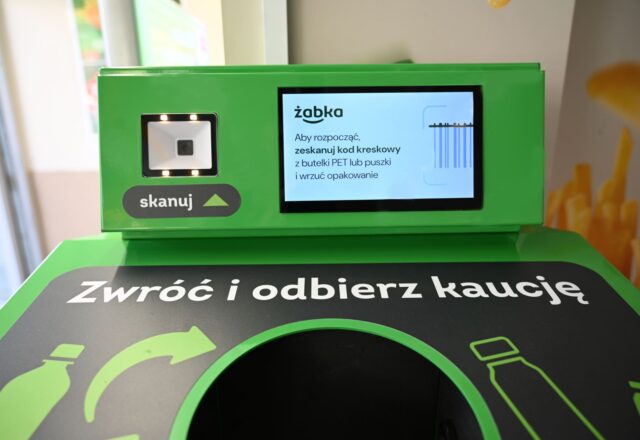
Driving change with customers – small steps, big impact
Driving change with customers – small steps, big impact
At Żabka Group, supporting a circular economy is a key part of our ESG Framework and Environmental Policy Environmental and Climate Framework Policy. That’s why we make packaging returns simple and accessible across all our retail chains. Both in Poland and Romania, Żabka Polska and Froo Romania actively participate in national Deposit Return Systems (DRS), helping reduce waste and increase recycling rates. ️
In Poland, the system was launched in October 2025 and applies to bottles and cans from 0.1 to 3 liters made of glass, PET, and metal. Almost all of our 12,000 Żabka stores across the country are already part of this system – even though not all are legally required to join. Customers can return both deposit and non-deposit packaging directly in stores, using either manual collection or one of over 2,500 automated reverse vending machines (RVMs), all clearly marked in green.
Each returned deposit bottle or can generates a refund or discount at checkout, while all returned packaging (including non-deposit items) earns additional points in our application – making responsible habits simple, convenient, and part of everyday life.
In Romania, the system – called RetuRO – was launched on 30 November 2023 and covers all retailers. All Froo Romania stores are legally required to provide packaging waste collection at each point of sale. In our largest stores, we have additionally installed RVMs to ensure automated and efficient collection for customers.
By implementing the Deposit Return System in both markets, we’re making recycling more accessible, empowering customers to act responsibly, and supporting national sustainability goals. This is how we turn everyday convenience into a driver for positive change.
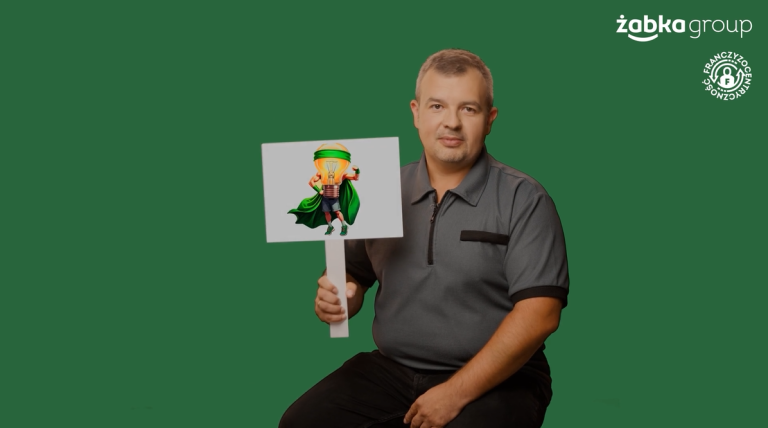
Competition powering positive change
Competition powering positive change
Every day, Żabka stores operate in the rhythm of thousands of repetitive actions which – although often unnoticed – have a real impact not only on the operational efficiency of our network, but also on the environment. In 2025, we once again proved that responsible energy management does not always require major investments, and that real savings can stem from everyday decisions made in each store.
In the refreshed edition of the “Battle for Energy” competition, franchisees from across Poland took on the challenge of improving the energy efficiency of their stores. The programme was designed to combine a competitive element with knowledge‑building and the development of habits related to responsible energy use. Participants had the chance to see that simple actions, carried out consistently, can generate noticeable benefits.
The practical implementation of the programme included a range of good practices that each franchisee could apply in their store. These included maintaining air conditioning temperatures within the 21-23°C range, ensuring doors remained closed on hot days, safeguarding proper airflow around refrigeration equipment, regularly cleaning ventilation grilles, and checking water heater settings. A crucial aspect was also monitoring the performance of refrigeration devices, where proper configuration and organisation helped reduce unnecessary energy consumption. An important role was played by data from energy‑use monitoring systems, enabling franchisees to track performance in Power BI reports and consciously manage equipment operations.
The edition carried out between May and September 2025 attracted significant interest. More than 3,300 franchisees completed the full cycle, and monthly targets were met a total of around 4,000 times. Altogether, the programme generated nearly 2 GWh of energy savings, equivalent to the annual energy demand of nearly 800 households. This confirms that even small changes, repeated across the entire network, can deliver measurable results. The most engaged participants received the main prizes – awarded to 105 franchisees – with the total prize budget reaching nearly one million PLN!
The “Battle for Energy” programme has also become an important tool supporting the delivery of climate goals outlined in our Responsibility Strategy and will become a regular feature in our calendar – the next edition has already been announced for 2026. The actions taken by franchisees directly contribute to reducing emissions within our network, supporting our climate commitments. It is these everyday good habits, implemented across thousands of stores, that are key to achieving shared success.
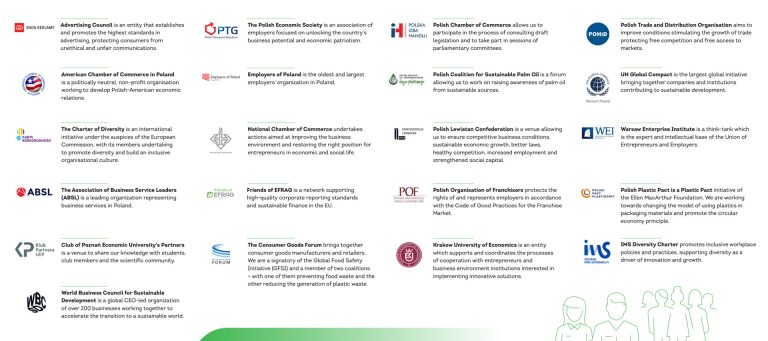
Partnerships for positive change
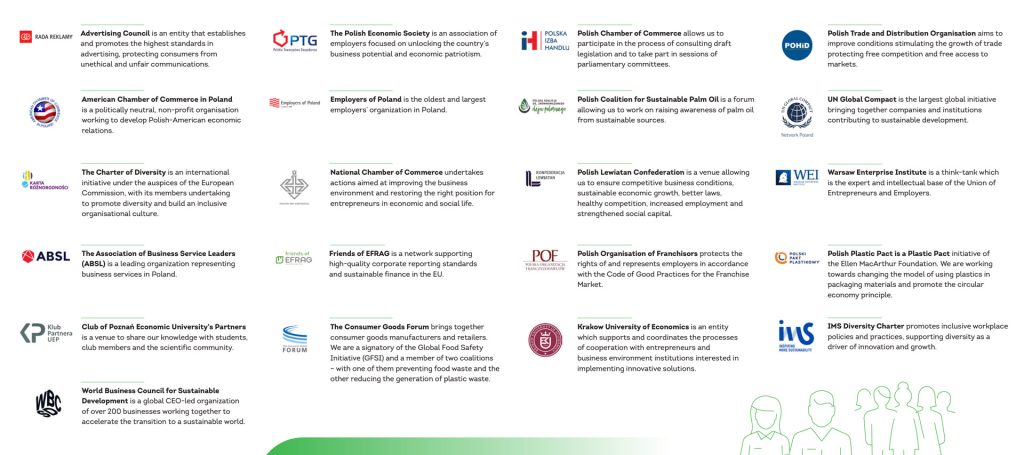
Partnerships for positive change
The Consumer Goods Forum (CGF), of which we are a contributing member, works to improve labor rights within the consumer goods industry, particularly focusing on eradicating forced labor. The organisation has established initiatives like the Human Rights Coalition (HRC) and Social Resolution on Forced Labour, alongside Priority Industry Principles, to guide members in respecting worker rights and eliminating forced labor from supply chains.
We are also actively engaged with IMS Luxembourg, reaffirming our commitment to creating an open, diverse, and supportive work environment – not only locally, but also internationally. As the Żabka Group, we recognize IMS Luxembourg’s activities as highly aligned with our unwavering commitment to advancing the ESG agenda within our organization and driving sustainable development across value chain. We are keen to engage in the exchange of expertise and best practices with other member organizations to enhance the effective implementation of our strategic ESG initiatives.
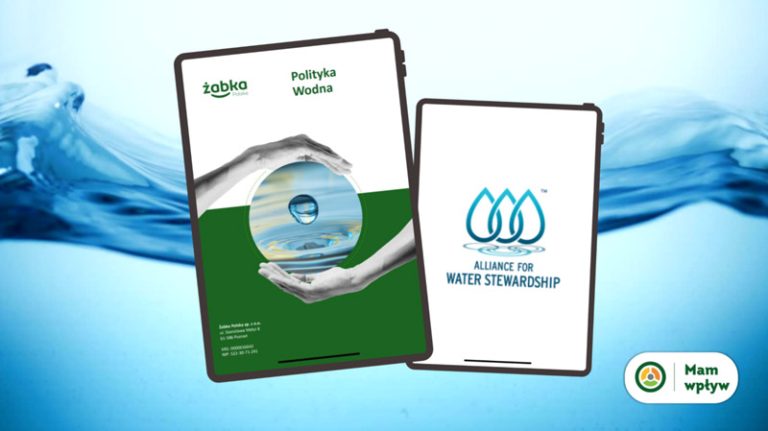
We have maintained AWS certification – another step towards responsible water stewardship
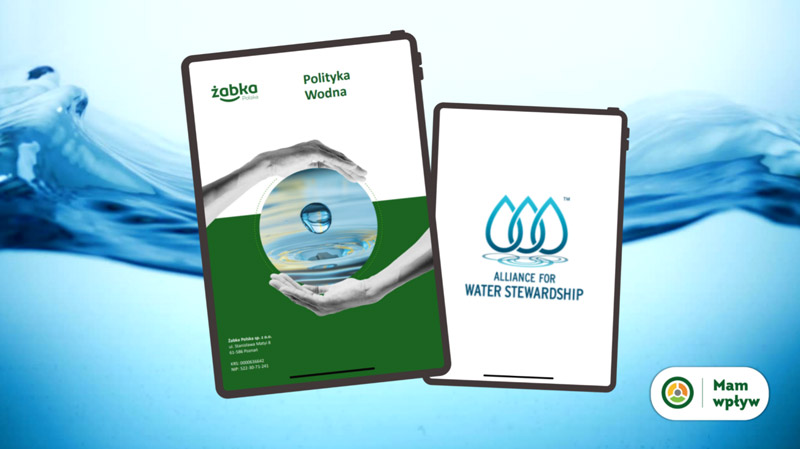
We have maintained AWS certification – another step towards responsible water stewardship
Żabka Polska has once again confirmed its commitment to protecting water resources by maintaining its Alliance for Water Stewardship (AWS) certification. This international standard promotes responsible water management, both within the company’s operations and in the catchments where it operates. Maintaining certification demonstrates our dedication and diligence in implementing our Responsibility Strategy.
In 2022, we introduced a Water Resources Policy within the company, one of the key objectives of which was to obtain AWS certification – a goal we achieved in 2024. This and other provisions of the Policy set the direction for improving the efficiency of warehouse processes, minimising impact on water resources, and educating employees on environmental protection. In November 2025, the AWS Surveillance II audit was carried out, covering the Logistics Centres in Plewiska and Komorniki as well as the Wirynka river catchment.
Over recent months, we have implemented a range of initiatives that show water responsibility is more than just words. In April 2025, employees joined forces with the Wielkopolski National Park (WNP) to plant 250 trees in the Wiry Protective Zone, supporting reforestation efforts. In June, workshops were held at the Plewiska Logistics Centre, led by experts from WNP and the Institute of Meteorology and Water Management, focusing on retention and water resource protection. During the summer, we organised a webinar for employees entitled “Everything Starts with Water”, which raised awareness of responsible water management. In 2025, we also replaced refrigeration equipment in our oldest warehouse, which has been in operation for many years – an important step towards improving energy efficiency and reducing emissions.
As Patrycja Aremke, Environmental Protection Team Manager at Żabka, emphasises: ‘Maintaining AWS certification is not just about meeting formal requirements; it is a confirmation of our consistent implementation of the Responsibility Strategy and Water Resources Policy. Thanks to projects such as tree planting, clean-up campaigns, and the installation of a water basket in Dziwnów, we not only meet certification requirements but also make a real impact on our surroundings.’

GS1 DataMatrix – The next generation barcode driving Żabka’s retail innovation

GS1 DataMatrix – The next generation barcode driving Żabka’s retail innovation
Żabka has long been a pioneer of new barcode technologies, delivering benefits that include ensuring product freshness at all times, supporting consumer safety, improving inventory management and delivering the product information customers look for.
In 2024 we took a significant step forward when we became the first Polish retailer to roll out the highly advanced GS1 DataMatrix, a cutting-edge two-dimensional barcode that resembles a QR code. Importantly, it achieves exceptional data capacity in a very small format to deliver significant advantages over its one-dimensional predecessors.
According to Marta Urbaniak, Żabka’s Director of Quality and Environmental Management, ‘This built on work we started as long ago as 2018, when we first worked with leading Slovak sandwich producer Pierre Baguette to introduce one-dimensional GS1 barcode technology.’
'That initial work led to immediate advances in terms of efficiency and inventory management, while bringing us an important source of continuous improvement that we’ve been focused on ever since. But it wasn’t perfect – for example, some of our shops and warehouses had problems scanning the barcodes, especially when package surfaces were curved.’
This highlighted the need for an even more advanced, more versatile barcode option that could hold more data. GS1 DataMatrix soon emerged as the ideal choice to investigate further.
The company has therefore been working particularly closely over the last two years on implementation, collaborating with Nowalijka – a leading Polish fruit, vegetable and ready meals company that provides Żabka with a range of fresh-food products. As a result, the two companies have successfully optimised the size of the barcode, making it compact enough to be used on small and curved fresh-food products.
‘We are naturally delighted to have created a more compact barcode option that meets global retail standards,’ Marta Urbaniak continues. ‘But it’s not all about compactness. Other benefits include improved restocking, reduced product unavailability, enhanced data synchronisation, better scanning accuracy and shelf-life management, and streamlined deliveries. It also means we know when to discount products and ensures nothing is sold after expiration – a key aspect of customer safety that also helps reduce food waste.’
Today, more than 12,000 Żabka stores have implemented GS1 DataMatrix, placing the company at the forefront of change. This is well ahead of the goals set for the global retail sector stipulating that all point-of-sale systems must be able to read and process 2D barcodes by the end of 2027.
Żabka’s work with Nowalijka has also been marked by an award at the KOD Innovation Conference, and the company continues to work closely with the GS1 Institute, meeting every quarter as part of the GS1 Working Group.
According to Marta Urbaniak ‘I am particularly pleased that we have now implemented GS1 with some 80% of our refrigerated private label suppliers, covering more than 120 own-brand products. Our focus is now on the next stage in developing this technology – in particular, testing GS1 DigitalLink codes, which will further improve customer communication by redirecting them to a website.’

Creating Fair Business with our business partners
Creating Fair Business with our business partners
At Żabka, we are highly aware that our extended footprint includes the operations of our suppliers as well as those of our own business. That is why we make every effort to collaborate with our business partners to create value together in a sustainable way, jointly taking care of the planet.
To help make this happen, we’ve developed and implemented a Code of Conduct for Business Partners that’s supported by numerous policies in which we set out the goals and priorities towards which we need to travel together.
We bring this to life through our ‘Fair Business’ platform, through which we use a dedicated website and other means to promote collaboration, joint initiatives and best practice.
As ESG Manager Malwina Frydrychowicz puts it, ‘We know that great collaboration is based not just on policies and expectations, but also on sharing knowledge and inspiring one another. That’s where our approach to Fair Business comes in, exchanging knowledge and ideas through the website, workshops and most recently through a newsletter that keeps everybody up-to-date with any updates to our policies and practices, as well as the latest live events and webinars. It’s an approach that’s helping us build strong relationships with our business partners while driving the most positive approach to sustainable development we can create together.’
Four core collaborative themes
Our Fair Business platform revolves around the four core collaborative themes on which we want to build our supplier relationships: ethical business, sustainable food system, circularity and decarbonisation. According to Malwina Frydrychowicz, ‘These themes also underlie our new programme of partner meetings, which kicked off in September 2024.’
This first meeting was centred on decarbonisation, with experts from suppliers including Microsoft, Carlsberg, Stock Spirits and Maspex sharing their experiences with the invited group. The next gathering took the form of a workshop. The discussion was dominated by the common challenge of collecting, reporting and sharing ESG data.
As Malwina Frydrychowicz puts it, ‘These developments give powerful support to some of the most important aims behind our Fair Business platform: namely, to inspire one another by sharing achievements, goals and best practice, building engagement through supporting each other in creating value in a sustainable way.’
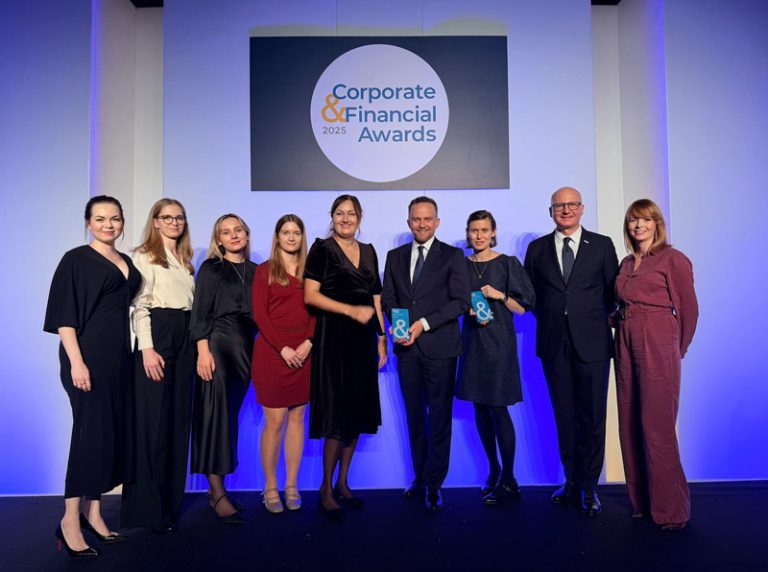
Żabka Group’s first annual report recognised in an international competition
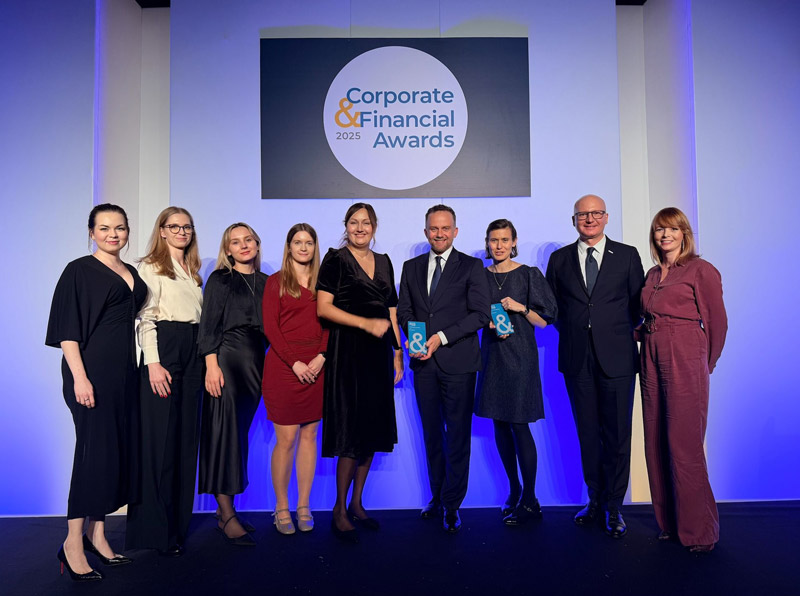
Żabka Group’s first annual report recognised in an international competition
Żabka Group earned acclaim in the 14th edition of the prestigious Corporate & Financial Awards, organised by the British magazine Communicate. For over a decade, this event has celebrated excellence, creativity, and innovation in corporate communications, highlighting organisations that set new standards in transparency and storytelling.
In 2024, Żabka Group made its stock market debut, and our very first annual report immediately ranked among the best worldwide. The jury awarded us silver in two categories: Best Printed Report – International and Best Printed CSR or ESG Report. The judges emphasised that the report told a coherent and bold story about growth ambitions while firmly building corporate identity in the eyes of investors. They praised the publication’s interactivity, value chain analysis, and the clear development pathway illustrated through engaging infographics. In the ESG category, the report was recognised for compliance with CSRD requirements, strong storytelling, beautiful design, and focus on key topics such as circular economy and decarbonisation. As one juror summed up: ‘Excellent report. Beautiful design with engaging, strong storytelling throughout. One of the standouts.’
Transparency is the cornerstone of building trust with our stakeholders. These awards demonstrate that it is possible to combine rigorous reporting with creative narrative that engages and inspires. This is just the beginning – we will continue to develop our reports so that they are not only compliant with regulations but also serve as a valuable and attractive source of knowledge for all audiences.
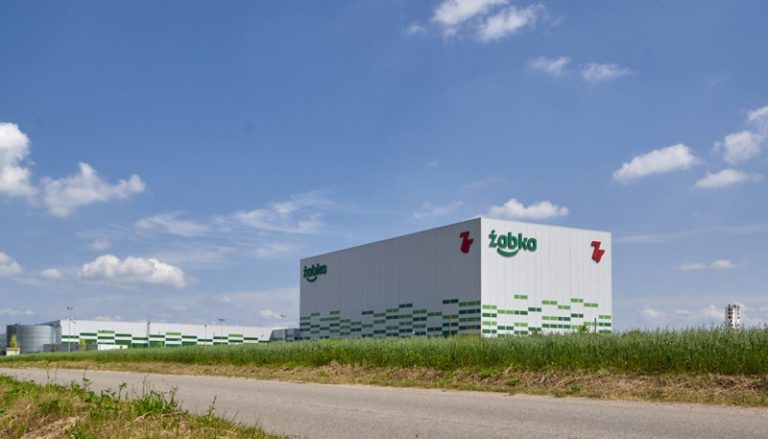
Radzymin Logistics Centre achieves BREEAM In-Use certification
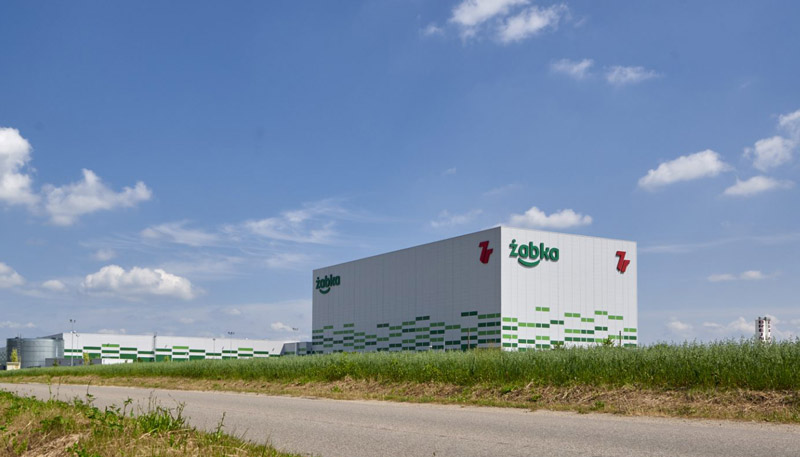
Radzymin Logistics Centre achieves BREEAM In-Use certification
For Żabka, sustainability is not just a slogan, it’s a genuine commitment. In our Responsibility Strategy, we strive to consider every aspect of the company’s operations, including a sustainable approach to our property portfolio. Our goal is to ensure that buildings are efficiently managed, user-friendly, and have a minimal environmental impact. Following the success of achieving BREEAM New Construction certification during the design and construction phase of the Radzymin Logistics Centre, we set ourselves another ambitious challenge: to confirm that we maintain the highest environmental and technological standards in day-to-day operations.
The BREEAM In-Use certificate is an international proof that a building is managed responsibly and in line with best practices. We wanted to demonstrate that our logistics centre was not only designed with environmental impact in mind but also operates in a way that minimises this impact while ensuring user comfort. It’s the natural ‘life cycle of a building’: from good design to equally good management.
From audit to success – behind the certification
BREEAM (Building Research Establishment Environmental Assessment Method) is an international system for assessing buildings in terms of their environmental impact, user comfort, and management efficiency. The In-Use variant applies to buildings already in operation and examines how they are used, maintained, and modernised on a daily basis.
The BREEAM In-Use certification process covers two key areas:
• Asset Performance – the physical characteristics of the building, its structure and installations.
• Building Management – management practices, procedures, maintenance, and monitoring.
The audit was thorough: it analysed HVAC system efficiency, energy and water consumption, waste management, impact on biodiversity, air quality, acoustics, safety, and even accessibility and user amenities. Additionally, BREEAM requirements include assessing physical risks related to climate change, transition risks towards a low-carbon economy, and social risks. This was not a one-off effort – to maintain and improve the building’s standards in the coming years, we will implement or sustain numerous initiatives, such as regular inspections of smart building management systems (BMS), water-saving programmes, waste segregation, and pro-environmental actions: green plantings to support biodiversity and air quality monitoring. Education and communication with employees also play a key role, as we aim to raise awareness that everyday actions have an environmental impact.
Benefits for everyone – from environment to business The result? The Radzymin Logistics Centre has achieved BREEAM In-Use certification at Excellent level – one of the most prestigious standards for sustainable buildings in the operational phase. This is not only confirmation that our Responsibility Strategy works in practice; the benefits of certification are multi-dimensional:
• Environmental – lower energy and water consumption, improved waste management.
• Business – reduced operating costs, enhanced working comfort, increased property value.
• Strategic – competitive advantage and tangible support for ESG goals, including emissions reduction.
As Łukasz Wierski, Żabka’s Technical Director, emphasises: ‘From the perspective of someone responsible for the technical area in our organisation, I particularly appreciate how demanding and developmental the BREEAM In-Use certification process is. It confirms that consistent technical decisions, operational oversight, and attention to building efficiency translate into real results. Certification strengthens the direction we are pursuing – modern, safe, and sustainable facilities prepared for future challenges.’
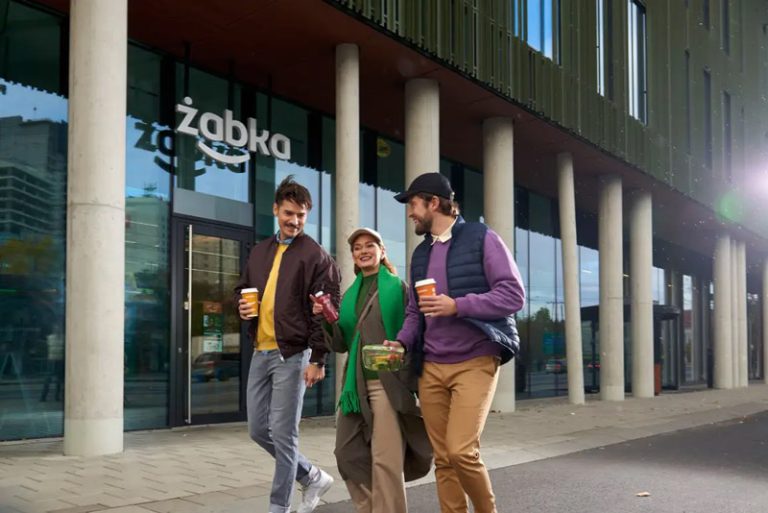
Zabka Group receives top AAA MSCI ESG Rating in first international assessment
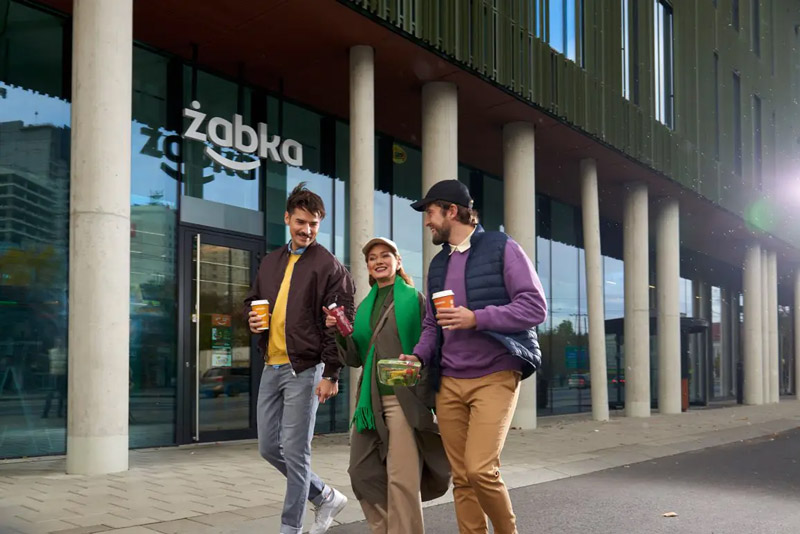
Zabka Group receives top AAA MSCI ESG Rating in first international assessment
For the first time, Zabka Group S.A. has been formally assessed under the global MSCI ESG Rating framework and has received the highest possible rating – AAA – placing the company among the top 10% of retail sector companies worldwide. This assessment follows Żabka’s inclusion in the MSCI Poland Standard Index and the MSCI Global Investable Market Index in March 2025.
The MSCI ESG Rating is one of the most widely recognised global benchmarks for assessing the maturity of environmental, social, and governance (ESG) performance, covering over 17,000 issuers worldwide.
MSCI indices serve as a crucial point of reference for international institutional investors. Żabka Group’s inclusion bolsters its visibility and investment appeal across global capital markets.
‘We regard the AAA rating from MSCI ESG as a clear mandate to further strengthen our ESG practices and scale solutions that deliver lasting value – commercially, socially and environmentally. Żabka’s inclusion in the MSCI indices marked an important step in our strategy to build long-term, sustainable value for all stakeholders.’ said Tomasz Blicharski, Group Chief Strategy & Development Officer.
‘ESG is a core pillar of our growth strategy, and we apply the same discipline to sustainability targets as we do to operational and financial objectives. The Group’s clearly articulated ESG agenda continues to gain recognition among international investors – as evidenced by the strong demand for our recent issuance of the sustainability-linked bond.’ said Marta Wrochna-Łastowska, CFO of Żabka Group.
The AAA rating reflects both the Group’s maturity in managing ESG risks and the strength of its implementation across governance, social and environmental areas.
What is the MSCI ESG Rating?
The MSCI ESG Rating, developed by global analytics firm MSCI Inc., is one of the most widely recognised and extensively used frameworks for assessing ESG risk exposure and organisational maturity. Its methodology examines both a company’s exposure to material ESG risks based on its business profile and its ability to manage those risks through appropriate policies, controls, and operational practices.
Ratings are assigned on a seven-point scale: CCC, B, BB, BBB, A, AA and AAA. The highest rating, AAA, is awarded to industry leaders who not only demonstrate robust ESG risk management but also implement innovative and enduring solutions that help set standards across the sector.
Further information on Żabka Group’s ESG initiatives can be found in the 2024 Annual Report.
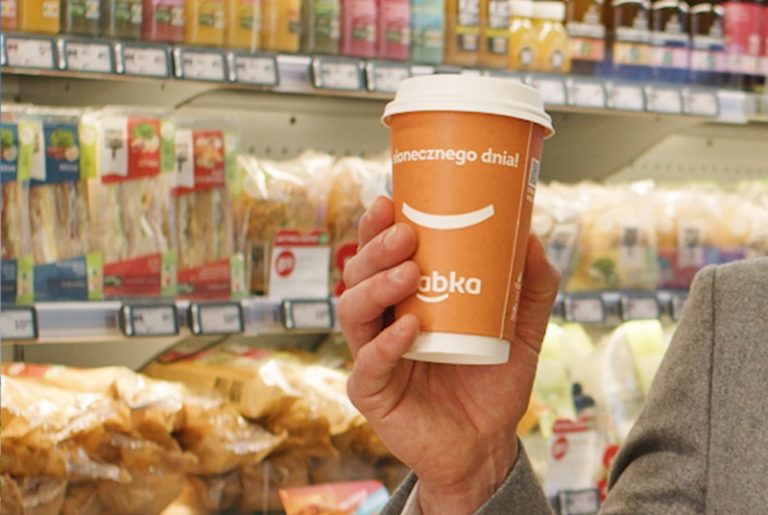
Working together to create innovation as part of Relooped
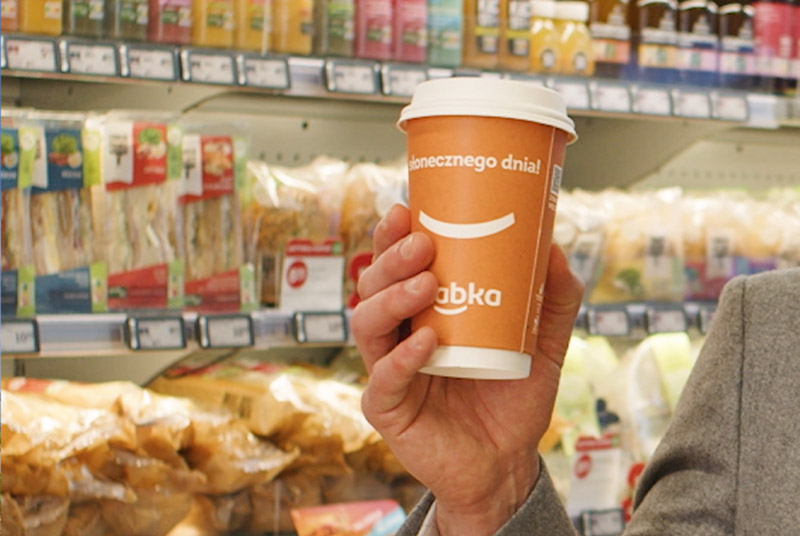
Working together to create innovation as part of Relooped
At Żabka, we are constantly looking for innovations and technologies that will allow us to create convenient and responsible solutions. For this reason, we are delighted to have joined a broad cooperation, involving not only commercial companies, but also scientific institutions. Our common goal is to develop innovative solutions that will serve both our customers and the planet.
As part of our commitment to the RETAIL RELOOPED project, managed by BOFA, we actively cooperate with partners from various sectors - from retail, through the waste industry, to science. We strive to create food packaging that will be not only functional but also environmentally friendly.
This international initiative, supported by funds from the Interreg South Baltic EU program, allows us to actively work on developing new, sustainable solutions. Thanks to the involvement of waste industry institutions, the world of science, but also retail chains, such as Żabka, it is possible to test innovative circular solutions on many levels, also with the active participation of users. As a supporting partner, we will engage our customers in testing innovative packaging in selected network stores, which serve as "living labs".
Our commitment to the RELOOPED project not only emphasizes our innovation, but above all, it is an expression of our responsibility - one of the main values of our company. This cooperation fits into the Żabka Responsibility Strategy, specifically into pillar 04 Green Planet, which assumes active action for sustainable development. We are proud to be part of this initiative, which contributes to building a sustainable future. We believe that through cooperation with other companies and scientific institutions, we can jointly develop solutions that will be good for both our customers and the planet.

Żabka Group: the second most-loved workplace on Planet Earth

Żabka Group: the second most-loved workplace on Planet Earth
Right across the world, there is only one workplace whose employees love it more than our people love Żabka Group. This is a key finding of a survey undertaken by Newsweek, one of the world’s most admired and respected media, in partnership with leadership development and research firm, the Best Practice Institute (BPI).
The Top 100 Global Most Loved Workplaces® 2024 brings together into a single list those companies across the world who score highest among their employees for placing respect, care and appreciation for their people at the heart of their business models. The ranking is based on the results of employee satisfaction surveys covering more than 2 million people working for companies with between 30 and 10,000+ employees.
In its write-up on the reasons for Żabka’s second place in last year’s listing, Newsweek stated: ‘Żabka Group believes that employee engagement drives company success, so there is a focus on keeping employees highly involved in decision-making and driving the future of the company. They've built a listening strategy around collaboration and idea sharing.’
One of the world’s best places to work…
Reflecting on the survey findings, Żabka Group Organisational Culture Manager, Judyta Pastuszka commented, ‘After six years of cooperation with the Gallup Institute on making our organisation one of the best places to work in the world, such a high position in the ranking fills us all with special pride. A place on the podium is a tribute to all of Żabka's employees, who create every day this most-loved workplace!’
This ‘silver medal’ builds on Żabka Group’s strong performance in the Gallup Exceptional Workplace Award 2024, when it was placed among the top 26% of the world’s companies in terms of creating and fostering an engaging workplace. As Judyta Pastuszka continued, ‘Our organisation is made up of people who want a role to play in shaping the world around them, and it’s this commitment that’s most clearly reflected not only in this result but also in our high position in the Polish and European convenience-store sector.’
‘Today and every day, we strive to build and strengthen a working environment that’s based on respect, collaboration and sharing experiences, meaning we can create innovations on an international scale.’
Commenting on the 2024 ranking, Newsweek Global Editor in Chief Nancy Cooper said: ‘As workplaces continue to shift, it’s clearer than ever that fostering collaboration, embracing a positive outlook, and aligning values are essential. The companies celebrated on the 2024 Global Most Loved Workplaces® list truly embody these principles. They show us that by championing respect and team-oriented outcomes, they’re not just building great workplaces, they’re shaping a brighter future for all.’

Żabka in collaboration with UNEP/GRID-Warsaw protects the waters of the Baltic Sea

Żabka in collaboration with UNEP/GRID-Warsaw protects the waters of the Baltic Sea
At Żabka, we are aware that biodiversity is one of the key elements ensuring optimal conditions for human functioning and economic activities. Biological diversity is our heritage, and its preservation is essential to ensure access to nature's wealth for future generations, which is why we are taking further steps to support its protection.
In order to act effectively in the field of biodiversity protection, we decided to join the Re:Generacja programme, which is UNEP/GRID-Warsaw's response as an affiliate centre of the United Nations Environment Programme to the UN's declaration of the years 2021-2030 as the Decade on Ecosystem Restoration.
As part of this collaboration, with the support of the Mare Foundation, in September 2024, we launched a sea bin funded by the Żabka Group in the port of Dziwnów, which will clean the waters of the Baltic Sea from litter over the next two years, thereby supporting the maintenance of the marine ecosystem's biodiversity. The installation of the bin allows for the removal of waste (including single-use plastics) from the port basin before it reaches the seabed, where it would decompose, polluting the waters and posing a threat to marine organisms. Reducing one of the sources of human-induced negative pressure on the marine ecosystem in this way not only positively impacts water cleanliness but also strengthens the resilience of the entire Baltic natural environment.
As Marta Urbaniak, Director of Quality and Environmental Management at Żabka, emphasises: ‘We are pleased that together with UNEP/GRID-Warsaw and the Mare Foundation, we can support efforts to protect the valuable Baltic Sea ecosystem for all of us. We hope that the installation of the sea bin in Dziwnów will increase ecological awareness about how to properly manage post-consumer waste and, on the other hand, highlight the importance of taking action against the current challenges related to the degradation of natural ecosystems.’
The 30-litre container is made from recycled polyethylene, making it highly resistant to damage and weather conditions. The bin can collect up to 1.4 tonnes of waste per year and does not pose a threat to marine organisms – the two-centimetre holes allow small fish and shrimp to freely swim in and out of it.
The goal of the Re:Generacja programme is to help restore degraded ecosystems, but also to protect those that are still in good condition. As part of the nationwide initiative, institutions related to nature conservation, as well as representatives of businesses, local governments, and local non-governmental organisations, are invited to cooperate.
More about the initiative link.

We limit food waste at Maczfit by supporting the Food Bank SOS in Warsaw

We limit food waste at Maczfit by supporting the Food Bank SOS in Warsaw
Every year, Poles throw away approximately 4.8 million tons of food products. At Żabka Group, we are aware of this challenge and place great importance on reducing food waste. Thanks to the good cooperation between Maczfit and Food Bank SOS in Warsaw, over 90 tons of products have already reached those in need.
During the daily preparation of meals for thousands of Poles, production surpluses are inevitable. At Maczfit, we decided to address this problem with a solution that combines a pro-ecological approach and support for those in need. Through cooperation with the Food Bank SOS in Warsaw, semi-finished products that are no longer used but are still good for consumption are delivered to five large aid centres.
At Maczfit, we established a permanent collaboration with the Food Bank SOS in Warsawin in August 2023. Over the course of a year, the company has donated over 90 tons of food worth approximately 889,000 PLN to the foundation. This initiative is significant considering that, according to the latest calculations by the Federation of Polish Food Banks, the products wasted by Poles could translate into about 12 billion meals.

Porcja DobreGO!: helping people to eat for intellect
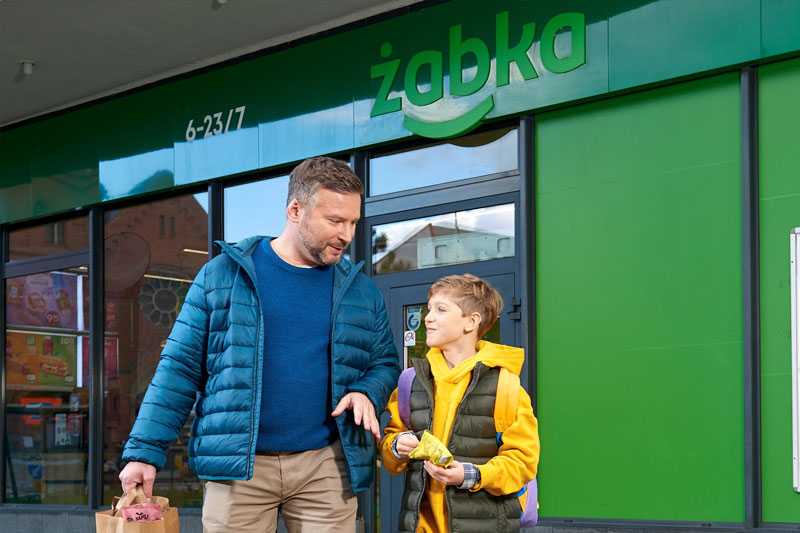
Porcja DobreGO!: helping people to eat for intellect
Everybody recognises that having a healthy diet is essential for having a healthy body. But this is only part of the story – the role of food in supporting a healthy brain and the strong memory, good concentration and clear thinking it enables is often overlooked.
That’s why Żabka Polska, in collaboration with a professional dietician, has created a 10-point summary explaining how key constituents of food are essential in getting the most out of our minds.
As Jakub Malec, Sustainable Food Manager comments, ‘From exams and work projects to public speaking and conceptual work, it’s the brain’s performance that does most to shape our futures – in education and at work. That’s why we’re using our range of nutritious and delicious Porcja DobreGO! (Portion of Good) products to educate consumers about the ingredients they should be looking out for that do most to stimulate an active, agile and high-performing brain.’
The 10 constituents of great brain food are:
- Carbohydrates: complex carbs like those found in bread, oats and pasta are an essential source of energy that supports the proper functioning of the brain’s cells
- Glucose: found in sources like dried fruits and chocolate, glucose speeds up thinking processes for better mental energy and agility
- Iron: as a carrier of oxygen, iron strengthens reasoning and learning abilities: it’s found in red meats, nuts, legumes, stone fruits (fresh and dried) and leafy vegetables
- Magnesium: along with calcium, magnesium is a great carrier of the neuromuscular impulses that are essential for muscular contraction: it also protects the brain against the damaging effects of heavy metals
- Phosphorous: as well as improving mood and vitality, phosphorous is important for a good memory; fish is an excellent source of this essential mineral
- Potassium: one of the most important minerals in the human body, potassium improves brain oxygenation. It’s found in many foods, from grapes and bananas to avocados and potatoes
- Protein: the foundation of every cell responsible for thinking, protein is found in plant-based foods like tofu, soy, grains and legumes as well as in meat
- Unsaturated fatty acids: found in fish and plant fats, these are essential to support concentration and prevent memory loss and apathy
- Vitamins: B vitamins in particular are central to the efficient functioning of the nervous system. Found in soy, wholegrain bread and meat, a deficiency can results in memory weakness, insomnia and difficulties with concentration
- Zinc: scientists have found a correlation between high levels of zinc and high levels of intelligence in children: zinc is found in pumpkin seeds as well as oysters and other seafood.
As Jakub Malec explains, ‘Żabka has designed its Porcja DobreGO! range to enable people to prepare for the mental challenges life throws at them. So it provides options for every meal – breakfast, lunch and supper, as well as mid-morning and mid-afternoon snacks – that deliver the nutrients everybody needs to rise to the demanding mental challenges we all come across every day.’

Taking action for a positive impact

Taking action for a positive impact
Launched in May 2024, Żabka’s ‘My Impact’ internal, educational campaign has not only made a significant contribution to employees’ awareness and understanding of the Responsibility Strategy that’s been integral to our wider business strategy for close to five years.
It has also encouraged them to participate in a wide range of activities that support implementation across its four central pillars: Sustainable Lifestyle, Mindful Business Impact, Responsible Organisation and Green Planet.
As Malwina Frydrychowicz, ESG Manager at Żabka, explains, ‘By implementing our Responsibility Strategy, Żabka as a whole and our employees within it can create value in economically, socially and environmentally sustainable ways that are soundly based on ESG principles. My Impact exists to make each employee aware that their work contributes to the Responsibility Strategy.’
Since My Impact’s launch, the company has engaged employees across its HQ, logistics centres and ‘Twoja Żabka’ intranet. Competitions were held based on the four pillars to attract attention and involvement, with attractive prizes at stake in the form of unique sweatshirts featuring prints of each pillar, for the winners to choose.
Gardening for good
Additional activities were also organised under each pillar to enable employees to actively support the Responsibility Strategy. Under Green Planet, for example, our people volunteered to clean the gardens of a social welfare home, while under Responsible Organisation we encouraged employees to compete to be recognised as the most bicycle-friendly company in Poznań.
When it came to Mindful Business Impact, employees helped to organise a picnic for children from two orphanages in Poznań, while under Sustainable Lifestyle they participated in workshops on how to prevent food waste.
In relation to sustainability, we aim to involve more than just our employees alone. Żabka’s over 9,000 franchisees also have a very strong role to play in implementing our Responsibility Strategy. As well as enabling them to read about their positive impact on delivering it in ‘Razem’ magazine, we’re focused on getting them directly involved through initiatives like our franchisee energy-saving challenge, our Naturally Together programme and the Żabka Entrepreneurship Academy.
‘My Impact’ expands its reach!
In 2025, we launched another edition of the campaign, in which – once again through competitions and webinars – we built awareness and engagement around our Responsibility Strategy. This year, however, was exceptional, as the campaign also reached our franchisees.
Through a series of articles published both in Razem Magazine and on the Razem Online platform, we showcased the various ways in which franchisees contribute to the implementation of our ESG strategy. To demonstrate that these activities are more than just theory, we invited our franchisees to feature in a series of short films, in which they spoke about their ambitious initiatives – including their involvement in the “Good Life” programme, the promotion of “Porcja DobreGO!”, and their efforts to prevent food waste in stores. All the videos are available here.
The end of 2025 also marked the launch of a special edition of the “My Impact” campaign aimed at all companies within the Żabka Group. As part of the campaign’s inauguration, a dedicated webinar was held for selected representatives of the companies, during which they could learn more about the principles of our ESG Framework and get to know the members of the ESG Strategy and ESG Reporting teams.

A positive impact on Polish healthcare

A positive impact on Polish healthcare
Żabka has been involved for most of its 25-year history in supporting the Great Orchestra of Christmas Charity (GOCC) Foundation, helping to raise money for paediatric and elderly care. Today, GOCC (WOŚP in Polish) is not only Poland’s largest non-governmental, non-profit charity organisation. According to research, it is also the country’s most trusted third sector organisation.
So we are very proud that Żabka is established as the charity’s largest supporter in terms of the people numbers involved in fund-raising – employees and franchisees alike. In fact, over the last year more than 10,000 of our stores displayed GOCC moneyboxes in support of the year’s theme, ‘Lungs after the pandemic’. In addition, not only could users of our mobile app donate Żapps to the Foundation; the app’s public-facing character, Żabu, was also our honorary volunteer for the year’s fundraising effort.
Fighting the impact of C19
As the theme’s name suggests, the primary focus for the year was on fighting the lingering effects of the C19 pandemic with a clear focus on buying equipment to support pulmonology wards. Countering the impact of C19. The topic was very close to our hearts, as from the very beginning of the outbreak of the pandemic, Żabka Group has been heavily involved in activities to increase the safety of its customers, franchisees and employees, as well as supporting Polish hospitals on a large scale in the fight against C19.
The charity’s effort for the year climaxed with the auction of 100 Gold Hearts, of which the heart imprinted with the number 1 is the most valuable, and it was this precious item that was auctioned by the Żabka Group. On Valentine’s Day 2024 GOCC founder Jurek Owsiak presented the award to Żabka Group Chief Executive Officer, Tomasz Suchański.
The auction raised PLN 1,050,000 for the charity. When added to the amounts raised through the stores, the mobile app and a separate donation made by Żabka,over PLN 2,500,000. In a meeting at the Foundation’s headquarters after the event, Jurek Owsiak summarised the equipment that could be bought with the amount raised by the auction alone: more than four specialised ultrasound machines, nearly three.
The auction was not only an important step towards improving Polish healthcare. It was also an immense privilege, the crowning achievement of our long-standing involvement with the charity – and a great way of highlighting our own 25th anniversary.

Running, jumping, peddling – how Żabka is a winning team

Running, jumping, peddling – how Żabka is a winning team
Everybody knows that regular exercise is essential for us all to be fit and healthy, making participation in sport an important way of supporting our physical and mental wellbeing. That’s why at Żabka Polska we believe in giving our employees every opportunity to get involved in a range of sports events.
In 2024 Żabka Sport Team took part in a series of public running events, including the global Wings for Life World Run. In this amazing event, all participants set off at the same moment, no matter where they are in the world. There is no finishing line: instead, at every site a driver sets off in a ‘Catcher Car’ 30 minutes after the start, overtaking runners and wheelchair athletes who drop out as they are passed.
Funding new treatments
All entry fees go to fund research into new treatments for spinal cord injuries, and with 200 entrants – including employees, franchisees and friends – we fielded one of the largest teams running in the Poznań event. And, by collectively running more than 1,400km, our team came 58th worldwide.
We were also a sponsor of the 16th running of the Poznań Half Marathon, providing provisions for 1,000 volunteers as well adding healthy snacks to children’s provisions and supplying fruit to help fuel the runners. We had 30 runners in the main event, as well as 30 children of our employees taking part in the Pho3nix Kids Run that was held in parallel with the main event.
More than 250 of our people also participated in the 2024 Poland Business Run, comprising 53 teams across eight events (in Poznań, Wrocław, Gdańsk, Gliwice, Radzymin, Zakopane, Romania and Greece). This was collectively the largest representation of any of the 1,700 companies who took part this year, all committed to raising money for people with mobility issues or who need support following a mastectomy.
Pedal power
Not all the events we supported during the year involved running. For example, we are now officially the Most Bike-Friendly Company in Poznań, following a competition sponsored by the city authority. Sixty of our employees took up the challenge and triumphed over more than 20 other Poznań-based companies to claim the title. We also came second in overall team classification in Poznań.
Finally, a team from our Logistics Centre in Radzymin came third out of 14 teams to win Bronze in the first-ever Charity Beach Volleyball Tournament. This was held in support of the Independent Robinsons Foundation, which works to empower young people at risk of social and professional exclusion.

Further extending our lead in advanced technologies

Further extending our lead in advanced technologies
We at Żabka are already leaders in the use of AI and other advanced technologies to streamline and strengthen multiple areas of our business. And now we have significantly expanded our long-standing partnership with Microsoft to stretch yet further our innovation lead in Central Eastern Europe’s retail sector.
Now, our focus is sharper than ever before on four key areas that are at the heart of our future development plans: store efficiency; international growth; internal transformation; and, above all, the use of data analytics to help us respond better than ever to customer needs.
AI: delivering significant competitive advantages
As a fundamental pillar of the company's strategic vision, digital transformation serves as a key driver across all these areas. In the field of AI, we maintain a significant competitive edge through the successful implementation of multiple solutions across the company's core processes. With Artificial we are reducing the time required to meet customer demands and equipping our franchisees with the tools to manage their businesses more efficiently. Most importantly, it enables us to optimize the product mix for each store by analysing historical and real-time sales data, ultimately allowing us to tailor our offerings to better align with customer needs.
Europe’s leading operator of autonomous stores
Over recent years, in fact, AI has already brought us a significant lead over almost every competitor as the enabling technology behind our unique network of autonomous Żabka Nano stores, where the most difficult thing a customer ever has to do is open a fridge door. Customers simply load their bags and leave, with payment being collected automatically. Having opened the first Nano in 2021, we are now Europe’s leading operator of autonomous stores, with a growing network that stands at 50 outlets at the time of writing.
Through our extended partnership with Microsoft, we have also become the first company in Poland to provide its 2,500 employees with the support of a digital assistant. This takes the form of Copilot which, when embedded in tools including Outlook, Excel, Word, PowerPoint and Teams, will free up our employees’ time by taking over many aspects of repetitive tasks such as drafting contact reports, preparing emails and daily or weekly activity planning. This will allow them to focus more thought and energy on creative tasks that add value, both to the business as a whole and to their individual career progression.

How Żabka is getting it done

How Żabka is getting it done
When we launched the ‘Get it done at Żabka’ (Załatw to w Żabce) campaign in June 2024, we made a binding commitment to ensuring we have a powerful positive impact on the sustainable choices of our customers.
We’ve done this by promoting a range of services available through more than 10,000 locations across Poland, promoted via an integrated multimedia online and offline publicity campaign that embraces TV and radio, internet and instore coverage, as well as promotion via the Żappka app.
According to Przemysław Tomaszewski, Head of Sales and Services Development at Żabka, ‘We’re unique in Poland in making multiple services available ‘just around the corner’, not only saving people time but also cutting out the need for unnecessary journeys with potentially damaging environmental impact. It’s a key part of our mission to simplify people’s lives – and it increasingly includes more than just our long-established services like dropping off parcels and topping up mobile phones, with innovative new solutions like high-quality smartphone and shoes repairs.’
Simplifying people’s lives
The full range includes the following services, some of which were available at discounted prices during the ‘Get it done at Żabka’ campaign:
- Smartphone repair, featuring two variants: either ‘authorised’, which uses original manufacturer parts to maintain the warranty, or the cheaper ‘non-authorised’ option using high-quality unbranded replacement parts. Customers can also rent a replacement phone during the repair period.
- The ability to buy and register a GSM starter, buy top-ups for a wide range of mobile contracts, and even settle Orange invoices simply by providing the phone number.
- Shoe cleaning and repair, promoting a second life for shoes via our unique partnership with woshwosh.
- Entertainment, including top-ups for a wide range of platforms including XBOX and Sony PlayStation consoles as well as platforms and services including Steam, Google Play, Netflix, Canal + Online and Spotify.
- Parcel pick-up and drop-off, including cash-on-delivery pick-up.
- Bill payment, including a faster barcode option.
- Cash deposit and withdrawal.
As Przemysław adds, ‘We’re always on the look-out for new services to offer via our stores as we seek to leverage the scale of our network for maximum convenience and the least possible environmental impact.’
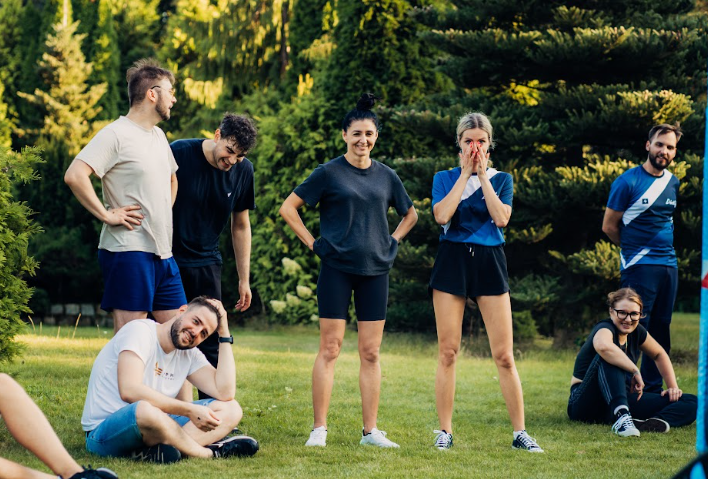
Building engagement for a better business – for everybody!

Building engagement for a better business – for everybody!
At Żabka Group, we have understood for many years that if you have an engaged team at every level of the business, you’re more than halfway towards achieving all the success you’re looking for.
That’s why we are so committed to doing everything necessary to create an all-embracing sense of community that empowers us all to work together towards shared goals. Even better when we can combine such activities with physical exercise that has a positive impact on our wellbeing. And most importantly, by acting together, we can make a positive contribution to the communities around us.
Winning by collecting kilometres
An excellent example of the kind of engagement-building initiative is the kilometre-collecting campaign run by the team from Dietly, our online service that helps customers find the very best solutions to their dietary needs.
In June 2024, more than half of the 100 Dietly team members started ‘collecting’ kilometres by walking, running and cycling. Every kilometre covered was then converted into money for the SYNAPSIS Foundation, a wonderful organisation dedicated to helping autistic children and adults and their families.
According to Dietly’s Head of HR Dorota Daniuk, ‘We are so proud of what we achieved, and so happy to have been able to help such a great cause. Almost incredibly, our amazing people covered a total of 10,000 km under their own steam, with 30 individuals covering more than 100km to win a commemorative Dietly T-shirt. One person really smashed it, breaking the 1,000 km mark!
This was a brilliant example of the kinds of initiative that not only do so much to help those in need – it also embodies one of our values - collaboration. I cannot overstate the importance of such an approach: it’s an essential part of what we do.’

Driven to create a cleaner future
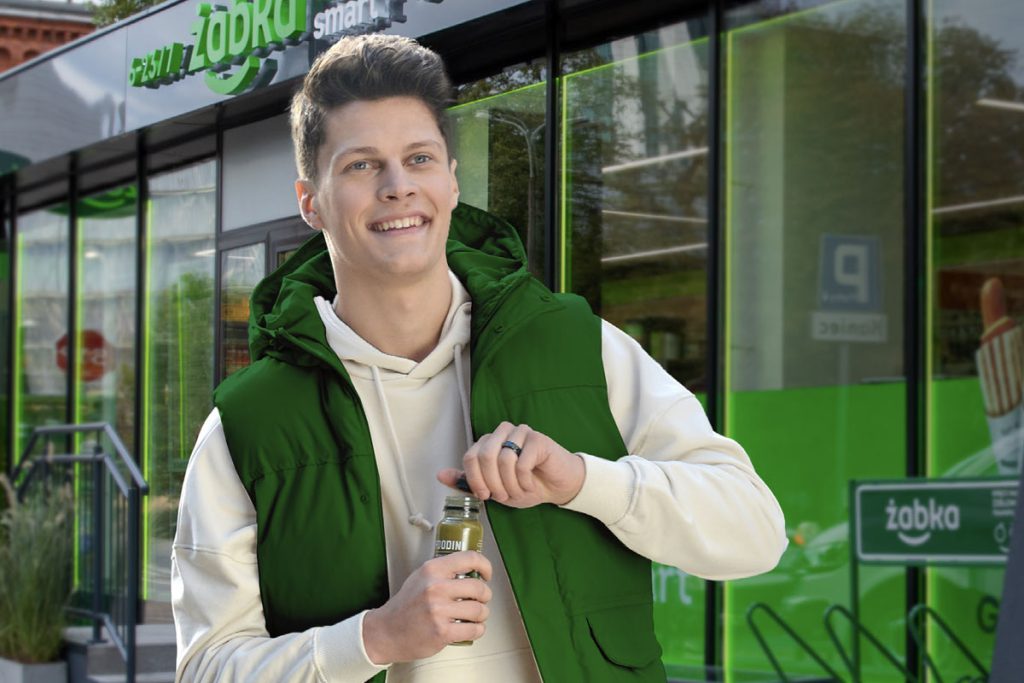
Driven to create a cleaner future
For an organisation of Żabka Group’s scale and scope, a continual focus on modernising and decarbonising the vehicle fleet is an essential aspect of minimising our environmental impact.
So during 2024 we made sure that we in no way slowed down our efforts to reduce our carbon footprint, maintaining the focus on own fleet of vehicles of our most mature unit - Żabka Polska. This involved continuing our electrification programme through the ongoing replacement of diesel and petrol-powered engines with battery-powered, plug-in hybrid and full-hybrid equivalents. As a result, by year-end our fleet contained no fewer than 30 EV, 900 full hybrid and 300 plug-in hybrid vehicles. Moreover, all our EV vehicles are driven by our 'Electromobility Ambassadors', a selected group of employees who, after undergoing special training, have been the first in the organisation to switch to electric cars. Their task is to promote electromobility and encourage other employees to low-emission vehicles.
That wasn’t all. We also installed more electric-vehicle chargers wherever they are most useful and accessible – at our logistics centres, our HQ and even at our employees’ homes.
In 2024 as well we introduced 'Podwózka', our dedicated carsharing app for employees. It enables our people to offer a lift to others when planning a business trip, so that they can travel in line with our Mobility Policy, having pleasant company and benefiting the environment. And we continued our exceptionally successful ‘Drive the Future’ programme, launched in 2023, which provides the insight into the driving styles and habits of our people that means we can help them drive more safely and with minimised environmental impact.
Competing to be the best
This highly effective initiative uses the Cartrack GPS module, first to analyse several aspects of driver behaviour and then to rank employees by their safety and efficiency performance. This has created genuine competition among our people to be the best, resulting in significant gains in the quality of driving across the organisation.
Of course, our work to create and operate a low-emission vehicle fleet is not limited to our largest subsidiary, Żabka Polska. Our Lite e-Commerce business exists to develop and operate our fast, express q-commerce grocery home-delivery service (operated via the Żabka Jush app) and e-commerce activities (available thru Żabka Jush app and our www.delio.com.pl website).
And it's our low carbon fleet that's worth mentioning, with all 82 scooters used by our delivery bikers now being electric. The fleet also contains 64 bicycles, ensuring that we can always make rapid local deliveries in the most environmentally-friendly way possible.
According to Joanna Kasowska, Żabka Group Quality Standards & Climate Protection Director ‘The hunt for continuous improvement is never over. We are constantly looking ahead, searching for new technologies, analysing their impact on the organization, people and the environment, in order to build a better business from both the cost and environmental perspective. It’s an essential focus area for our business.’

Why do we value equality and diversity at Żabka?
Why do we value equality and diversity at Żabka?
In the teams that make up our organisation, we value the ingenuity and fresh perspective that diversity of experience and skills brings. This allows us to meet the ambitious business challenges we set for ourselves. Our words are followed by specific actions. In 2021, we implemented an Equality Policy. Each year, we conduct an equality and inclusivity survey called the Inclusion Index. We ask people how they feel in the organisation in terms of gender, nationality, or length of service, which allows us to draw conclusions from what we have already done and plan even better actions for the future.
Our adopted pay policy ensures that everyone’s remuneration depends solely on their skills, achieved results, and impact on the organisation. As the first Polish company, in 2022, we obtained the Equal Salary certificate, confirming that our salaries are gender-neutral. We invest in education because without it we would not understand the directions in which we want to grow. Therefore, we give people the power to be part of this change.
Our actions are recognised worldwide. In the Diversity Leaders 2024 ranking published by the Financial Times, we ranked 21st, but that’s not all. We engage in various external initiatives such as the Diversity Charter and Target Gender Equity. We want to create a workplace where everyone feels good, uses their strengths, has the opportunity to grow and learn, and feels part of the team and the organisation. At Żabka, we believe that diversity is a force that drives our development and allows us to create better workplaces for everyone.

Smartphone repair: extending services ’just around the corner’

Smartphone repair: extending services ’just around the corner’
It’s an astonishing fact that every year around half of Poland’s 28 million smartphone users suffer damage to their phones, most often at home, at work or during other everyday activities. Research also shows that for 44% of those purchasing a new phone, the reason is a malfunction of their current device.
According to Przemysław Tomaszewski, Head of Sales and Services Development at Żabka, the impact of this extraordinary level of damage extends far beyond the inconvenience involved for owners. The environmental impact caused by the potentially massive levels of electronic waste involved is also very significant. As he says, ‘We’re talking 14 million handsets each year: if even a fraction of these is thrown away, that’s an enormous amount of waste, including rare minerals as well as potentially harmful components if disposed of in the wrong way.’
Comprehensive professional repair
This is one of the reasons behind Żabka’s decision to partner with Bolttech on offering a comprehensive professional repair service that covers more than 80% of smartphone models from seven leading brands. As Przemysław continues, ‘It’s part of our Responsibility Strategy that we should help our customers save time and take care of the environment: this new service does both at the same time.’
As part of Żabka’s Convenient Services package, the Bolttech partnership allows customers to book a repair via a dedicated website naprawa.zabka.pl, and then drop off their damaged phone ‘just around the corner’ at the nearest Żabka store. It’s then couriered directly to a Bolttech workshop.
Customers also get to make a choice between an ‘authorised’ repair using original manufacturer parts to protect the warranty, or the more cost-effective ‘unauthorised’ option which uses high-quality unbranded replacement parts. In either event, no work takes place without the customer accepting a cost estimate, and every repair is covered by a 90-day warranty. During the repair period, customers also have the option of renting a replacement phone based on popular refurbished models.
A valuable range extension
‘This is a really valuable extension to our range of Convenient Services, which already enables people to send items via any of our 10,000+ stores across Poland, as well as pay bills and withdraw money.’ Przemysław Tomaszewski adds.
Another of the more recent additions to our range of Convenient Services has been a partnership with woshwosh sp. z o.o., which enables people to drop off their shoes at our stores for professional repair or cleaning by professional cobblers. This not only makes life easy for customers and extends the lives of shoes – it also supports a fading craft.

An essential lifehack for health

An essential lifehack for health
Right across the world, October is recognised every year as Breast Cancer Awareness month, helping the one in eight women who will be diagnosed with the disease during their lifetimes to identify it as early as possible.
For when the disease is caught at its earliest stages, before it spreads to anywhere else in the body, the five-year relative survival rate stands at an amazing 99%. This means that preventative self-examination is widely recognised as one of the most important foundations for enabling millions of women to lead a long and healthy life.
It was to further emphasise the importance of this potentially life-saving practice that in October 2024 we at Żabka Group marked the global Breast Cancer Awareness Month with a special focus on the prevention, diagnosis and treatment of this terrible disease.
Promoting preventative self-examination
According to Zuzanna Dębowska, Lite e-Commerce Chief Commercial Officer ‘It made perfect sense for us to get involved in this area, especially given that one of the main focus areas of our ESG Framework is Sustainable Lifestyle. Under this, we promote healthy living, so highlighting the importance of regular preventative self-examination and medical check-ups was an obvious next step for us to take.’
To make it happen, Group subsidiary Lite e-Commerce – which is responsible for our grocery delivery and e-commerce services – partnered with the Warsaw-based Dickery bakery.
We have teamed up to support the Rak’n’Roll Foundation, created in 2009 by Magda Prokopowicz, who following her own diagnosis at 27 wanted to break taboos around cancer and spread positive energy. To raise funds for this excellent cause, users of the Żabka Jush app in Warsaw and Krakow could from 25-27 October buy for PLN 21.99 a limited edition of ‘Boobies’ waffles – treats reminding people of breast self-examination.
All proceeds from sales were donated to the Rak’n’Roll Foundation, amounting to a total of PLN 35,000. As Zuzanna comments, ‘This is just the sort of project that we believe we should be involved in – targeting a great cause with funds that can directly help cancer sufferers, while encouraging others to check themselves more regularly. I’d also like to thank the Dickery bakery for a great cooperation.’

Our social impact at Maczfit

Our social impact at Maczfit
Our several-year-long collaboration with the Food Bank, during which we provide our meals to those in need, has become part of our DNA. In 2024 alone, the organization received over 85 tons of food worth more than 820,000 PLN.
However, we do not stop there. In addition to supporting local communities, we also engage in activities for charitable institutions that provide other types of assistance, and we respond to crisis situations.
One such event was the flood that hit southern Poland in 2024. Continuous rains for several days caused river levels to rise to unprecedented values, destroying hundreds of homes. Knowing how difficult the situation was for many residents of the affected areas, we provided a total of 2,233 meals for both the victims and the rescue services. In cooperation with the Polish Red Cross, we delivered 1,200 meals to the Fire Brigade and volunteers in the flooded areas, and 333 meals to the residents of Nysa. We also supported Food Banks in relief efforts in Lower Silesia.
At the same time, last year we continued our cooperation with the Herosi Foundation, supporting children with cancer. In 2024, we donated 40,000 PLN to the organization as part of the ‘Pomoc na Cały Rak’ campaign and organized a special Christmas event, fulfilling 12 wishes of young beneficiaries – they received, among other things, a projector, a keyboard, a home trampoline, a Lego set, and a ball pit. As many as 50 Maczfit employees participated in the initiative, proving that not only can we unite for a good cause, but we also form a team of people sensitive to those in need.

Lifelong learning – better business, happier lives

Lifelong learning – better business, happier lives
Since its launch in 2023, more than 250 Żabka franchisees have completed the special training for franchise partners that we provide through our Entrepreneurship Academy, and close to 2,500 franchisees have attended additional courses on the platform.
Delivered in partnership with the Warsaw University of Technology Faculty of Management and Monika Ferreira, Founding Partner in the strategic consultancy practice I'GS In Good Strategy, the programme today is an essential part of the training we provide for our franchisees, bringing them all the expertise they need across multiple disciplines to make a success of their businesses.
Following the success of its first year, at the beginning of 2024 we made it a mandatory part of the induction process for new people launching a business under the Żabka brand. And, according to Żabka Polska’s Senior Business Development Manager Przemysław Stochaj, we’re continuing to develop it progressively, feeding into an ever-stronger commitment to lifelong learning.
Fast-changing environment
‘It’s increasingly about far more than the mandatory training every new franchisee goes through,’ he explains. ‘We aim to give everybody the ongoing education they need to run a successful business in a fast-changing environment, which means giving them access to the tools and initiatives needed to help them continuously improve their education and develop themselves.’
It’s about more than just about growing business skills, although this is particularly important in an environment of rapid socio-economic change when factors like artificial intelligence are causing seismic shifts in the competitive and business landscape.
‘It’s also about helping people maintain and improve their mental fitness, intellectual development and interpersonal skills,’ continues Przemysław. ‘These are some of the reasons why lifelong learning is promoted so strongly in EU countries, where millions of people continue to expand their knowledge and acquire new capabilities after they’ve completed their formal education.’
Figures from Eurostat go to show that the percentage of people aged 25 to 64 participating in formal training courses stands at close to 12% in the EU, compared with just 7.6% in Poland.
‘We see our approach as being about more than just learning about how to run the best possible business,’ continues Przemysław. ‘It’s also about helping to develop happier, more fulfilled people. That’s one of the key reasons why we’re so keen to increase the proportion of Polish adults participating in lifelong learning.’

Contributing to comprehensive research on approach to climate change

Contributing to comprehensive research on approach to climate change
Żabka Group is one of the main patrons of the fourth edition Humans Attack!, a study by Lata Dwudzieste agency and Kantar Polska into the attitudes Polish people have to the essential issue of climate change.
The report's first edition, published in 2019, aligned with Fridays for Future movement, where ordinary people, many of them young enough still to be school or college students, protested to demand action to protect the climate and prevent global temperatures from rising by more than 1.5ᵒC. The attitudes stemming from this action were also reflected in the 2020 edition, which showed that 78% of respondents were afraid of the impact of climate change.
By contrast, the most recent research shows a decline in this figure to 63% – still a significant proportion of those questioned, but a major decline nonetheless. As the report asks, ‘Have five waves of pandemics, the outbreak of war abroad and the energy crisis blinded Poles to the problems of the Earth?’
Keeping climate change in the public eye
At Żabka, in line with our commitment to decarbonisation, a circular economy and sustainable value creation, we are engaged to the study of attitudes and the impact of climate change on society.
Writing an article in the report called Sustainable shopping – time to bin bad habits, our Sustainability Director, Rafał Rudzki analysed which solutions of Żabka ecosystem foster the abandonment of people's bad grocery shopping habits. According to Rafał, the cooperation on the ‘Humans Attack!’ report fits perfectly with the activities undertaken by the Group: ’The Żabka Group promotes a sustainable lifestyle and makes it easier to follow every day. We study trends, share knowledge, and implement responsible solutions. Supporting this initiative fosters public debate and long-term, sustainable economic and social development with care for the environment.’
Also in the report, in an article called How food selection criteria are changing with the increased awareness of climate change, our Brand & Innovation Director, Jan Kisielewski analyses how consumers act in the face of increasing threats connected to global warming.
As Jan emphasis: ‘In building an effective pro-consumer strategy, tracking trends is crucial for us, which is why the decision to patronise the 'Humans Attack!' research was obvious. This collaboration gives us a broad perspective on the approach of Poles to climate change issues and their readiness to adapt their lifestyle and consumption. We are proud to support research in such an important area today to more effectively help our customers change their daily habits for the better.’

Together with business partners for sustainable development - fair business brunch

Together with business partners for sustainable development - fair business brunch
Effective development of cooperation with our business partners is possible through sharing knowledge and mutual inspiration. That is why we organized the first fair business brunch – a meeting within the fair business platform – thus creating a space for exchanging best practices and discussing common challenges in a select group of our business partners.
In the context of decarbonisation, cooperation is of exceptional importance, especially when it comes to reducing Scope 3 emissions. At Żabka, besides aiming to reduce greenhouse gas emission intensity in stores by 70% in Scope 3 (base year 2020), we also strive to involve our business partners in the fight against climate change. We want to engage 75% of them in setting scientifically validated decarbonisation targets. Therefore, we asked experts from the companies we collaborate with daily and Żabka representatives to present best practices and inspirations in the field of decarbonisation. Representatives from Microsoft, Carlsberg, Stock Spirits, and Maspex shared their experiences with the invited group.
The meeting focused on decarbonisation, but issues of ethical and sustainable supply chains also accompanied the discussions. In this context, particular attention was paid to the Code of Conduct for Żabka Polska Business Partners and the Human Rights Policy for Business Partners. We aim for 100% compliance of our partners with the first of these documents by 2026. To achieve this ambitious goal, we offer our suppliers substantive support and recommend that they undergo ethical audits. By aligning with our Code of Conduct, we can ensure that our partners also create value sustainably and with care for the planet.
We believe that developing further cooperation and joining forces with our partners will allow us to create a fair business together!

Becoming a leader among Europe’s most inclusive companies

Becoming a leader among Europe’s most inclusive companies
Żabka is officially one of Europe’s most engaging companies. And, according to the Manager for Corporate Culture, Judyta Pastuszka, now it has also been recognised as one of the most inclusive.
‘We feature in the top third of the list of 850 companies that made it on to the Diversity Leaders 2024 ranking by the Financial Times and Statista, which involved a survey of more than 100,000 employees across 16 European countries’ she says. ‘And of the 19 Polish companies that made the list, we ranked fourth – comfortably inside the top 25%.’
An inclusive culture
This builds on the company’s achievement of becoming the first in Poland to obtain Equal-Salary certification that proves that we support and practice equal pay in the workplace. As Paweł Brzóskowski, Rewards Manager emphasis ‘Diversity and having an inclusive organisational culture are key strategic areas for us at Żabka, meaning our daily decisions are guided by an approach to equality that’s based on objective, fair and unbiased evaluation.’
This extends far beyond gender alone. ‘We have an ongoing commitment to ensuring that everybody feels respected and appreciated, regardless of their age, gender, family situation or economic stats,’ Paweł adds. ‘To make this happen, we operate a wide-ranging programme of courses and events, including quality-inclusive training for all employees, anti-discrimination webinars, and inclusive leadership training for male and female leaders.’
Increasing everybody’s potential
The company is also involved in several external initiatives, including the Diversity Charter – an initiative of Responsible Business Forum that we engaged to by committing to put in place equal treatment policy and diversity management, as well as proactively preventing discrimination and harassment in the workplace – and Target Gender Equity – programme to support the development of gender equality targets and action plans. As Judyta Pastuszka explains, ‘All these efforts are aimed at creating and sustaining an organisational culture that recognises and increases everybody’s potential, all while building an environment that’s based on collaboration and shared experience.’
This is a great honour to be included in Diversity Leaders 2024, but we are aware that there is still room for improvement. As Judyta adds, ‘Now we have a challenge to move further up the table in 2025 and during the years ahead: that’s in line with our determination to continue improving yet further in every aspect of diversity leadership.’

How Franchise Ambassadors are driving the best possible results

How ‘Franchise Ambassadors’ are driving the best possible results
Right at the beginning of 2024, Żabka launched a unique new project designed to help people who are considering setting up their own businesses gain privileged insights into the challenges and opportunities they should consider before making a firm decision about their future careers.
Called project ‘Franchise Ambassador’, this has involved 50 of the company’s 8,600 franchisees being carefully selected on the grounds of their different ages and experience of life and work. Now, they are bringing the benefits of their own learning to many thousands of potential entrepreneurs through business events, face-to-face contact, social media channels and a series of regular podcasts hosted by well-known journalist and businessman, Jarosław Kuźniar.
Promoting business and entrepreneurship
At Żabka we’ve always been committed to supporting programmes that promote education in business and entrepreneurship, and this does so in two ways. First, it engages our own franchisees in wider activities in local communities. And second, it brings people, considering building a business with us, the opportunity to make a decision based on first-hand experience.
It was very important to choose ambassadors who reflect the diverse backgrounds of our franchisees. Our ambassadors represent a variety of life and work experiences, coming from big cities, small towns, and even from abroad. Żabka supports the education of ambassadors through regular, dedicated training sessions specifically designed for them and helps them build their personal brands.
According to Żabka Polska’s Chief Operating Officer Przemysław Kijewski, ‘The selected entrepreneurs identify with the values of our business model and want to co-create a credible image for the franchise. They have an in-depth knowledge of all aspects of the cooperation and are aware of the support we offer and the difficulties that may arise in running a business under our banner. Honesty and truthfulness are their greatest advantage.’
Recipes for success
A key part of the initiative has been a series of interviews with Franchise Ambassadors on Żabka’s YouTube channel (Żabka Biznes) and a range of podcast apps including www.zabka.pl/podcasty. During these, Jarosław Kuźniar covered many issues with the interviewees, including the challenges they have overcome, their breakthrough moments and their recipes for success.
As Przemysław Kijewski comments, ‘The common denominator of all the talks is the drive of our franchisees to achieve the best possible results and the desire for continuous development. By listening to the conversation, the audience will be able to better understand the franchise model, get to know the people who decided to open their own business and the emotions accompanying them in their daily duties as a franchisee’.

Award marks our commitment to communities and the environment

Award marks our commitment to communities and the environment
The Polish Economic Society has presented Żabka Group with its highly respected Azymuth PTG award for Social Engagement, recognising our systematic and effective work for the thousands of local communities where our stores operate as well as our sustainable, environmentally-aware business practices.
The award was received on 3 February 2024 at the Society’s Entrepreneurs’ Ball by our Head of Franchisee Development & Support, Damian Rybak. He commented: ‘This is a genuine cause of satisfaction for us at Żabka Group, as it recognises the effectiveness of the Social Engagement Strategy at the heart of our business that supports five of the UN Sustainable Development Goals: Good Health and Wellbeing, Sustainable Cites & Communities, Quality Education, Decent Work and Economic Growth and Reduced Inequalities.’
Three pillars: Wellbeing, Neighbourhood and Equal Opportunities
The strategy is based on three central pillars, the first of which – ‘Wellbeing’ – popularises a healthy lifestyle through the organisation of sports initiatives and encouraging physical activity among employees. Under the ‘Neighbourhood’ pillar, employees can dedicate up to eight hours of working time each month to a range of company-recommended volunteering opportunities, or to local initiatives they find and support on their own. And the third ‘Equal Opportunities’ pillar supports programmes including Good Internship at Żabka and the Żabka Scholarship Programme.
Significant business success
The Social Engagement award was for one of the seven categories recognised under the Azymuth PTG scheme. According to Damian Rybak, ‘In their document explaining why the Polish Economic Society selected us for their Social Engagement award, they stated: “Żabka has not only achieved significant and visible business success but has also demonstrated an exceptional and sustained commitment to supporting the community and activities for the general good”. That makes us very proud.’
Specific reasons cited for the Society’s decision included Żabka Group’s focus on minimising negative impact on nature, commitment to enabling employees to participate in social activities and desire to create a working environment based on social values.

Driving the future
Driving the future
Żabka is active on many fronts in pursuing our key priority of reducing fleet emissions. As well as now having 900 full-hybrid and 300 plug-in hybrid vehicles in our fleet, we aim to replace a further 200+ cars over the next two years and are building a charging infrastructure across our main sites and many employee homes.
Changing driver behaviour is another focus, and initiatives underway include our ‘Electromobility Ambassadors’ and ‘Drive the Future’ programmes. Drive the Future is all about enabling our people to drive more safely and with minimised environmental impact by gaining insight into their driving styles.
The programme uses the Cartrack GPS module to analyse the average fuel consumption, speed and driving dynamics of different drivers, to see whether their style is safe, acceptable or unacceptable.
It also enables people to see where they rank alongside their colleagues. It’s creating real positive change: not only are attractive prizes and the title of ‘Eco-Driving Champion’ up for grabs. It also makes our people compete to be the best – and that’s making a real difference.

Preventing biodiversity loss

Preventing biodiversity loss (2023)
To ensure access to nature’s resources for future generations, we must preserve biodiversity, which is our heritage. To actively participate in the pursuit of the goals set out in the global forum, we implemented a Biodiversity Policy in 2023. The Policy sets out the general principles of conduct for the protection of biodiversity, and also indicates the main directions of activities in this area, aimed at ensuring the protection of ecosystems and preventing the loss of biodiversity including counteracting deforestation. The policy applies to both Żabka Polska and its franchisees, as well as the suppliers of own brands.
Our commitments have led us to take a closer look at our supply chain. Starting in 2023, we now only accept branded products with certified palm oil, further contributing to the preservation of rainforests and wildlife habitats. We have taken steps to improve animal welfare and promote sustainable sourcing in our own-brand products. We have removed cage-laid eggs from our offerings and implemented policies to regulate the commodities used in our products, ensuring sustainable sourcing for plant ingredients, fish and seafood.

Franchisees at work in their own communities

Franchisees at work in their own communities
At Żabka , we are extremely proud of the many franchisees across our store network who find time away from the demanding occupation of running a shop to run charitable campaigns in the local communities.
We actively encourage our franchisees to get involved in efforts to help the most vulnerable members of their communities, but so many go far beyond any call of duty to make a real positive difference. It’s incredibly moving to hear some of the stories of amazing generosity and commitment that genuinely help people live richer, healthier and happier lives.
A shining example
One shining example is franchisee Artur Hasiński, based in Poznań, whose experience of personal tragedy has inspired him to help people suffering from oncological problems though his ‘Mam tę moc’ (‘I have the power’) Foundation. The foundation also supports educational, social and sports organisations, with a special focus on young athletes with talent but no means to develop it. In addition to all this, Artur has also become qualified as an addiction specialist, and now helps people who are struggling with alcoholism and other forms of addiction.
Many other examples are evident right across the store network, including a group of franchisees in Pabianice who for more than two years have been holding collections and auctions to support a girl with a long-term illness. In one recent event for her, they put up hot dogs for auction at a motorcycle picnic, with one selling for 100 PLN. To date, more than a third of the 3m PLN needed for her treatment has already been raised.
Helping families in need
Continuing the hot dog theme, a franchisee opening a new store in Mieścisko awarded 50 free hot dogs to the local football club, while several others from Chełm collaborated to donate free products to 50 local families in the greatest need.
Another example is Szlachetna Paczka (‘Noble Parcel’), an initiative carried out since 2001 in which franchisees running 12 stores across Żyrardów, Skierniewice, Parzniew and Kuklówka Radziejowicka help families in need. They also give customers the opportunity to help in any way they can. This sort of work is incredibly important in local communities. The many, many franchisees contributing to happier communities in this way are not only expressing the spirit of Żabka: they’re also an essential part of our continuing evolution together.

Ecosystem convenience
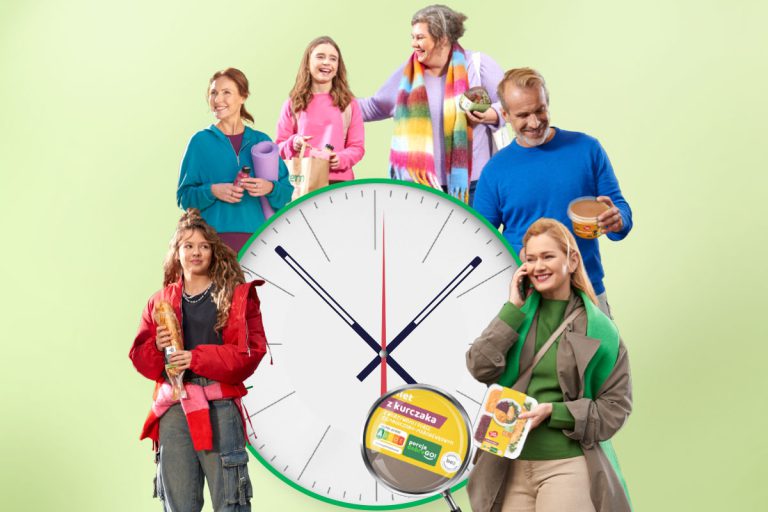
Helping to transform the nutrition landscape

Helping to transform the nutrition landscape
With Żabka research, carried out in 2020, showing that nearly 70% of Polish adults regularly buy ready-to-eat meals, we feel highly responsible for the quality of the diets consumed by the families of the 3 million people who shop in our stores every day.
This is what lay behind the Porcja DobreGO! nutrition programme, and the Spróbuj DobreGO! campaign, launched in early July 2023 and designed to help those customers with time and lifestyle constraints that can restrict their ability to make the right food choices for their health and the environment.
The overall programme was carefully designed to show consumers that healthy composition is not incompatible with delicious flavours. With the aim of meeting multiple different taste preferences and lifestyle needs across our private-label range – including Plant Hunter, Szamamm, Tomcio Paluch and Dobra Karma – it not only marked those foods with a high A or B Nutri-Score rating with a special Porcja DobreGO! label. It also provided users of the Żappka mobile app with a discount of more than 25% on those selected products.
This unique initiative not only ensured that shoppers had ever-better access instore to well-balanced ready-made meals and snacks, created under the guidance of a professional nutritionist, as we observed an 85% increase in sales of products with Nutri-Score A&B after launching the Spróbuj DobreGO! campaing. It also provided younger consumers with the opportunity to learn about healthy and balanced eating through playing the game Żabka Run: Porcja DobreGO! on the global online Roblox platform.
This first season of the game used innovation to encourage a lifelong healthy approach to food by teaching players how to use the Nutri-Score system in their everyday shopping and so understand the nutritional profile of ready meals.
Co-created with the Game Changer agency, and with influencers selected by BeLoud, the game required players who hit obstacles while playing to answer a question on good nutrition before they could start playing again. It also featured a futuristic version of a Żabka store as part of an environment in which players use jet backpacks to move, avoiding obstacles and buying items to make their gameplay easier.
According to Anna Grabowska, EVP, Managing Directorof Żabka International at Żabka Group, ‘Initiatives like the Porcja DobreGO! programme are designed to make life easier for our customers while restricting our negative impact on the environment. We are on the verge of a global nutritional transformation, and Żabka always aims to be where the needs of consumers are.’
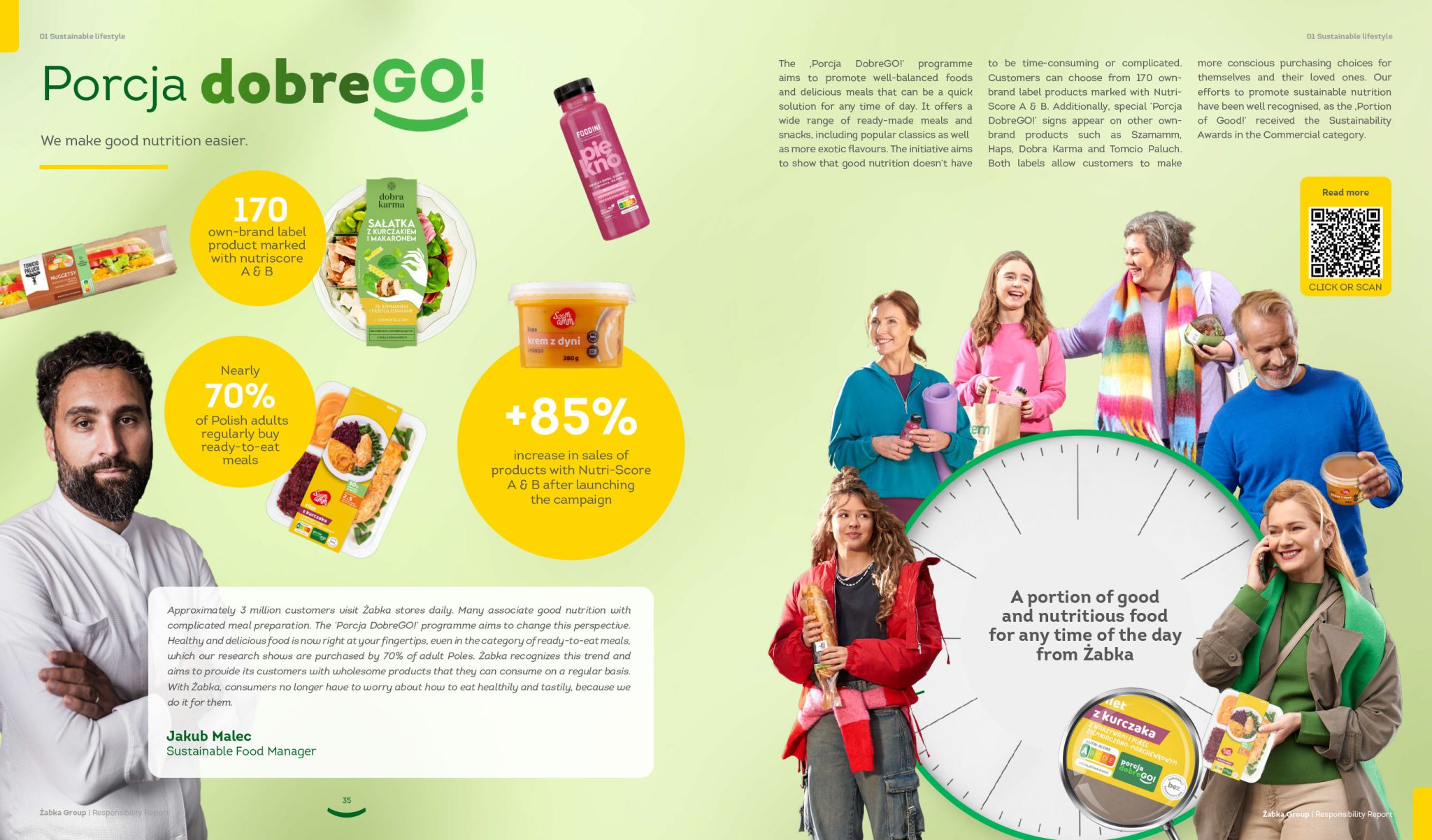

Good Internship in Żabka address social-exclusion risks for young people

Good Internship in Żabka address social-exclusion risks for young people
We have now operated the ‘Good Internship in Żabka’ programme for seven years, running it in partnership with the Independent Robinsons Foundation to help young people at risk of social exclusion gain professional experience through paid internships at our stores. The programme takes a strategic approach based on Social Engagement Strategy and supports the implementation of 5 of the UN SDGs.
Today, the numbers of people the programme has helped are impressive: our 280 participants have clocked up more than 220,000 hours between them in internships lasting between two weeks and three months.
A better quality of life
According to Katarzyna Przewęzikowska, Manager of the External Relations and CSR Team at Żabka Polska, ‘As part of our Social Involvement Strategy, we take part in many actions aimed at ensuring a better quality of life for local communities, including equalizing opportunities in the labor market. Thanks to the ‘Good Internship in Żabka’ program, young people at risk of social exclusion have a chance to gain their first professional experience. Our mentors – franchisees are eager to get involved in this program, sharing their knowledge and skills with interns’
In the programme, we provide training to those franchisees who want to get involved as mentors, enabling them to share their knowledge and skills with our interns. Each internship is supervised by a representative from the Independent Robinsons Foundation, ensuring the positive and supportive environment.
Preparing for employment
As Anna Żelazowska-Kosiorek, Leader of programs implemented by the Independent Robinsons Foundation adds ‘Thanks to cooperation with franchisees all over Poland, young people learn what work is, develop communication skills, learn responsibility, and build their confidence.’
This year, a film about the programme, produced by Żabka and the Independent Robinsons Foundation, won a Bronze Shield at the SDG-themed ’17 Goals’ Responsible Film Festival. The jury commented positively on the film’s aesthetics approach and how it presented its focus on important social issues in a moving and inspiring way.

Digital transformation revolutionises ESG data-management

Digital transformation revolutionises ESG data-management
We at Żabka were excited during 2023 to take a significant step forward in the digital transformation of our ESG-reporting capabilities.
Our aim has long been to create and manage a transparent and simplified system for collecting, sharing, displaying and analysing our ESG data. To do so, we have now implemented a comprehensive digital system for managing all data relating to our carbon-footprint.
This is a customised toolkit that brings the highly advanced Microsoft Sustainability Manager solution together with our own data-aggregation application and personalised Power BI reports. This has created an integrated platform that meets all our requirements for better insight, understanding and reporting needs.
Reporting ‘at a new level’
According to Katarzyna Wanat-Lipowska, Head of Decarbonisation, ‘Introducing MSM has immediately taken all decarbonisation reporting across Żabka to an entirely new level. Most important, such a detailed and above all easy-to-access view of all relevant data means we can easily identify any areas that need our attention. Above all, it means that we can respond fast and confidently to any situation where we see an increase in emissions. Furthermore, easy-to-read dashboards are available to all members of our Decarbonisation Team, which enables everyone involved to track changes in emissions and see their impact on the implementation of our decarbonisation strategy.’ As Katarzyna points out, there is a great value in the commitment that the project has enabled: ‘This gives everyone a sense of ownership and engagement in the implementation of our Responsibility Strategy.’
A comprehensive system
Now, we have in place across Żabka a comprehensive reporting and monitoring system that involves key internal stakeholders from across the business. As Katarzyna explains, this goes beyond simply spotting problematic situations. ‘It gives us the opportunity to collect data even more transparently, with greater quality and track our strategic progress, using customised solutions such as our own ESG app and dashboards. This is a very important step forward.’

Closing the loop in two Polish cities

Closing the loop in two Polish cities
A key area of focus for Żabka during 2023 was promoting the uptake of the principles of the circular economy among our customers. As such, involving them directly in our efforts to collect recyclable packaging was an especially important priority under our Responsibility Strategy’s ‘Green planet’ pillar.
One of the primary new means of making it happen is the ‘Green Renewal’ campaign we piloted during the year in Zielona Góra and in Bydgoszcz collaboration with the Bydgoszcz City Hall. As part of this, customers in those two Polish cities can return to our stores PET plastic bottles with a capacity of up to 2 litres, or metal cans of up to 1 litre.
Rewards for making returns
As part of the test each customer returning a single-use beverage container receives żapps points or a discount on the next drink in a PET bottle or can.
According to Krzysztof Jańczak, a store franchisee in Zielona Góra, ‘Everything to do with ecology, including green waste collection, has always been important to me. So I was really happy to hear about Green Renewal, as were my customers. The response to the new initiative was fantastic in just the first few days, and I look forward to it continuing to improve as we develop it further.’
We also encourage our customers to return empty plastic bottles and beverage cans by providing a total of more than 70 ‘EKOmat’ waste-collection machines. They are located on the premises of selected Żabka stores or in their direct surroundings. In addition to Bydgoszcz and Zielona Góra – where, as part of the "Green Renewal" pilot project, beverage packaging collection is carried out both using waste-collection machines and directly at the shop assistant - customers can also use ‘EKOmat’ in Łódź, Poznań and Warsaw.
Strengthening environmental awareness
Joanna Kasowska, Director of Quality and Food Management Standards, is excited by the pilot. ‘Responsibility is one of the key values embedded in our DNA at Żabka Group,’ she says. ‘As well as making life easier for our customers, we want also to positively impact our company's stakeholders and the community as well as the natural environment. So an important aspect of the pilot is how it strengthens consumers' environmental awareness, enabling them to dispose appropriately of packaging waste and helping them to understand the idea of recycling as a step towards establishing the circular economy.’

Supporting the best young artists, athletes and scientists

Supporting the best young artists, athletes and scientists
2023 saw the 12th time that we at Żabka ran our special programme to help the most gifted children of our franchisees, employees and co-workers develop their interests and talents.
A key part of our Żabka Scholarship Program, the initiative identifies young artists, athletes and scientists at primary schools, technical colleges and high schools whose skills and achievements stand out from those of their peers.
Skills, creativity and determination
During the year, 73 young people applied for scholarships, which provide annual financial support of PLN10,000 to help successful applicants cover the costs of developing their passion. During the selection process, every candidate was required to demonstrate their skills, creativity, determination, commitment to their discipline, and sheer hard work.
Ultimately, out of an extremely talented group, 22 amazing young people were selected: 14 athletes, 5 artists and 3 scientists.
Thanks to the granted funds, our scholarship recipients are able to participate in sports training, workshops and development camps, as well as purchase a new musical instrument or other materials necessary to further improve their skills and develop their passions.
Educational and personal development
According to Jolanta Bańczerowska, Żabka Group’s Chief People Officer, ‘Our focus on educational and personal development involves providing help where it’s needed most. We’re very proud to be able to support these exceptional young people, who have all worked hard for their scholarships, showing outstanding skills and achievements along the way. We very much hope the scholarships mean they’ll able to develop their skills with greater freedom.’

Taking steps to combat disability discrimination

Taking steps to combat disability discrimination
At Żabka, we’ve long been active across many fronts to help ensure that we and all our franchisees are sensitive to the particular needs of people with disabilities. Our ambition is to gradually adapt our stores to their requirements, in term of access, communication, product range and more.
This is one reason why we became a strategic partner of the Avalon Foundation in 2023, helping to support the charity’s mission of enabling people with disabilities to lead independent and active lives. Another reason is this statement by the Avalon Foundation’s General Director, Krzysztof Dobies, with which we wholeheartedly agree: ‘Disability does not make people less valuable, less important or worse. Every person is first and foremost a human being, and disability is one of the many traits that make up the fullness of personality.’
We see this partnership as a key step in our journey to help improve the quality of life for the 5 to 7 million people in Poland with various disabilities, many of whom experience regular discrimination in many areas of life.
‘I Respect. I Do Not Discriminate’
Participating in the Foundation’s ‘I Respect. I Do Not Discriminate’ campaign was part of the company’s action to make our stores even more friendly for people with disabilities. With over 10,000 stores, we are highly aware of the positive impact we can make by combating discrimination against disabled people.
And when the Avalon Foundation designated May 2023 as the ‘Month of Fighting Discrimination against People with Disabilities’, we were ready to take positive action on many fronts – both instore and in the wider world.
For example, we commissioned Jakub Stanisławczyk – who has been deaf since birth and is strongly committed to breaking down barriers between hearing and deaf people – to appear in all our TV advertising during May and June 2023, making it more accessible to people with hearing issues by translating all speech into Polish sign language.
Understanding individual needs
We also worked hard, to ensure all our franchisees understand the particular needs of those with disabilities, publishing articles and hosting a webinar to highlight some of the challenges they face in their day-to-day lives. The input of one of our franchisees, Paweł Błachowicz, was essential in this work.
Paweł, who has been running two of our stores for the last six years, is a wheelchair user. And he believes that working with Żabka Group is a very realistic opportunity for people in his situation. He believes, in fact, that at least 90% of any problems that might arise in running a store have nothing to do with a lack of physical capacity.
As he says, ‘Żabka provides a truly safe and convenient opportunity for people with disabilities. It has adapted the premises to suit my needs, including easy toilet access and the ability to manage the store remotely. For example, the Cyberstore app means I can order goods remotely, receiving them directly to the store without having to drive anywhere. And if something breaks, I report it and Żabka service team comes to fix it.’
Wider participation
While participation in the campaign marked the start of our collaboration with the Avalon Foundation, it is not the only charitable effort to support people with disabilities in which we are involved.
For example, also in May 2023, close to 130 employees and franchisees took part – many with their families – in the international Wings for Life run that raises money for research into spinal injuries. Quite simply, participants run as far as they can before being overtaken by the judges’ car. Our team came a highly creditable 68th out of nearly 1,500 teams, clocking up close to 1,200km between them.
That represents many steps on the way to combating disability discrimination.

Transparent communication of our ESG progress
Transparent communication of our ESG progress

Putting entrepreneurship at the heart of franchisee education
Putting entrepreneurship at the heart of franchisee education
March 2023 was a notable moment in the history of Żabka Group. This was when we launched the Entrepreneurship Academy, aiming to bring the company’s franchisees all the sales, financial, organisational and people-management expertise they need to make a success of their stores.
We run it in partnership with franchise-market experts and the Warsaw University of Technology’s Faculty of Management, which confirms the Academy operates in line with the widely adopted Franchise 2.0 model. The initiative is now set to be an essential part of the training we offer our franchise partners.
Shared knowledge and personal development
In this first iteration of the scheme, close to 70 franchisees participated in nearly 200 classroom-based events and more than 60 online sessions designed to teach them the entrepreneurial skills involved in running a store. As well as formal learning, the Academy also gave participants the opportunity to exchange insights, share knowledge with one another, and to leverage opportunities for personal development and self-realisation.
The programme was very well received, delivering clear improvements in participants’ knowledge and skills across multiple areas of expertise, from business management to HR, customer relations, planning and budgeting. Before completing the course, all students not only had to pass every module – they also had to take a final test and prepare the so-called Entrepreneurship Development Map – an individual entrepreneurial growth proposal for their franchise.
According to trainer and Żabka franchisee Beata Świerczyńska, “It’s extremely important that the company invests in such ventures, helping to ensure that people with a wide range of backgrounds and needs get all the support they need on their franchising journey.”
Grasping every improvement opportunity
Following completion, participants received a certificate marking their successful participation at a special event during September at the Warsaw University of Technology. In the words of Eryk Głodziński, Ph.D., Professor of the Academy and deputy Dean of the Faculty of Management at the university, “We received many warm words about the Academy, its usefulness in running a business, and its importance in personal development.”
Now, as part of ‘business as usual’, we carry out regular surveys and interviews with participants to ensure we’re taking every opportunity to improve the programme further.
This was not the only major step we took forward in upskilling our franchisees during 2023. We also decided to extend the initiative to cover all aspiring franchisees. Until now, all new franchisees have received 'entrepreneurial basics' training. For 15 days, they gained knowledge in areas such as HR, sales, finance, taxes, management and customer service. From now on, everyone joining the franchise will be covered by an extensive training programme of the Entrepreneurship Academy, which will allow them to explore entrepreneurship and running their own business in more depth.
In addition, we’re providing access for all franchise employees to our special educational platform for franchisees, which includes knowledge and information resources, news, training courses and webinars.

Reusable cups cut disposable waste and bring benefits to customers

Reusable cups cut disposable waste and bring benefits to customers
At Żabka, we have long served 100% Italian-roasted Arabica coffee and other hot drinks through our stores. The quantities involved are significant, now totalling around 24 million cups sold every year through more than 10,000 outlets, as Żabka makes up the largest coffee chain in Poland.
In an important new move in 2023, we acted to reduce disposable waste while simultaneously cutting costs for consumers through the introduction of our ‘green reusable cups’ (#Zielonykubek wielorazowy) scheme.
Safe, recyclable, reusable…
This involves customers buying a safe, recyclable and reusable cup, made from natural raw materials and FSC®-certified wood, for PLN49.99. Then, every time they use it, or other reusable cup to buy a hot drink in a Żabka store, they receive a PLN 1 discount.
According to Joanna Kasowska, Director of Quality and Food Management Standards at Żabka, ‘This is the way, we want to encourage our customers to foster a culture of reusing objects and reduce the use of these disposable items. It is a simple way to actively participate in the fight against environmental pollution and promote circular solutions. By supporting such initiatives, as consumers, we can also contribute to changing behaviour and raising awareness about environmental protection’
Protecting natural resources, nature and the environment
Żabka aims to ensure that wherever possible our coffee sales have a broadly positive impact. Our coffee is certified by the Rainforest Alliance, meaning we and our customers support the rights and wellbeing of farmers while protecting natural resources, nature and the environment. With our new scheme in place, we’re set collectively to prevent many, many thousands of cups from becoming disposable waste. Our record is selling 72 cups of coffee in one minute, so bringing more and more people on to the scheme will make a very substantial difference.

Building entrepreneurial skills for sustainable business advantage

Building entrepreneurial skills for sustainable business advantage
At Żabka, we have long been a committed supporter of programmes promoting education in business and entrepreneurship. During 2023, we moved this commitment to a new level as Strategic Partner to Global Entrepreneurship Week, which took place in towns and cities across Poland in November.
Launched at our headquarters in Poznań, we delivered a programme of events to share our 25 years’ experience of how to build a highly successful franchise business. As well as covering our approach to safety and security, the launch lectures also described educational initiatives including our Entrepreneurship Study Programme.
The week then went on to include multiple webinars and onsite discussion sessions focusing on subjects ranging from franchise business models to the essential roles of innovation and technology. We also ran open days across some of our stores in Warsaw, Zamość and Puławy, including recruitment booths at some of the meetings to provide information to any participants interested in finding out how to become a Żabka franchisee.
It is also part of our ongoing culture to help our employees and franchisees continuously improve their business and management skills. We therefore also participate in ongoing external educational programmes, including the ‘ABC Business – The Basics of Your Own Business’, as well as delivering a six-month onboarding initiative and continuous access to an educational platform for all our store operators.
We recognise that it’s in both their and our interests to support the business knowledge of these entrepreneurial individuals. Participating in initiatives such as Global Entrepreneurship Week is a wonderful opportunity to share our business experience.

Ensuring the skills, success and diversity of our franchisee network

Ensuring the skills, success and diversity of our franchisee network
During 2023, we welcomed the 8,000th franchisee to join the Żabka network, Izabela Wilgos with experience working in the banking sector, by opening her store in Dobieszowice became one of the 60% of our franchisees who are female.
Allied with our focus on supporting older people (10% of franchisees are over 50 years old) and Ukrainian citizens to develop their own businesses within the Żabka ecosystem, this emphasises our commitment to encouraging diversity among the entrepreneurial characters who form our fast-growing network.
As a result, our network comprises franchisees of 14 different nationalities, and over 5,600 women, as well as people from widely differing working backgrounds, education levels, age profiles and marital or family status.
One essential factor unifies our approach to all of them: that our franchise system is designed to always help eliminate all the potential dangers associated with running one’s own business. Our integrated approach therefore focuses on several different areas of risk, with the flexibility to intensify support for those franchisees who have particular requirements.
Something that is always in place for all franchisees is our unique collective insurance, known as Business Policy, protecting them against potential failure. We also provide from day one free training and education services focused on running their own businesses, as well as comprehensive support in marketing, customer service, logistics and recruitment.
We additionally make sure that all new starters with us are given premises, tailored to the specific needs of each store, as well as a wide range of essential items including refrigeration units, display racks and computers loaded with the warehouse and accounting systems they will need.
All franchisees can offer their customers a wide range of convenient additional services, such as parcel delivery and collection, cash withdrawals, bill payments, ticket purchases and more. And they are provided with advanced solutions that streamline and simplify store management, including our Optiplan package with the Żabka Assistant and Cyberstore app.
There are also many special cases, when we typically provide additional services that take particular needs into account. For example, those franchisees operating in small towns or rural locations can receive special support including access to our ‘A car to start’ programme and a relocation package that includes monthly financial support.
We are also on a course of continuous improvement, constantly aiming to introduce new benefits and solutions to make franchising with Żabka an increasingly safe and attractive option. This is why so many older people see it as a viable option following on from their first career.
It’s also why we attract so many franchisees from abroad, seeking to make a new life in Poland. This is particularly important for Ukrainian citizens, who comprise our largest group of foreign nationals. We do everything we can to make onboarding as easy for them as possible, with the provision of Polish language tutorials and e-learning training courses. We also provide Ukrainian applicants with a franchise agreement in their native language to ensure they fully understand everything involved.

Helping young people’s entrepreneurship dreams come true

Helping young people’s entrepreneurship dreams come true
During 2023, we significantly extended the scope of the Entrepreneurship Study Programme we first launched in 2022 with the aim of helping young people learn a range of invaluable business disciplines.
According to Żabka Polska COO Przemysław Kijewski, ‘Entrepreneurship is an extremely important area that is worth developing from an early age. As various studies or analyses show, a large part of society is perceived as not very entrepreneurial, while at the same time dreaming of running their own business.’
Leading academic partners
Targeting participants from a broad scope of backgrounds, ranging from university students to those in non-formal education, we initially ran the programme in partnership with some of the best-known academic institutions from across Poland, including 14 universities and one post-secondary school.
Other partners included several local entrepreneurship incubators and NGOs as we collectively launched a wide-ranging programme of classroom and online classes. Specialists from our own Development Training Department primarily delivered the main content, with a focus on different aspects of entrepreneurship, including essential soft skills and the franchise business model.
The programme also included a series of Open Days with Żabka, where we talked to many interested young people about how the franchise system works and Żabka’s own operations.
Exciting and significant
We developed the programme further in 2023, with several new partnerships with careers offices and other organisations with an interest in developing entrepreneurship in Poland, including among students. But perhaps the most exciting and significant development has been the creation of an online course for those interested in starting their own business. Called ‘ABC Business – The Basics of your Own Business’, we’ve launched it hand-in-hand with TEB Education, the nationwide network of post-secondary schools.
This 10-month programme delivers knowledge across all the essentials of creating a successful business, from developing a business plan to finance, team building, creating a brand image and delivering marketing campaigns. Once again, experts from Żabka are closely involved in delivering the course’s content. On completion, participants receive official documentation including a diploma signed by TEB Education and Żabka , as well as a certificate based on the Regulation of the Minister of Education and Science.
We have more activities coming to ensure that entrepreneurial knowledge is widely available. Soon, the open-access free educational portal of the Entrepreneurship Study will be launched, making entrepreneurship education even more accessible. The portal will provide content aimed at everyone who is interested in running a business or is already running one and wants to develop with our guidance.

We comply with the best standards

We comply with the best standards
To maintain the highest standards in the areas of food safety management, environmental management, occupational health and safety management and energy management, we have implemented and maintain standards consistent with ISO 22000 (since 2015), 14001 (since 2018), 45001 and 50001 (since 2019). The procedures and solutions implemented as part of the Integrated Management System guarantee our effectiveness in the areas covered by the standards mentioned above, which was confirmed in 2023 by over 70 internal audits and the re-extension of certificates by an accredited unit.
We expect our suppliers to implement and certify quality and food safety management systems. A business partner who has not implemented such a system or is a supplier of own brand products shall be qualified, in accordance with the Quality Qualification Manual in place, as a high-risk supplier and may cooperate with us only after undergoing a qualification audit whose assessment criteria are equivalent to the requirements of international standards for quality management and food safety. In the case of suppliers of own brand products who have implemented their own quality procedures, we shall audit their effectiveness before establishing a business relationship.
In 2023, we conducted 24 qualifications audits — 22 suppliers passed them successfully. We also periodically verify compliance with quality standards by means of announced and unannounced verification audits — in 2023, we carried out 95 audits of this nature. 10 suppliers were obliged to establish a remediation plan addressing the deficiencies identified. Those entities shall be subject to an audit ensuring that the corrective actions set out in the remediation plan have been implemented. We are also conducting qualification audits with regard to suppliers of producers’ brand products. The audit procedures revealed that 19 of them receive a positive result.
If any complaints are submitted or improper product quality is reported, we perform intervention audits at our business partners - in 2023, such audits accounted for 6,7% of all audits performed among suppliers of own brand products, and for 0,67% of audits conducted among suppliers of producers’ brand products. The introduction of additional controls is a response to the challenge of ensuring the highest quality of the food produced and is intended to reduce the number of recalls caused by quality defects. In 2023, we recorded 3 (dotyczące 4 produktów) such events — all of them related to producers’ brand products.
In our stores and distribution centres, we also maintained the Safety and Hygiene+ certification system which we created, as the first chain of stores, together with TÜV Nord Poland. The system covers also suppliers of our own labels and franchisees operating stores under the Żabka brand. During the verification process, such areas as approach to safety and hygiene management in production processes, organisation’s crisis management, requirements for subcontractors, infrastructure and the environment, are verified. Conformity assessment is performed by auditing documentation, as well as production and storage premises, in order to verify the implementation of processes and to introduce crisis management procedures. The level of the employees’ awareness and their attitude are evaluated as well. In 2023, such reassessment and certification were performed at 58 of our own brand suppliers.
To ensure that we properly secure data in the organization, we decided to implement the ISO 27001 standards - an international standard regarding the requirements for creating, maintaining and developing information security management systems. Being aware of the importance of the information used and processed by the Company, we implement organizational and technical safeguards to ensure its protection. At the same time, being open to new solutions, we believe that ISO27001 certification naturally fits into our company's policy of maintaining credibility towards our clients, franchisees and contractors.

Using electric vehicles to reduce carbon footprint

Using electric vehicles to reduce carbon footprint
An essential task that we at Żabka Group have set ourselves as part of our decarbonisation plan is to work towards reducing emissions across our value chain. During the years since 2021, we’ve therefore been following the route set out in the plan to reduce the environmental impact of our vehicle fleet.
Our actions were focused more sharply than ever in 2023 on hitting our target of reducing close to 0.6k tCO₂ in 2026 from the current forecast by replacing 203 vehicles between 2024 and 2026. According to the Head of Indirect Procurement & Administration, Agnieszka Przybylska, ‘We’ve taken several important steps towards reducing our carbon footprint particularly in those cities and regions that are most exposed to air pollution.’
She highlights various initiatives across the business, including the use by the Żabka’s field salesforce of 500 Toyota Yaris Cross hybrid cars in their day-to-day work, which of necessity involves much driving. These make up a substantial number of the 900 full-hybrid and 300 plug-in hybrid vehicles in our fleet.
Infrastructure is clearly another essential element of any successful programme to encourage and enable the uptake of electric vehicles, which is why we have invested in electric charging stations at our Poznań headquarters and logistics centres in Nadarzyn and Plewiska. Perhaps even more important, we’ve also installed electric charging points at the homes of employees using electric cars and plug-in hybrids.
We also operate more than 30 zero-emission fully electric cars, which are provided to those employers who’ve voluntarily joined the company’s ‘Electromobility Ambassadors’ programme – a special initiative that started in 2023, in which our volunteers test and champion the benefits of electric vehicles to their colleagues. Anna Sobczyńska, Lead of Brand Strategy explains how joining the ambassador programme has influenced her daily routines, ‘Since joining the Electromobility Ambassadors and switching to an electric car, my daily commute has greatly improved, primarily due to the availability of free parking spots, the use of bus lanes and the convenience of having charging stations at the office parking lot. The transition to an electric vehicle was surprisingly easy thanks to to the training organized by the administration department, but also the community of ambassadors who are willing to share experiences and good practices.’ As Anna points out, ‘Being part of the ambassador programme not only provides comfort in the daily commute, but also a sense of uniqueness and setting the direction for positive change in the organisation.’
Michal Hodowany, Lead of Transport Department proves that electric vehicles are not just for office workers: ‘This is already the 11th company car in my career. I estimate that during business trips I have traveled close to 1.1 million km, however, these 15,000 km that I covered with an electric car is special. Since I joined the Electromobility Ambassadors, business trips have become more pleasant. Thanks to the fact that I don't hear the engine while driving, I can enjoy the silence, and planning charging and stops before setting off on a trip has made my journeys more peaceful.’
Every Ambassador undergoes special training to help them make the transition to electric vehicles as easy as possible. We also plan to develop mentors on the subject, who will inspire more people with their knowledge and enthusiasm.
This is far from an isolated initiative. ‘Over the last two years, we’ve also trained more than 700 people in economical driving, as well as providing safe-driving tuition,’ Agnieszka adds.

Franchisees compete to reduce energy consumption and cut carbon footprint

Franchisees compete to reduce energy consumption and cut carbon footprint
Following our ambitious goals set out in our Responsibility Strategy, we continued during 2023 to carry out the actions defined in our Decarbonisation Plan.
Obviously, given the nature of our business and the way we are structured, the plan’s scope extends far beyond our own operations to embrace our network of more than 10,000 stores. With a value chain of this sheer scale, it is inevitable that we have the capability to deliver a significant positive impact if we can come up with the right initiatives to save energy across sufficient numbers of outlets.
It was with this in mind that on 1 June 2023 we launched a competition among our franchisees to see by how much we could collectively reduce energy consumption from 2022 levels across the store network.
Efficient and effective
According to Łukasz Kawka, Head of New Technologies and Development Department, ‘We decided the summer was the best time to attempt this: many customers come to us just to buy cool drinks or ice creams. Along with the need for air-conditioning when the weather’s hot, this elevates the use of refrigeration. That makes it really important to ensure that fridges, freezers and aircon units are all in good condition to be at their most efficient and effective, and that external store doors are kept shut.’
We invited franchisees to commit to using at least 10% less electricity than they did between 1 June and 31 August 2022. To encourage them, we offered a range of prizes, including cash prizes and attractive store amenities such as electronic price tags, a new Merrychef oven, a new coffee machine and a deep cleaning of the store.
Rising to the challenge
These, allied with the sense of challenge and the desire to cut energy usage, persuaded franchisees running a total of close to 3,000 stores to qualify for the competition. We gave them all guidance on how to achieve the biggest savings, from setting the aircon to 23 degrees, closing the store doors on days with an external temperature of 27 degrees or more, maintaining air flow around freezers and refrigerators, regularly cleaning ventilation grilles and more.
Overall, it was a highly successful initiative, with an energy saving of close to 1.9GWh over the three-month period. As a result, we made awards to 126 top-performing franchisees. And we ran a second edition of the competition between November and December, which in turn delivered a further saving. In total, through the two editions of the competition together we have saved an impressive sum of over 2.7GWh. With energy savings of this magnitude, we managed to avoid emissions of 1 957,56 tCO2 in our Scope 3.
As Katarzyna Wanat-Lipowska, Head of Decarbonisation says, ‘It is very satisfying to witness such large reductions, and we are proud of our franchisees. The result that has been achieved is the outcome of changing everyday practices for the better. This reminds us that participating in the competition is not only about attractive prizes but also about reducing the carbon footprint of our value chain to help make life better for everyone.’

Ongoing format innovation creates value for customers and franchisees

Ongoing format innovation creates value for customers and franchisees
An important aspect of Żabka Group’s role in society is to create value for our customers by responding to their needs, simplifying their lives and freeing up their time.
This is the thinking behind the launch of two innovative new store formats during 2023, both of which benefited from the insight and experience of our franchisees and will in due course offer them new opportunities for business development. In a parallel initiative, during the year we placed one of our autonomous Żabka Nano store, designed for locations with limited space or legal restrictions, at the Regional Hospital in Poznań.
New formats for convenience and comfort
The first of the new formats is Żabka Non Stop, a hybrid store in Warsaw that enables customers to shop around the clock. It offers a personalised human service during the day, and autonomous unattended shopping at night when shoppers can use a payment card or the Żappka mobile app with Żappka Pay. The new format offers customers a wide range of private-label products, including ready meals, sandwiches, juices, freshly ground coffee and much more.
The other new concept, Żabka Drive, was piloted in Piaseczno. It enables people to pick up an extended range of snacks known from Żabka Café, such as hot dogs, nuggets with fries, paninis, shakes and Italian ice cream, all this without having to leave their cars. Those who want to take a break from their journeys, of course, also have the option to sit, eat and rest in our dining space before getting back on the road.
Referring to these new concepts, Adam Manikowski, EVP, Managing Director of Żabka Polska, reflects on where they fit into the overall development of the business. As he says, ‘Żabka Non Stop and Żabka Drive are the results of the path we have taken from small, traditional stores to a modern convenience ecosystem that delivers products and services to more than 3 million customers every day.’
An enriched hospital experience
Now the customers have access to Żabka convenience even when visiting hospital. The autonomous Żabka Nano store opened in Poznań’s Regional Hospital. Patients, visitors and employees are able to choose from a range of around 900 products at the 16m² site, including many private-label products such as our Szamamm ready-made dishes, Tomcio Paluch sandwiches, Foodini liquid snacks and more. Due to its hospital location, the store also offers an extensive range of hygiene products.
According to Hospital Director Piotr Nowicki, ‘The step is in line with our vision of providing high-quality services and reaching out to modern solutions. Having a Żabka Nano store means our non-medical offer will be enriched by a much-needed, friendly place at the highest European level.’
Read more about our store formats: Development of types of Żabka stores | Żabka Group

The trend radar

The trend radar
The Trend Radar was created on the basis of a report on the trends affecting our Responsibility Strategy, which we developed together with infuture.institute. The trends that are closest to the middle of the chart are the leading trends that need to be addressed the soonest. Those in the middle zone should be taken into account particularly when working on a strategy that’s assumed to have a three-to-five year perspective. Although those furthest from the centre have a lesser impact on day-today operations, they are worth watching in the context of how the world is changing.

Christmas, crocuses and kids: delivering positive community action
Christmas, crocuses and kids: delivering positive community action
It’s an important part of our ethos at Żabka that social engagement is about far more than just words – above all, it’s about positive action. That’s why, as a key part of our focus on and around the communities where our people live and work, we enable all our employees to dedicate up to eight hours during work time to volunteering activities every month.
We naturally encourage people to engage in local initiatives with a positive social significance. We also offer advance and guidance to those who are keen to help but unsure of where to start. As another source of guidance, since 2021 we have defined those areas that are most important to local communities, and emphasised the activities that we believe contribute most to sustainable positive change.
Targeting what people need
As a result, the 150+ employees who collectively contributed more than 930 hours to volunteering during 2023 targeted their attention primarily on people and their needs, as well the environmental priorities in and around their communities.
And the sheer range of activities was extremely wide, embracing support for Ukrainian refugees, providing animal care and support for people with cancer. The two primary areas of focus, however, were on helping children in need and making a positive environmental difference.
For example, 36 Żabka volunteers gave their time to helping children at the Social Welfare Home at ul. Św. Rocha in Poznań, installing furniture donated by the company, renovating the kitchen and corridors, and gifting a wide range of nutritional and therapeutic items. In November, 50 employees took the time to package 600 Christmas parcels for children from across Poznań’s hospitals.
A focus on gingerbread
Gingerbread was the focus for three further special child-oriented schemes. In one of these, close to 40 of our people cooked around 70 trays of it, which is more than 400 biscuits, to donate to the My Wings Foundation (Fundacja Moje Skrzydła) who used it as part of their therapeutic work with children.
In another, our volunteers hosted workshops on decorating gingerbread for children being treated by the Cardiology Department at the Karol Jonscher Clinical Hospital in the Poznań University of Medical Sciences.
And in the third, as well as buying presents for children at the Markot Shelter for homeless women and single mothers, 15 volunteers organised a gingerbread baking and decorating session for them in the run-up to Christmas.

Targeting sustainable living: for everybody, all the time

Targeting sustainable living: for everybody, all the time
We always aim to support our customers’ sustainable nutrition, ensuring that it’s good both for them and for the planet. To ensure this, we continuously implement a series of measures that are framed by our Animal Welfare Policy and our Policy of Sustainable Sourcing of Raw Vegetable Materials, Fish and Seafood.
At the beginning of 2022, we removed from sale eggs from cage-reared chickens. We decided to go a step further in 2023, by also eliminating their use as a main ingredient in our Own Brand products. We want laying hens whose eggs we sell and are used in our products to live in spaces that allow them to express their natural behaviours, and for their living conditions to be as close as possible to their natural environment. Cage rearing allows neither of these aims.
Our Animal Welfare Policy involves making changes to how farm animals are treated. We base our approach to humane treatment on the requirements of the ISO TS 34700:2016 standard, as expressed in the five ‘Freedom Principles’ included in our policy. We have decided to apply these principles to all Own Brand products that contain meats including poultry, beef and pork. These principles cover:
1. providing animals with access to water and a healthy diet
2. enabling a comfortable environment and resting place
3. caring for animal health, preventing pain and diseases
4. allowing the expression of natural behaviours, and
5. providing protection against fear and distress.
At Żabka, we are aware of the importance of the considerate treatment of animals. We want our customers to be certain when choosing Own Brand products that they come from sources that guarantee respect for animals. We are also aware that healthy and safe food can only come from healthy animals. This is why we have determined that all fish and seafood in our Own Brand products must have ASC/MSC/BAP certification, which guarantees their traceability and ensures they come from sources that are both sustainable and legal.
Our actions are not limited to animal-derived products. We are aware that plant-based products can also have a strong impact on ecosystems. We therefore eliminated palm oil from use in our Own Brand products in 2019, and in 2021 introduced a Sustainable Palm Oil Policy stating that all other products in our stores contain only RSPO-certified palm oil. Since 2023, all our Own Brand products containing coffee use raw materials covered by Rainforest Alliance 2020 certification.
We know that there is still much more we can do in this area. We plan to further extend our approach to cage-reared eggs, fully eradicating their use as derivative ingredients and semi-finished products in all our Own Brand products. We also aim to ensure over the same timeframe that the tea and cocoa used in our Own Brand products has Rainforest Alliance 2020 certification. Our ultimate aim is to create the conditions for sustainable living for everybody, every day.

Nutri-Score labelling system
Nutri-Score labelling system
During 2022, we were very proud at Żabka Group to succeed in labelling 100% of our own brand ready-to-eat and ready-to-heat products under the Nutri-Score scheme.
This was a significant step forward in helping our customers make the right purchasing decisions: Nutri-Score is an official, science-based colour-coded food-labelling system, promoted as a candidate to enable uniformity across the European Union and empower people to enjoy well-balanced diets. It does this by indicating at a glance how healthy and nutritious a product is, ranging from A (with plenty of fibre, proteins and vegetables etc) to E (with high levels of saturated fats, sugars, salt and more). Clearly, consumers are encouraged buy products at the healthy end of the spectrum, and research shows that 91% see Nutri-Score as helpful in making the right choices. Close to half (45%) of our own brand products are rated A or B, and this proportion is continuing to improve. To create increased awareness of the system, its value and simplicity, we ran a digital campaign in 2022 with the powerful message: ‘Nutri-Score: it’s a cakewalk ABC’.

0% zone

0% zone
One of the positive consumer trends on the market is the growing popularity of non-alcoholic beverages, with the low and non-alcoholic beer segment growing by 128 million PLN last year to 1.3 billion PLN.
This is a result of the increasing focus on leading a healthy lifestyle, the desire to avoid long-term health consequences and the changing preferences towards drinking alcohol of consumers in the millennial and generation Z segments. This trend is also reflected among Żabka consumers – we noticed a significant increase in the value of sales of non-alcoholic beer compared to the previous year. For a growing group of consumers who appreciate the taste of the product itself rather than the amount of alcohol it contains, we have prepared a special offer in our ‘0% Zone’, marked with blue labels to be easily found onshelf or in cooling cabinets. We offer not only 0% beers such as lager, flavoured or speciality, but also wines and gin. This includes a unique product offer dedicated to our customers, which is solely distributed in Żabka stores.

Revamped version of Szamamm

Revamped version of Szamamm
In 2021, we embarked on a process of changing the ingredients of Szamamm — one of our most popular own brand ranges. Acting in line with our strategic commitments related to good nutrition, we have reduced, by 5%, salt and sugar content the spaghetti Bolognese meal that is highly popular among our customers. We have also reduced, by 5%, salt content in chicken penne. Those recipe reformulations were preceded by positive laboratory tests and tasting trials. We are currently working on reformulating the recipes of other Szamamm line products — 13 additional products have already successfully completed flavor trials conducted by experts and consumers. Their introduction to our offer is conditioned on a positive result of laboratory tests, By the end of 2021, 87.6% of products other than own brand products sold in Żabka stores and containing palm oil, met the requirements of the policy we had adopted. the last stage of the comprehensive recipe reformulation process. The Szamamm brand was the first own brand range with a Nutri-Score label. In 2021, more than 60% meals were labelled with Nutri-Score of A or B.

We have eliminated palm oil

We have eliminated palm oil
We want our customers’ nutritional choices not only to be good from the health point of view, but also favorable for the planet. That is why we have completely eliminated palm oil from our own brand products. As far as branded products offered by our suppliers are concerned, acting in accordance with the Sustainable Palm Oil Policy, all other products offered in Żabka stores will be allowed to contain only palm oil from certified sources by the end of 2022. The Polish Coalition for Sustainable Palm Oil has decided the RSPO is the best certification scheme currently existing on the market – it guarantees sustainability of crops and an adequate level of protection of the environment, animals, humans and their traditions. By the end of 2021, 87.6% of products other than own brand products sold in Żabka stores and containing palm oil, met the requirements of the policy we had adopted.

Calculating our impact

Calculating our impact
For yet another consecutive year we decided to analyse our impact based on a proven methodology to better understand our contribution to the socio-economic development of Poland.
How we analysed our impact.
Our total annual contribution to the Polish economy was calculated using a method that focuses on the links between specific branches of the economy and companies operating on a given market. The analysis that our organisation performed relied on a methodology based on the Leontief model (also known as the input-output model). The model, in turn, was prepared based on the most recent input-output tables expressed in current base prices for domestic production in Poland in 2015, identified by the Central Statistical Office (GUS) in 2019. The data was adjusted by the inflation rate. The impact of the Żabka Group's ecosystem on the Polish economy has been analysed with two specific aspects. First is the impact of our purchases on the growth of the individual branches of the economy in Poland, resulting from the operational activity of the Żabka Group (backward linkage); the second one is related to the activity of franchisees who, by selling goods and services to end customers, create additional economic effects (forward linkage).
The analysis is purely of an illustrative nature and the information contained therein may not be complete and cannot serve as a basis for any decision-making processes. Information from sources other than the financial data of Żabka Polska sp. z o.o. (e.g. from public sources), has not been verified.

Plant Hunter – a 100% plant-based brand

Plant Hunter – a 100% plant-based brand
In April 2021, we launched our first 100% plant-based own brand range known as Plant Hunter, actively pursuing our strategic commitment to increase the sales of plant-based products. Customers enjoy a choice of snacks, salads, lunch dishes, ready meals and sweets. In the lunch dishes, meat has been replaced by a GMO-free soy-based product. The recipes of Plant Hunter meals have been developed by professional chefs. The products contain no sweeteners, hardened fats and preservatives. Plant Hunter dishes are suitable for consumption as is, or , in the case of ready meals, after being heated in a microwave. They are a perfect fit with the modern convenience format, offering our customers a fully balanced, plant-based meal that may be enjoyed without long waiting times. The launch of the Plant Hunter brand has won us the second award in the 2021 Plant-Based Game Changer contest organised by RoślinnieJemy.org.

Food waste reduction in own operations

Food waste reduction in own operations
According to UN’s agenda, the amount of food wasted shall be reduced by half by 2030 (compared to 2014). As a dynamically growing chain with an annual growth rate with more than one thousand new stores, we face challenges connected with managing food waste. Therefore, we are actively seeking solutions that will enable us to reduce food waste in the whole value chain. In 2022 we looked closer at our own operations and implemented effective improvements, which led to 27% reduction of food waste intensity in our own operations. Having in mind goal of reduction -25% till 2025 we don’t stop and plan actions to reduce food waste further till 2030 to be able to reach UN Goal. We expanded our approach to food waste by testing new initiatives in areas with highest losses and now we tend to minimise the causes of waste at each stage of the process, from supply planning, through storage to distribution. We set a reporting process focused on food waste reduction, including daily reporting of reasons for food liquidation and products at risk of expiry. Moreover, thanks to a close cooperation with our suppliers we managed to optimise stock levels of fresh produce and implemented additional quality verification for fruits and vegetables with the possibility of longer release to franchisees without loss of quality.

Good package

Good package
We made the decision to end the pilot of the "Good Package" program at the end of July 2023. This was one of the elements of the comprehensive "WE DON'T WASTE" program, as part of which Żabka is testing various solutions to prevent food waste throughout the product life chain. We are currently noticing increased interest in the stationary sale with special "WE DON'T WASTE" tags for products with expiration dates.
Following the successful completion of the pilot launched at the end of 2021, in August 2022 we expanded the "Good Package" special service to reach more customers through additional stores in Poznań and Wrocław. It was available in more than 1,000 Żabka stores.
“The Simple Solution to Non-Waste" service allowed customers to purchase for half the price a package, consisting of two or three wholesome products, on their last day of shelf life. Interestingly, before purchasing, customers only knew the category of products included in the package and knew that the "surprise package" came in Vegan, Vege and Mix variants, so as to satisfy every consumer's appetite. Since its launch, the popularity of the service has grown, which led us to decide to increase the number of outlets where it is available.
The benefits were not only to counter food waste. It is also lowering the cost of living and an opportunity for franchisees to increase sales and reduce the cost of disposing of food after its expiration date.

We provide food to those in need

We provide food to those in need
Close cooperation with social welfare organisations finding good use for unsold foodstuffs by effectively distributing them to locations where they are actually needed is one of the methods we rely on to manage the scale of food waste. Products with a short shelf-life date are transferred to, among other places, Caritas, the Federation of Polish Food Banks and the Kamiliańska Social Assistance Mission. Foodstuffs provided to branches of non-governmental organisations are later shipped to local communities via various institutions, such as canteens, social and therapeutic daycare centres and homeless shelters. Żabka products are used there for preparing hot meals. The food is donated directly to individuals and families in the form of packages. We cooperate with our social partners in order to increase the efficiency of distribution of food products to people in need of such a form of support. In 2021, we donated almost 630 tonnes of food to non-profit organisations — 15% more than the year before.

Pioneering coffee scheme sets the standards for service and value

Pioneering coffee scheme sets the standards for service and value
In a step to continue differentiating itself by offering the highest levels of customer service and value, Żabka has become the first Polish retailer to offer a coffee-subscription service at a monthly cost of just PLN 49.99.
This enables consumers who elect to have any coffee once a day for 30 days to pay an average of just over PLN 1.61 per cup. This is made possible because Żabka stores are open on Sundays and public holidays. In addition, any customer who uses up the daily limit is eligible once during the subscription period to receive a free muffin or a 200ml coffee from an instore machine. Importantly, this new service is enabling Żabka to plan a range of other subscription-based offers to provide exceptional value based on using the unique Żappka app. All users need to do is launch the app, select coffee from the list of subscription schemes, activate it, select their payment method and pay. The service has proved itself to be an immediate success among customers. In the first month following launch, Żabka sold more than 6,500 subscriptions.

One app, numerous benefits

One app, numerous benefits
Each Żappka user receives a personalised offer prepared based on their own shopping history. They are also given the opportunity to collect żapps — points that can be exchanged for selected products, including of the own brand variety, promoting a sustainable lifestyle. Żappka offers also the Żappka Post functionality allowing to monitor the status of and to easily collect any parcels. The process of sending a parcel is simple and convenient. The customer orders the service online, and no labels are required to be printed out. All they have to do is to label the parcel by hand, with the appropriate number generated online, and deliver it to a store of their choice. In 2021, through the app, we conducted the pilot phase of the “Good Package” programme that supports the prevention of food waste in our stores. As far as social engagement is concerned, customers could also use the app to support the initiatives of our choosing. Additionally, the app allows customers shopping at Żabka Nano stores to make purchases in the simplest possible way — by taking products from shelves, without the need to scan and pay at the cash desk. The technology used in the store recognises Żappka users and automatically processes the payment.

Żabka without waiting in line

Żabka without waiting in line
In 2021, we introduced cash registers which, depending on the mode they are operating in, are capable of playing different roles. These are ordinary cash desks operated daily by store employees. However, after the register’s screen and scanner are turned to face the customer, the devices switches into self-service mode, allowing customers to scan products, read the Żappka code and pay by card. The fact that the cash register may be operated by customers shortens the service time and is a quicker and more convenient form of shopping. It also supports the work of franchisees and their employees who are able to handle more customers more quickly, especially during peak hours. It is also an option for customers who prefer to make purchases without contacting the store’s staff. Self-service cash registers have become very popular among customers, in particular those who come to the store to pick up a few things only. In the satisfaction survey, users of such self-service cash registers express their satisfaction with the ease and intuitive character of the solution — the NPS survey One app, numerous benefits Each Żappka user receives a personalised offer prepared based on their own shopping history. They are also given the opportunity to collect żapps — points that can be exchanged for selected products, including of the own brand variety, promoting a sustainable lifestyle. Żappka offers also the Żappka Post functionality allowing to monitor the status of and to easily collect any parcels. The process of sending a parcel is simple and convenient. The customer orders the service online, and no labels are required to be printed out. All they have to do is to label the parcel by hand, with the appropriate number generated online, and deliver it to a store of their choice. In 2021, through the app, we conducted the pilot phase of the “Good Package” programme that supports the prevention of food waste in our stores. As far as social engagement is concerned, customers could also use the app to support the initiatives of our choosing. Additionally, the app allows customers shopping at Żabka Nano stores to make purchases in the simplest possible way — by taking products from shelves, without the need to scan and pay at the cash desk. The technology used in the store recognises Żappka users and automatically processes the payment. score for this form of shopping equalled 74 points. The result serves as a basis for future activities promoting this type of service among our customers. In 2021, approximately 10% of them took advantage of our self-service cash registers.

Celebrating 9,000th and 9,001st stores
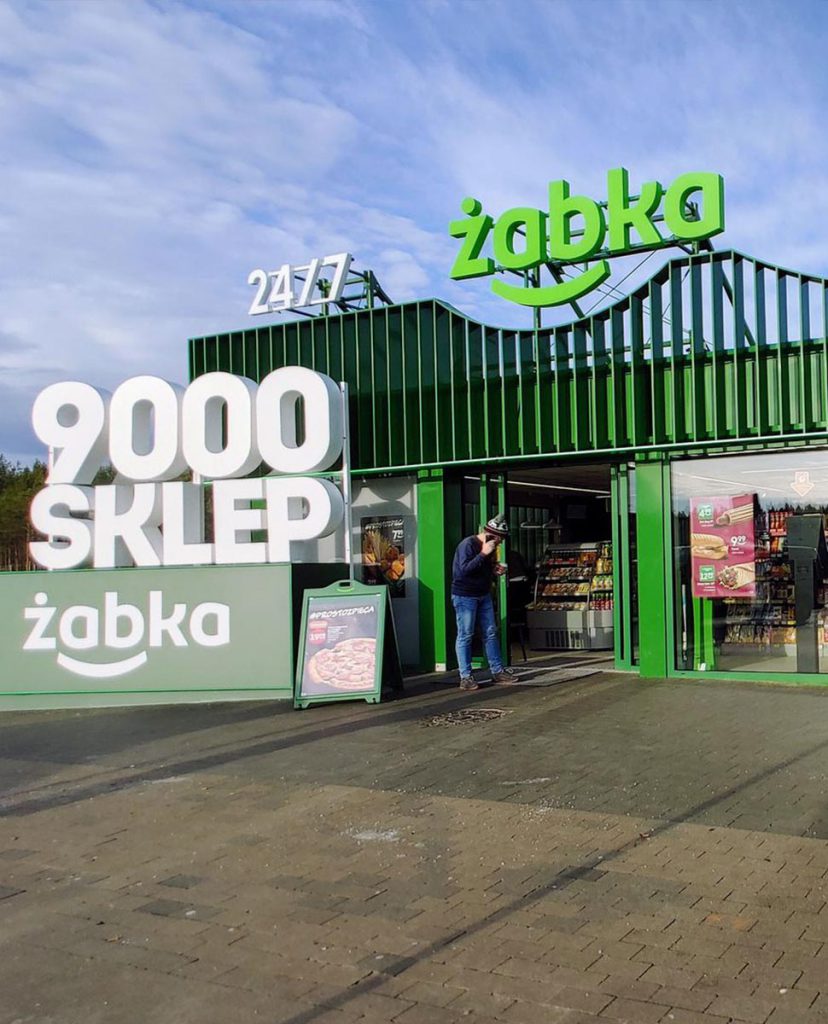
Celebrating 9,000th and 9,001st stores
In an important milestone for the business, in late December 2022 Żabka opened the 9,000th and 9,001st stores in our network. These are on the A2 motorway, at Gnilec (the last stop before the German border) and Sosna (the first on entering Poland from Germany).
The new-format stores, which include self-service checkouts, are designed to give customers quick and convenient round-theclock access to a wide range of hot snacks, sandwiches and salads, meeting the particular needs of those with little time. The new format gives franchisees a great opportunity to run a strong local business. The franchisees in this case are a married couple who have worked with Żabka for several years, making them living proof of the entrepreneurial opportunities that the right people can gain from a close relationship with us. The dynamic design of the new stores aims to enable private and professional drivers to easily identify where they can get the rest

Smart solutions supporting smart business
Smart solutions supporting smart business
Żabka Group is committed to using smart technologies as a
means of realising some of the primary aims of our Responsibility
Strategy. These include reducing emissions intensity related
to franchisees’ stores by 2026, doing so in own operations by 25% by 2025, and empowering franchisees to operate safe and successful local businesses.
Central to our efforts to provide our franchisees with only the best technology is Żabka Smart, our Poznań-based centre of excellence. From here we provide selected stores with a range of innovative, energy-efficient solutions for testing.
These range from flood sensors and stock-control devices to automatic temperature and energy-consumption gauges that communicate with managers, enabling better customer service as well as more efficient energy usage. Vision and voice systems, meanwhile, are designed to deter potential burglars, improving security and making our stores a safer place to work. After analysing the test results, we then implement the best solutions across more stores. It’s an approach that’s driving environmental, satisfaction, safety and sales improvement in a single unified programme.

Reducing business risk

Reducing business risk
Running a business involves a series of inherent risks, also those of a financial nature. In the interest of our franchisees we are the first franchise network in Poland to prepare a new product, “Business Insurance Programme,” in cooperation with Towarzystwo Ubezpieczeń Wzajemnych Polski Zakład Ubezpieczeń Wzajemnych (TUW PZUW). “Business Insurance Programme” is the first product on the Polish insurance market that increases the security of running a business through the compensation of a portion of the potential debt. The monthly cost of the policy and the sum insured depend, among other things, on the number of stores operated by the franchisee. Attractive insurance premiums are guaranteed not only by the scale of Żabka’s operations, but also by the fact that financial support is provided to cover the expenses of the policy at the initial stage of its term. Work on the terms of the policy was performed asked franchisees cooperating with us to participate in the campaign. This attractive offer stands out from the proposals of other chains on the market, as confirmed by the franchisees’ willingness to contribute with the participation of a wide range of franchisees, and the solution itself is intended for all of them, regardless of their history of cooperation with the chain, or of their financial standing. By the end of 2021, all franchisees enjoyed protection offered under this risk-mitigating instrument.

Stimulating the entrepreneurial spirit

Stimulating the entrepreneurial spirit
In 2021, we launched a new campaign known as “To żabkość na rynku” (a play of words in Polish incorporating the word “Żabka” to convey the message “It’s a rare thing on the market” — translator) targeted at potential entrepreneurs who do not have a specific business plan or the funds required to start a business. In 2021, our campaign focused on informing about the financial conditions of operating one’s own Żabka store: an upfront payment of PLN 5,000, PLN 16,000 in basic revenue per month, a fully equipped and stocked store for starter, and emphasised how efficient the process of establishing your own company is. We want to offer greater support and to foster local entrepreneurship all over Poland, which is why we asked franchisees cooperating with us to participate in the campaign. This attractive
offer stands out from the proposals of other chains on the market, as confirmed by the franchisees’ willingness to contribute to the campaign and share their own experiences. In our communications, we
also emphasise the support tools and mechanisms which franchisees take their first steps in the world of business.

Optimising the work of our franchisees

Optimising the work of our franchisees
We provide our franchisees with a set of tools helping them run their stores in an effective manner. OptiPlan is a set of initiatives and solutions aimed at optimising the activities performed in the day-to-day management of the store. The proposed, tested solutions will support some aspects related to the store’s work. The said set comprises solutions related to food safety management and store logistics. It also includes the following: Żabka Assistant (an app allowing each franchisee to conveniently check and plan the scope of works for the coming days), and planograms available in the Żabka Manager app. We support franchisees in their daily operations, thus allowing them to find the time to care for their store, to expand their knowledge and to stimulate the engagement of their employees.

Assistance in hiring staff

Assistance in hiring staff
The range of systemic solutions supporting franchisees is supplemented by flexible forms of assistance in emergency and unforeseen situations. Although the franchisees, being private entrepreneurs, are responsible for all personnel-related issues at their stores, they may count on significant support offered by the “Here and now” programme enabling every franchisee to take advantage of the services of a temporary worker. As in any other business, emergency situations take place in commerce too. They affect the number of staff reporting to work or require that additional help be provided during the peak season. If any of the employees calls out sick, or if additional support is needed during the holiday season, it is often the case that help for the store’s team must be found very quickly. The programme allows those running Żabka stores to pay only for the time during which the temporary employee is completing the tasks ordered. In practice, this means that franchisees are able to conveniently plan labour costs and the division of tasks in the store, regardless of unforeseen situations and unplanned emergencies. Depending on the actual needs of the store, temporary workers may be providing assistance over a period of several hours, days or months.

We are repairing shoes within a partnership with woshwosh

We are repairing shoes within a partnership with woshwosh
Together with woshwosh, the first company in Europe focusing on shoe circularity and collaborating with local cobblers to revive this dying craft, we extend the lifespan of our customers' shoes by several seasons, thereby collectively supporting the natural environment. Cleaning or repair services for footwear can be ordered in-store, through the website, or via the application. Customers can choose individual services or attractive cleaning and repair packages at competitive prices. Shoes should be brought to the selected Żabka store when ordering the service and collected from the same location.
Through this collaboration, we demonstrate our commitment to promoting the zero-waste concept and popularizing shoe cleaning and repair as alternatives to frequent new purchases. Cleaning and repairing shoes, compared to buying new ones, result in savings of up to 95 percent in CO2 emissions! By choosing the shoe cleaning service provided by Żabka and woshwosh instead of washing them in a washing machine, it is possible to reduce the carbon footprint by up to 93 percent! The production of one pair of shoes releases an average of 14 kg of carbon dioxide into the atmosphere and consumes up to 50 liters of water. On average, a pair of shoes takes about 50 years to decompose. Less than 1 percent of discarded shoes are recycled.
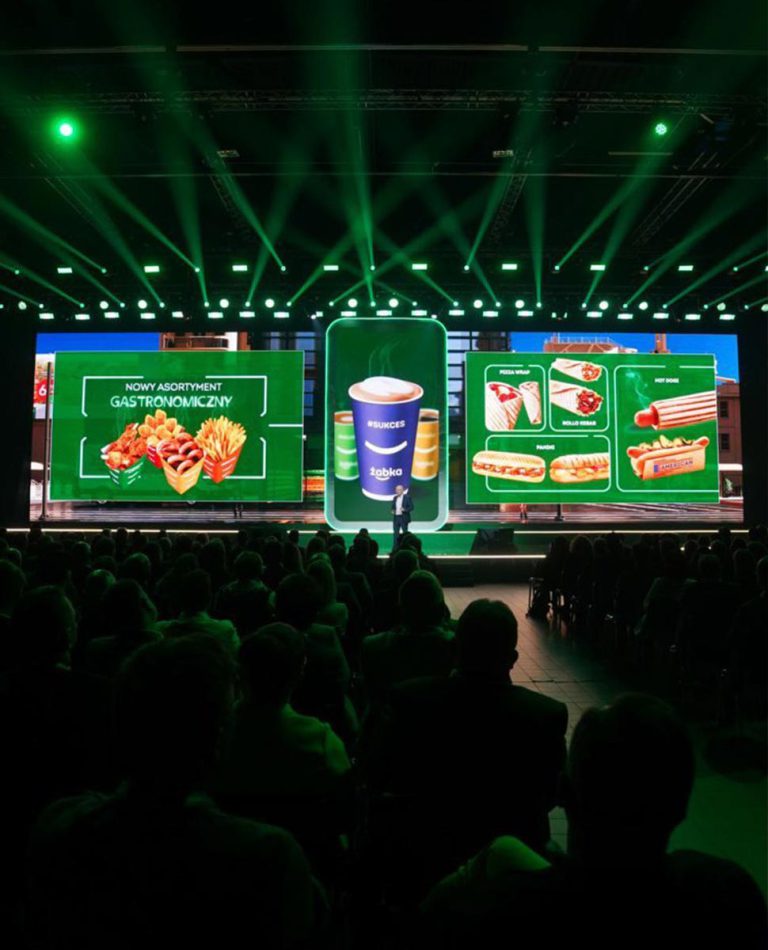
Sustainable collaboration

Sustainable collaboration
Sustainable development requires efficient cooperation, sharing experiences, inspiration and joint actions.
"We believe that the key to success is sustainable and collaborative action. Our business partners play a key role in fulfilling our mission, so we actively want to engage them in building a partnership based on shared values, principles and trust. We believe that this is the only way our business can bring real change and enable responsible business and value creation for our customers. To strengthen our collaboration we introduced fair business platform – an online space, where we support and communicate on various shared projects. We regularly gather feedback as part of the dialogue. We obtained first place in the nationwide satisfaction study (NFS), ahead of the 20 retail chains participating. Moreover, we received the Grand Prize ‘Retailer of the Year 2022 – Chosen by Suppliers’in the category Small Format/Convenience Chain and special award Sustainable Retailer of the Year."
Piotr Rajewski,
Trading Director

Foodtech lab acceleration

Foodtech lab acceleration
The Żabka Group is always seeking solutions whose implementation will accelerate the development of the convenience ecosystem. We do this through our Venture Studio, whose task is to search for and attract to the organisation modern solutions that give a new perspective to the whole Group. 150 startups from 20 countries have taken part in the Foodtech Lab Acceleration Programme launched in 2022, in which we seek solutions that approach nutrition and its impact on the planet in an innovative way. Projects were selected according to current business needs, considering the most important trends that stimulate the development of the retail industry – not only in Poland but also across the world. For the best startups the Group offers collaboration, consumer tests, commercial pilots, and even financial support for further development. In addition, startups can receive access to a sensory laboratory, expert support and personal opportunities to navigate key relationships in this industry. During the final, held in January 2023, 11 companies presented their products, from which we selected five winners.

Cooperation with start-ups

Cooperation with start-ups
We hold meetings with the authors of projects that may exert the greatest positive impact on the Group’s business. Having conducted a careful analysis of the presented solutions, we decide to cooperate with start-ups at different stages of their development journey. The MIT Enterprise Forum CEE accelerator programme is one of the tools we rely on while looking for ESG-related solutions. Our attention is drawn by projects focusing on alternatives to plastic packaging and on replacement protein sources, i.e. solutions helping reduce meat consumption. Together with Huge Thing, an accelerator of innovative solutions, we launched the Żabka Future Lab accelerator programme. We also strive to attempt cooperation with start-ups whose solutions will be helpful in reducing the amount of wasted food (by supporting stock management), or in increasing the comfort of consumers taking advantage of autonomous stores. We have also become a partner of the “Positive Impact Start-ups” campaign overseen by the Koźmiński University’s Koźmiński Business Hub. It focuses on supporting those initiatives that contribute to improving the quality of life and the quality of the environment.

We grow together with our business partners

We grow together with our business partners
Acting together, we analyse the results of our cooperation, so as to make the necessary changes in real time. In order for this to be possible, we have introduced the Advanced Customer Insight Tool (ACIT) providing us and our partners with access to the same multidimensional data, based on which new solutions related to our cooperation are implemented. The work based on ACIT data is accompanied by joint workshops with our trading partners – 170 such working meetings were held in 2021. It is crucial for bilateral development to ensure that our partners are engaged in thinking about the strategic development of the Żabka Group. By presenting the Group’s long-term plans and regularly meeting for a joint review of the results achieved, we provide partners with the knowledge enabling them to build scenarios for the long-term growth of their own companies. Open dialogue and readiness to implement our partners’ ideas are important element of cooperation as well. The workshops are used to jointly identify the changes in the range of products carried by the individual companies, so that they are able to best respond to changing consumer needs. Our suppliers value the openness and cooperation characterising our relations. In 2021, they voted us the Retailer of the Year. We also ranked first in the nationwide NFS survey in which over 400 suppliers and 20 retailers participated.

Helping people settle in Żabka and in Poland

Helping people settle in Żabka and in Poland
It is important to Żabka that the business presents a friendly face to everybody in the workplace. The Group has therefore created the role of ‘Cultural Assistant’, especially to help colleagues for whom Poland is a new country. The key aim is to prove that diversity – of nationality as well as of age and gender – can help the business be more successful and profitable. To this end, the Cultural Assistants have been recruited to help find a common language between recent arrivals and native Poles, helping them settle in and properly feel part of the organisation. There are many areas in which the Cultural Assistants are able to provide support, from helping with documentation to explaining cultural and linguistic differences. Offering guidance on settling into life in Poland can be very valuable too, from dealing with public organisations to getting the right work-life balance. They can also help our recruitment professionals by preparing written information in various languages for recent joiners, as well as helping with workshops, webinars and materials on equality, diversity and cultural inclusivity.

Helping by shopping

Helping by shopping
We encourage our customers to support initiatives promoting social engagement – when shopping at Żabka stores, taking advantage of the Żabka Jush! platform or using the Żappka app. As it is the case each year, our franchisees were collecting money for Wielka Orkiestra Świątecznej Pomocy and were the largest group of volunteers participating in the effort nationwide. Donations could be made via money boxes available in stores. Cashless deposits could be made as well, (for instance via the e-money box, by transferring funds to the Foundation’s account or by using payment cards). The users of our app were able to exchange Żapps loyalty points collected during shopping, for charity donations. The total value of funds transferred in 2021 amounted to PLN 3 million. The mechanism relying on using Żapps points for supporting charities is very flexible and we rely thereon as one of the means of implementing our Social Engagement Strategy. In 2022, our customers using the app were also able to donate their Żapps points for supporting refugees from Ukraine. The total amount of support amounted to over PLN 1 million.

Supporting those willing to engage

Supporting those willing to engage
In 2021, we continued to pursue Żabka’s Scholarship Programme that has been, for a number of years now, an important part of our social engagement initiatives. The programme is aimed at ambitious and talented children of franchisees, employees and co-workers who, thanks to our monthly support, are able to develop their extraordinary passions and skills. During the 11th edition of the programme, we awarded as many as 60 scholarships: 13 for artistic, 9 for scientific and 38 for sports achievements. Biographical notes of the scholarship holders, along with a description of their talents and the results they achieved, are published in Żabka’s information materials. This allows the young people to communicate the impact of support they receive under the programme has on the expansion of their passions. For employees and co-workers valuing cooperation and physical activity, we have created Żabka’s Sports Team. It is made up of active members of our company’s staff who are keen on practicing sports, often work out together and represent Żabka at numerous sports events. The team is currently made up of approximately 130 people showing interest in individual and team sports. They participate in a number of competitions, primarily between March and October, but our players train all year round — they run, ride bicycles, swim, and play basketball and football.

Offering a good start

Offering a good start
When defining our agenda for the “Equal Opportunities” pillar of our Social Engagement Strategy we relied, among others, on the experience gained while supporting youths in a difficult situation and at risk of exclusion. The “Safe internship with Żabka” programme is aimed at people over the age of sixteen. It allows them to take part in an internship at a selected store, thus taking their first steps along the path towards independence. The programme is implemented in cooperation with Fundacja Samodzielni Robinsonowie, with active participation of our franchisees who, as mentors and caretakers, share their experience with our trainees and help them build entrepreneurial skills. During eight editions of the programme, we organised internships for 146 young males and females that the Foundation is caring for. Interns have already worked more than fifteen thousand hours in Żabka stores. Eighteen of them were employed at Żabka stores after the programme had ended, and one of the female interns became our franchisee. So far, ninety franchisees operating Żabka chain stores have been involved in the programme at seventeen locations throughout Poland. Young interns could also count on the support of twenty-six mentors designated by the Foundation.

Olympic silver medal

Olympic silver medal
In August 2021, we took part in a charity auction organised by Maria Andrejczyk — a silver Olympic medalist from Tokyo. Maria put up her medal for sale, with all proceeds benefiting a campaign raising funds for medical treatment (available in the US) needed by an eight-month-old boy named Miłosz. We offered PLN 200,000 for the medal and won the auction. Maria Andrejczyk admitted the medal was “a symbol of struggle, faith and ability to make dreams come true, despite many difficulties”. It was natural for us, as winners of the auction, that this extraordinary symbol should remain where it belonged. That’s why we returned it to our proud champion. In addition to the PLN 200,000 from Żabka, Maria’s fans raised an additional PLN 300,000 for the treatment of Miłosz. The fund raiser has allowed to finance the child’s heart surgery at the Stanford hospital in the US. Maria Andrejczyk’s gesture was widely commented by Internet users. Information about the auction was trending very high on social media. The event was reported by the largest media in Poland and by the press worldwide (“The Times” or “The Sun”).

We are the first Polish organization to receive the Gallup Exceptional Workplace Award
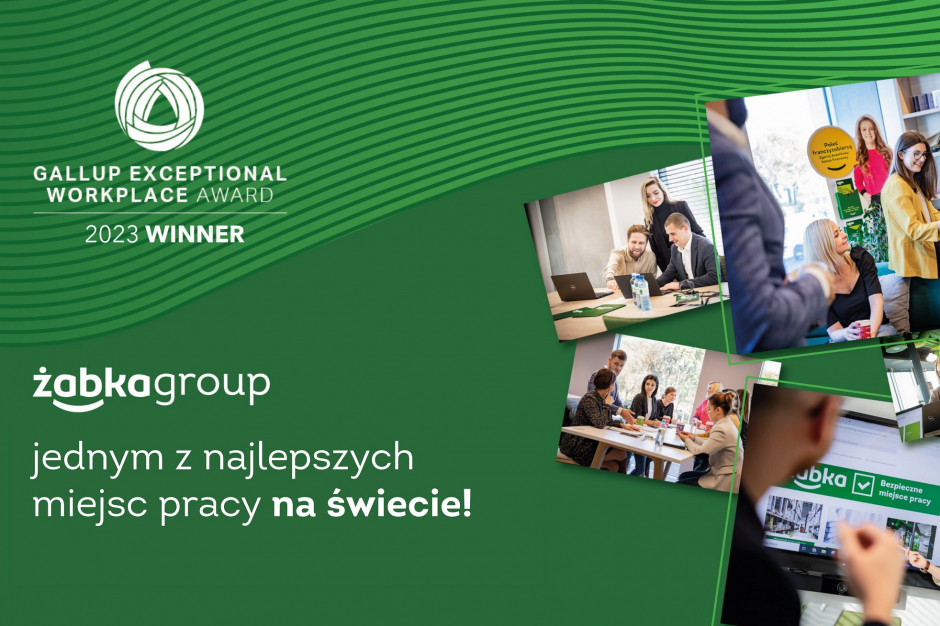
We are the first Polish organization to receive the Gallup Exceptional Workplace Award
The Gallup Institute is the world's oldest institute for public opinion research. The award is preceded by a comprehensive analysis that includes data from over 2 million employees employed in 276 organizations across 54 industries and 96 countries. Award recipients are organizations that create exceptional workplaces. According to institute data, as many as 72% of employees in award-winning organizations are engaged, while the global average reaches only 21%.
For the past five years, we have regularly measured the engagement and satisfaction of our employees. According to the latest Gallup Institute survey results, Żabka is among the top 23% of companies worldwide with the most engaging organizational culture, ranking at the 77th percentile among companies worldwide.
Engagement drives concrete business indicators. According to Gallup, organizations with high engagement also experience 41% less absenteeism, 59% lower employee turnover, and 10% higher customer engagement scores. Engagement levels also impact workplace safety. Companies that maintain high levels of engagement report up to 70% fewer safety-related incidents.
The Gallup survey is anonymous and includes all employees and associates of Żabka. The participation rate in the latest survey reached a record-breaking 92%.

Measuring engagement and inclusivity across the group

Measuring engagement and inclusivity across the group
According to Gallup Institute, our employee’s engagement level is five times higher than the average Polish company.
Behind our business success are several thousand committed employees, and franchisees. Together we have created an organisation based on standards of equal treatment and transparency, where every employee, co-worker and franchisee has equal opportunities and can openly talk about and implement their ideas. Achieving this requires an appreciation of many different needs and points of view, which is why we conduct the Gallup Q12 (measuring engagement level of employees) and Gallup Inclusion Index survey.
The Gallup questions are a framework for us to know how to create and improve our working environment. We analyse the data and prepare action plans to address issues that have impact on engagement and inclusion of our employees. As a result, we create a unique organisational culture, able to recognise the potential of everyone, while creating an environment for open collaboration and sharing experiences.

Żabka with EQUAL-SALARY certification

Żabka with EQUAL-SALARY certification
Żabka has become the first Polish company to receive certification from the EQUAL-SALARY Foundation, confirming that gender has no role to play in determining how much employees are paid.
The certification is based on UN guidelines and recognised by the EU. The awarding body is the Swiss EQUAL-SALARY Foundation, an independent non-profit organisation formed in 2010 to take a science-based approach to the inspection and certification of organisations’ payroll policies. As well as auditing salary data, the inspectors ran focus groups where employees could openly discuss their perceptions of equal pay. The certification therefore confirms the Żabka’s credibility in the eyes of the workforce as a true equal-pay employer. Żabka is naturally pleased with this recognition, as its values-based Payroll Policy is designed to ensure that employee remuneration depends entirely on an individual’s skills, the results they achieve and their impact on the organisation. The requirement for certification to be renewed after three years means the Group needs to continuously monitor and improve its salary processes.

Promoting equity

Promoting equity
The commitment to implement a culture of equal opportunities and an inclusive organisational culture is expressed in the Equity Policy we have adopted. Its implementation, communication and monitoring are the responsibilities of the Equity and Inclusive Organisational Culture Manager. That is how we guarantee that decisions are taken without prejudice, based on competence, experience and the work results achieved. The Żabka Group is open to people with different identities, experiences, competences and prospects, and that is the spirit we desire to build our teams on. The positive results of our activities are confirmed by the outcome of the pulse survey. This year, its scope was expanded to include questions about diversity and inclusive organisational culture: “the company is open to diversity among employees” and “I am treated equally in the company, regardless of who I am”. The aim of those questions was to verify whether employees have a sense of equal treatment and whether the Żabka Group, as an organisation, is open to diversity. The study participants assessed both statements as highly accurate: on a scale from 1 to 10, the score regarding the first question equalled 8.7, and in the other, it amounted to 9.1.

Caring for our employees’ growth
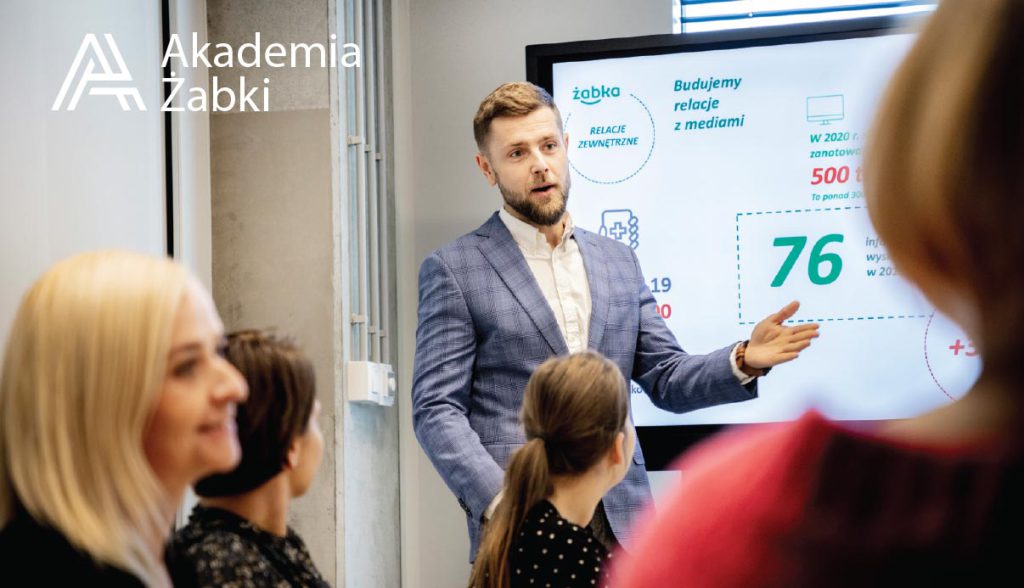
Caring for our employees’ growth
Żabka Academy is a platform offering a series of training programmes and development activities tailored to the needs of employees, as well as our co-workers and franchisees. We offer on-boarding, specialist and managerial training. The Academy also conducts unique projects designed in cooperation with schools or universities, such as doctorate theses implementing specific solutions. All employees can also benefit from subsidies for English language courses — group or individual classes are offered, and the courses are supplemented by access to an e-learning platform. In 2021, a new module Logistics Manager Academy was introduced in response to the development needs of personnel performing logistics-related tasks. We have also ensured that managerial competences were strengthened. The management staff commenced a dedicated Senior Leader Development Programme. The most experienced managers participate in a diagnostic programme leading to the development of growth programmes tailored to their individual needs. The most talented in the organisation are able to boost their qualifications through training sessions organised by INSEAD, Stanford University, Yale and other institutions. All those activities gradually bring us closer to achieving the strategic objective. In 2021, the average time spent by each employee on their development equalled 22 training hours, without the mandatory OHS training considered.

New policies for suppliers

New policies for suppliers
We want the process of making products to have no negative impact on forests, soils, waters or animals, and that those employed in production are treated in a way that respects human rights by providing decent working conditions and preventing child labour.
We have taken steps to minimise the ecosystem impact of our own brand products, including coffee, tea, cocoa, soya, fish and seafood across our own brands ranges. Therefore, we implemented an Animal Welfare Policy and Policy of Sustainable Harvesting of Plant Raw Materials and Sustainable Fishing of Fish and Seafood. We have eliminated palm oil from our own brand products and in accordance with our Sustainable Palm Oil Policy - from 1 January 2023, 100% of producers brand products contain only palm oil from certified sources. We implemented Water Policy that sets out the rules relating to the reduction of water use and the protection of water resources and Waste Management Policy, by which we aim at reducing the amount of waste that is sent to landfills. We are conducting an analysis of our own operations to limit the risks of operational activities in areas in close proximity to critical biodiversity of global or national importance, which will See our policies conclude as Biodiversity Policy in 2023.

Code of ethics and conduct for franchisees
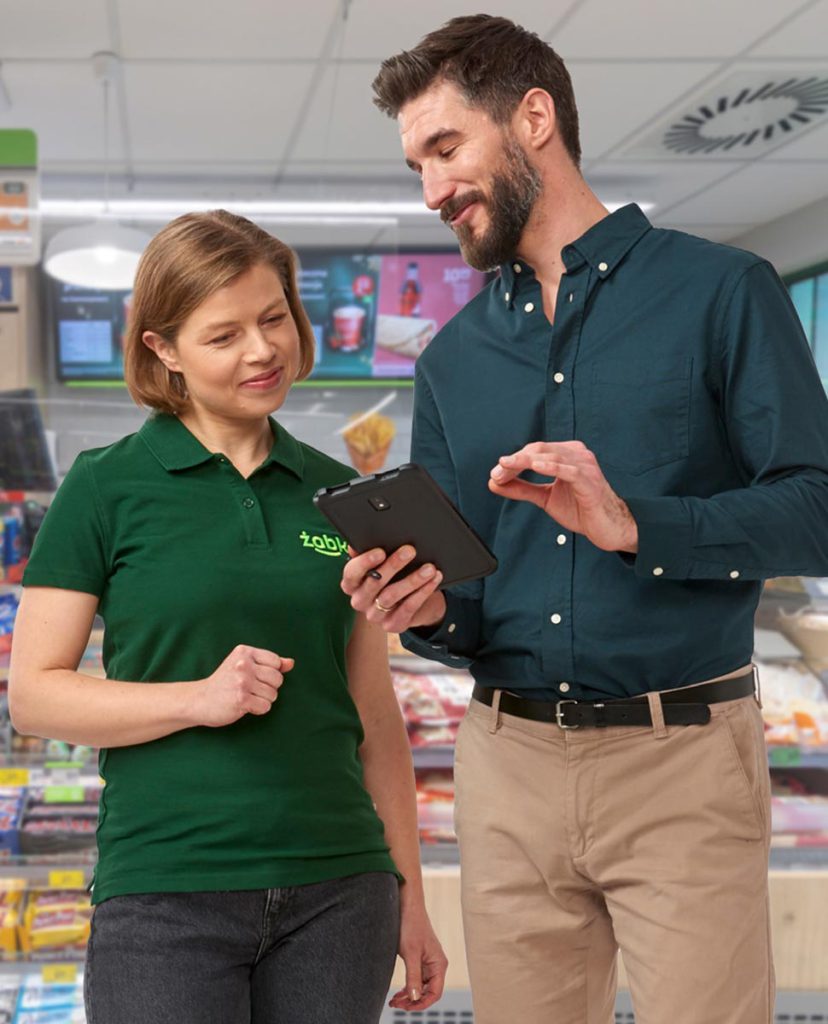
Code of ethics and conduct for franchisees
We are concentrating on building a complex ethical system that covers all of our operations. In order to do this, apart from Code of Ethics for our employees and business partners, we have also implemented the Code of Ethics and Conduct for our franchisees. To date, nearly 97% of franchisees have signed it and more than 60% have completed the associated e-learning course. The document is aimed at supporting franchisees and their employees in making decisions that comply with the ethical standards adopted by Żabka. It therefore addresses aspects such as the need to operate in compliance with the law, respect for human rights, principles of fair competition, conflict of interest, environmental protection, working and pay conditions or relations with the environment. In order to check franchisees’ compliance with the Code, Żabka reserves the right to external verification. The franchisee is obliged to report any violations through the whistleblowing platform or in writing, by sending a letter addressed to the Żabka headquarters and in in case of any questions concerning the provisions of the Code, the Compliance Department is there for a help. We guarantee a full anonymity to a person who reports any violation.

We have adopted the Code of Conduct and Ethics for Employees

We have adopted the Code of Conduct and Ethics for Employees
The document supports our employees whenever they face an ethical dilemma. It is applied throughout the entire value chain, referring both to relationships existing within our organisation and to those with external stakeholders. Provisions reminding about ways of reporting any violations of the Code, as well as about other applicable policies and procedures constitute a key element of the Code. The strengthening of ethical standards is supported by two mandatory annual training programmes focusing on compliance issues and on the Code of Ethics. In 2021, 90% and 77% of our employees completed those programmes, respectively. We are continuing our efforts to increase the share of those trained in the coming years. By expanding our employees’ knowledge, we also ensure more efficient management of the whistleblowing process. In 2021, we received four reports about potential violations of the Code. They were all subjected to internal investigations performed by the Ethics Committee and were deemed justified. They Approximately 190 suppliers generating more than 30% of our total turnover are being assessed in the pilot phase of the project. In the process, we use the global SMETA platform, developed to exchange information on production standards within the supply chain. Suppliers are evaluated in five areas, and the verification results in an assessment of the risk of cooperation with a given company. included allegations of discrimination and corruption, but the investigations failed to confirm any of those accusations. We have taken steps to prevent the similar situations from occurring in the future, in accordance with the procedures in effect.

We have implemented the Code of Conduct for Business Partners

We have implemented the Code of Conduct for Business Partners
The document is based on key international and national legislation. Its provisions cover the full spectrum of business activity – from ethical business management and respect for workers’ rights, through the quality of products and services offered, to environmental and climate impacts. We build our business relationships based on mutual trust. That is why the Code identifies channels for reporting potential violations of its provisions and clearly presents mechanisms for handling these. We require all business partners to confirm, with their signature, that they have read and understood the document. We also work on introducing a system for verifying our business partners and for analysing supply chain risks. Approximately 190 suppliers generating more than 30% of our total turnover are being assessed in the pilot phase of the project. In the process, we use the global SMETA platform, developed to exchange information on production standards within the supply chain. Suppliers are evaluated in five areas, and the verification results in an assessment of the risk of cooperation with a given company.

We have received two CSR Leaves of a magazine “Polityka” and an award for good practices

We have received two CSR Leaves of a magazine “Polityka” and an award for good practices
For another consecutive year, the weekly magazine "Polityka" has awarded us the Golden CSR Leaf. Żabka has also received the Green CSR Leaf for the second time, which has been awarded since last year to companies whose key actions focus on reducing their negative impact on the climate. We were also recognized for our good practices in stores related to closing the resource loop. Only 5 organizations, including Żabka, out of 127 submissions, received all three awards combined.
The organizer once again appreciated the fact that we actively and consistently strive to minimize our negative impact on the environment by working on reducing the energy intensity of our operations, seeking low- and zero-emission energy sources, testing innovative green technologies, and encouraging consumers to make planet-friendly choices.
The Golden, Silver, and White CSR Leaves by "Polityka" have been awarded for the twelfth time based on the analysis of a survey filled out by companies, developed according to the guidelines of the ISO 26000 standard on the basic principles of social responsibility, and in reference to the European Standards for Sustainable Development Reporting and the latest ESG trends.

Our "Convenient and Responsible" report among the best sustainable development reports in the world

Our "Convenient and Responsible" report among the best sustainable development reports in the world
The "Convenient and Responsible" report for the year 2022 is already our fifth Responsibility Report prepared by us. The information found within presents a summary of selected actions implemented by the Żabka Group as part of our Responsibility Strategy. The report has been prepared in accordance with the latest non-financial reporting standard, the Global Reporting Initiative (GRI Standards), Sustainability Accounting Standards Board (SASB), and has undergone independent external verification.
The competition that assesses sustainable development reports is organized by Hallbars, an international organization that brings together talents from Europe and Asia, focusing on promoting readership of such reports. Over 1,500 sustainable development reports were submitted by companies and organizations from 94 countries. In 2023, particular emphasis was placed on the food and beverage sector. Out of 294 submissions from 51 countries, the best reports in the world were selected. The reports were evaluated based on their content, readability, and production quality.

ESG-linked financing

ESG-linked financing
Modern business must be credible and transparent in its operation, and responsibility and trust are currently the most valuable assets.
Our goal is to plan the development of our entire organisation in a responsible manner. We have already signed six agreements related to sustainable finance instruments, and we are actively cooperating with other market participants in this matter. Financial instruments based on ESG goals are an additional motivation for us to meet our commitments and proof that we take these commitments seriously. All agreements contain the company’s commitments related to the implementation of selected, measurable ESG goals, consistent with the Responsibility Strategy announced by Żabka Group in 2021. The first aspect is decarbonisation with goals validated by Science Based Target Initiative, the second one related to good nutrition area, where we support our customers to make more informed choices. The progress in achieving the objectives set out in the agreement will be verified after the end of a given financial year by an independent assurance provider. If we fail to achieve specified targets within an agreed timescale, we will provide additional funding for activities supporting United Nations Sustainable Development Goals (SDGs).

Our commitment to transparent reporting

Our commitment to transparent reporting
Reporting on our ESG performance is a key aspect of our stakeholder communications and an essential way of building the credibility of the Żabka Group.
To ensure the highest standards of disclosure, we have prepared this, our fifth Responsibility Report, according to the latest Global Reporting Initiative Standards and the requirements of the Sustainability Accounting Standards Board (SASB). To ensure compliance and data reliability, we have procured an independent external verification in accordance with ISAE (International Standard on Assurance Engagements) 3000.
Having in 2020 become one of the first companies in Poland to publish a Climate Report, we have included this as part of this Responsibility Report, setting out our decarbonisation plan and reporting on progress against our science-based targets. Our approach has been rewarded in the past by prestigious awards. Our 2021 report was selected in the Hallbars Awards 2022 as one of the five best such disclosures in Central Europe.

Verification and certification of ESG activities

Verification and certification of ESG activities
In 2021, we underwent the external EcoVadis certification process again. After receiving the medal last year, we developed a remediation plan aiming to make our undertakings more professional. The said plan has been successfully implemented throughout the organisation. It has resulted in a significant increase of scores in all areas subject to assessment. Twenty-one criteria divided into four categories are taken into consideration during the certification process: human and employee rights, the environment, ethics and sustainable procurement. As a result of the assessment, we have received the highest possible distinction — a platinum medal. This ranked us among 1% of companies globally that are most successful in integrating ESG aspects into their strategies and operations. Additionally, we received the highest possible score (“best in class”) for managing our carbon footprint. This was possible thanks to implementing a system for measuring, monitoring and reporting emissions and thanks to setting reduction targets approved by SBTi.

Small gesture, great impact

Small gesture, great impact
It’s a remarkable fact that a returnable glass bottle is used on average between 15 and 26 times, significantly reducing the carbon footprint during its lifecycle.
This is why during summer 2022 Żabka Poland ran an educational programme to encourage customers to bring empty returnable beer bottles back to our 8,400+ stores. Anyone doing so received a 50 gr price reduction on a full replacement bottle, up to a total of 20 bottles per transaction. We noticed year-on-year increase in returns by 10 p.p.
This is particularly heartening because the positive impact of any
increase in the re-use of glass bottles is significant. According to The Union of Brewing Industry Employers – Polish Breweries, producing one ton of glass consumes on average 800kg of sand, 280kg of calcium, 230kg of soda and 30kg of dyes. It also takes an average 1.1 MW of power per bottle. The fact that we at Żabka reach millions of customers across Poland every day enables us to have a significant impact on consumer habits across many areas. This promotion shows how important even small gestures can be to the environment when made en masse.

The second life of packaging

The second life of packaging
As part of our ‘Green Renewal’ pilot project, implemented in partnership with the Bydgoszcz City Hall, our customers can return disposable beverage plastic and aluminium packaging in 120 Żabka stores across the city. The collected raw materials will be used to create new packaging, thanks to which less waste will be sent to landfill. The campaign also aims to build environmental awareness among customers and develop the habit of returning plastic and aluminium beverage packaging. Our advantage lies in the proximity of the stores: the multiple collection points, and the ease and speed involved in returning the packaging. We are also rewarding customers for their pro-ecological attitude: for every plastic bottle or aluminium can returned, they receive 50 żapps. There are two ways to return packaging: via special butelkomat machines for selective waste collection or it is possible to return the packaging directly to the salesperson, who will also award the bonus żapps.

Electric vehicle fleet in the pilot phase

Electric vehicle fleet in the pilot phase
We are implementing a pilot phase of the programme under which heavy goods vehicles will be procured in partnership with two entities. Since 2019, we have been testing zero-emission commercial vehicles in cooperation with the Volkswagen Group. We use four electric ABT transporters and two e-Crafter vans. We have also invested in our own electric car charging stations at the distribution centres in Nadarzyn and Plewiska, and in our headquarters. In 2021, we started cooperation with Volvo Polska, testing a zero-emission refrigerated Volvo FL Electric truck. It is used for delivering goods to stores in the Silesia region. It is the first fully electric distribution truck in Poland that was for working in the city. We are also gradually modernising our fleet of passenger cars and are conducting tests aimed at replacing combustion engine vehicles with their electric and hybrid counterparts. New electric and hybrid cars reduce greenhouse gas emissions and noise levels, so that they can be successfully used in clean transport zones.

Circularity

Circularity
Our suppliers of goods and services are responsible for 68% of scope 3 carbon footprint emissions, which is why we involve partners from various industries in search of innovative solutions to reduce emissions in the value chain. An example is cooperation with the carbon neutral brand Goodvalley, whose products have a zero carbon footprint, and Grupa Żywiec, which uses only electricity from renewable sources in its production process. We also look for emission reduction opportunities through convenienct services, as we reduce emissions through delivery to pickup points in cooperation with InPost and other logistics operators in Poland. Delivering a parcel to Żabka generates a lower carbon footprint than direct delivery to the customer personal address. By encouraging conscious food choices, we are also expanding the range of plantbased products as an excellent alternative to animal products. We have introduced products of such brands as Garden Gourmet, Dobra Kaloria or Alpro. In 2021, we also created our own 100% plant-based brand, Plant Hunter.

Lowering GHG emissions in own operations

Lowering GHG emissions in own operations
We approach the issue of reducing CO2 emissions in a comprehensive manner. In 2022, are focus was on driving down emissions in own vehicle fleet and energy efficiency.
We progressed with decarbonisation of own fleet of around 1,600 passenger cars by taking on 500 new Toyota Yaris Cross hybrids. They are used by field employees who historically consume significant amount of fuel due their type of work. In addition, we have invested in our own charging stations for electric cars at our Poznan headquarters and logistics centres in Nadarzyn and Plewiska to support employees traveling with electric vehicles. In addition, we organized a competition for energy efficiency ideas for franchisees and employees, which received 999 entries, mainly related to areas of equipment, lighting and heating. We also initiated the construction of two photovoltaic power plants in the Gliwice and Radzymin distribution centres. For consecutive year, 100% of electricity in own operations comes from renewable sources.

Reducing environmental impact across the value chain

Reducing environmental impact across the value chain
In 2022, we introduced the first climate neutral product of our own brand - Od Nowa water. By calculating its carbon footprint, we managed to ascertain the emissions that arise in the product life cycle. We then reduced the carbon footprint as much as possible - using bottles from recycling, which have a lower carbon footprint than bottles made from virgin materials and supplying energy from renewable sources for a half of the Żabka stores. However, it was not possible to eliminate all the greenhouse gas emissions arising from the life cycle of Od Nowa water, so we neutralised the remaining emissions by purchasing offset credits. Apart from environmental impact of products sold in Żabka stores, we also care about the place itself. In 2022 in Poznań, Żabka opens its first Eko Smart store - a laboratory of ecological innovations enriched with smart solutions, e.g. green energy – PV panels, new innovative perovskite photovoltaic installation on the wall, refrigerators with glycol-filled shelves for better efficiency. On top of that, the entire wall is covered with plants to produce oxygen and digest harmful substances. Customers are also encouraged to use butelkomat - a machine for collecting plastic packaging and cans for recycling.

We joined the Polish Plastic Pact

We joined the Polish Plastic Pact
The pact is part of the global Plastics Pact Network operated by the Ellen MacArthur Foundation. More than four hundred companies responsible for introducing 20% of packaging to the global markets, institutional stakeholders, non-governmental and industry organisations, as well as scientific centres and investors participate in the initiative globally. The aim of the Polish Plastic Pact is to change the current model of using plastics in packaging materials, to ensure that the principles of circular economy are followed. Members of the Pact shall take effort to increase the recycling rate and, consequently, reduce the carbon footprint. They also commit to initiate consumer awareness projects and contribute to increasing the level of correct segregation of packaging materials. The objectives set by the signatories of the Pact for the period until 2025 reach beyond the legal regulations in force in Poland.

We have implemented the Circularity Policy for Plastic

We have implemented the Circularity Policy for Plastic
It allows our business partners to be involved in activities that maximise our impact on ensuring circularity of plastic use throughout the entire value chain. The policy will be implemented gradually, in cooperation with all business partners. It is based on the original green circulation model, which provides guidance on responsible resource management in seven areas: eco-design, resource-conscious creation, sustainable distribution, responsible sales, conscious consumption, efficient collection as well as comprehensive recovery and recycling. We have established a set of clear principles we follow in our endeavors towards circularity, and we are applying accountability rules to the entire process – from design, to ensuring a second life and revitalising the environment.

We have developed our Eco-design Policy

We have developed our Eco-design Policy
The Policy serves as a roadmap, presenting clear rules for designing and selecting suitable raw materials for the packaging of own brand products and for materials used in stores. It is based on four principles: loop, reduce, simplify and communicate. We reduce the weights and volumes, as well as promote reusable types of packaging. When designing packaging, we place an emphasis on the choice of materials and the use of recycled products. Components that are preferred in recycling processes are given priority as well. We simplify the form of packaging by ensuring its shape allows the product to be emptied. Using a system of pictograms placed on the packaging, we offer consumers advice on which fraction of waste should it be disposed of to after the contents have been used. In accordance with the Policy, we avoid contrast colours, soot-based pigments and solid, inseparable labels made of materials other than the packaging itself. All these measures make the packaging easier to recycle.

Eliminating plastic and foil packaging

Eliminating plastic and foil packaging
We have replaced plastic coffee cup lids and shopping bags with their equivalents made of paper with the FSC certificate. Such an approach ensures that at least one new tree is planted for each that has been felled. The paper used in the manufacture of shopping bags and coffee cup lids decomposes naturally over the course of several weeks. Due to these changes, we have reduced the use of plastic by approximately one thousand tonnes per year. We are developing solutions with our suppliers to reduce the use of foil packaging in our products. Thanks to cooperation with Carlsberg Poland, we introduced to the market six-packs of beer relying on Snap Pack technology. Instead of wrapping cans with foil, they are attached to each with the use of adhesive. This reduces the consumption of foil by as much as 82% compared to standard packaging.

Partnerships for positive change

Driving new efficiencies in our Transport Department

Driving new efficiencies in our Transport Department
Transport has always had an essential role to play in our value chain at Żabka Group – and during 2023, it once again had a key role in our decarbonisation efforts.
The sheer scale of our logistics operations means that everything we can do to reduce the environmental impact of it will have a significant positive outcome. That’s why, over recent years, we have been steadily increasing the proportion of trucks operating in deliveries to our stores that meet the stringent demands of the Euro 5 and Euro 6 emission standards, up from just over half in 2020 to reach 76.61% during 2023.
Reducing the use of dry ice
This shift provides the background to a range of further initiatives designed to reduce the carbon emissions in our logistics. By the end of 2023, more than half of our stores were receiving dedicated refrigerated and frozen deliveries via an expanded fleet of refrigerated vehicles, which is enabling us to significantly reduce the potentially harmful to the climate use of dry ice in our logistics.
‘We achieved many ambitious goals in 2023, all thanks to the determination and professionalism of our exceptional transport team,’ says Director of Logistics Katarzyna Słabowska. ‘I’d also like to thank our warehousing colleagues for their help in meeting shared goals. We’ll achieve even more together in 2024.’
Recognition
In line with our strategic commitment, we enhance our transparency and credibility by regular external verifications in the area of responsible management (ESG). We make every effort to work with entities that are recognizable and have transparent methodologies. Our ambitious approach to sustainable development and the actions that bring us closer to achieving it have been recognised, confirming our contribution and positive impact on our customers, employees, business partners and local communities.
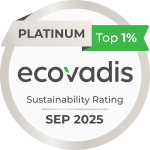
EcoVadis sustainability
rating - Platinum Medal

In July 2023, Żabka Polska sp. z o.o. received an ESG Risk Rating of 12.5 and was assessed by Morningstar Sustainalytics to be at Low risk of experiencing material financial impacts from ESG factors

The Equal Salary certificate indicating equal pay in the organization regardless of gender

MSCI ESG RATINGS AAA
ESG Report
Publishing the ESG report of Żabka Group supports one of its values which is an openness and enhance its transparency. We are committed to the communication with various groups of stakeholders and therefore we are continuously improving our sustainability reporting process. The summary of our actions taken in the area of ESG performance in following years are presented in our reports.
Working hard for health, safety and wellbeing – at work and at home
At Żabka Group, we prove every day that taking preventative action is the best basis for creating a safe working environment. In the words of our Health and Safety Director Robert Żmudzki, “Good education and prevention deliver the key to our goal - minimising accidents at work - and 2023 was full of actions in both these essential areas.”
We have always taken this subject very seriously, with a commitment to training all our people in health and safety, both when they join us and at regular intervals thereafter. Responsibility for this area goes right to the top of the company. When the Żabka Group Safety Committee meets on a quarterly basis, its meeting is also attended by the Management Board member responsible for our People Strategy and topics discussed include issues around the company’s internal safety and hygiene management system.
Our commitments in this area were once again rewarded in 2023 when we received an award of the “Supermen of Quality 2023”. The competition organised by TÜV NORD Polska awarded us 1st place in the “Safety” category.
Raising our game
This year we raised our game to a new level, with actions including updated presentations for our distribution staff and surveys to record their feedback so that we can improve our materials even further.
Once their initial training is over, we also provide all new starters with our Occupation Health & Safety (OHS) Knowledge Compendium and OHS Starter Kits outlining all necessary procedures and manuals for distribution staff. And, as part of our ZDROwiedzący (Health Knowledge) project, we held six interactive educational webinars during 2023, presented by specialists and external experts on disease prevention, substance use and safety at work and in the home.
Our employees underwent 1,389 occupational health medical check-ups during the year. To make sure they can take the best possible care of their health, we also provide them and their families with access to subsidised private medical services. More than 1,800 employees took advantage of this opportunity in 2023.
To ensure immediate assistance in the event of an accident in the workplace, we regularly organise on-site training courses on first aid. The training sessions totalled 816 hours, with 136 members of rescue teams trained as a result.
Because we understand that supervisors shoulder a great deal of responsibility for safety at work, we have developed a project called Świadomy Przełożony (Aware Supervisor), in which we make sure they have the training, support, advice and additional materials they need.
And, to protect mental health of employees and their families, we have created the Employee Assistance Programme (EAP). This goes far beyond psychological support and includes advices on financial and legal matters too. People can get help via a dedicated helpline and app, with no restriction on number of times they may use it. During the last year, one employee in every 25 took advantage of the programme.
Efforts to minimise accidents
We recorded 22 accidents at work in 2023, accounting for 5.42 lost time injury frequency rate (LTIFR) which is higher than last year's rate of 4.17. We identified the most common cause as being employees paying too little attention to the tasks underway. Preventative actions following our detailed analysis have included appropriate technical solutions as well as additional training. We have made every effort to keep our employees safe, not only by constantly improving mandatory health and safety trainings, but also through numerous measurements of working environment factors.
Focus on franchisees
Our focus wasn’t exclusively on employees. As Robert Żmudzki puts it, “We also expanded our Franchisee Handbook to include materials on health and safety and First Aid.”
Other actions to support franchisees in 2023 included the development and update of multiple items, ranging from health and safety instructions and occupational risk assessments to an occupational disease register and an accident register, a list of equipment for first aid kits and a workwear allocation card. Instruction templates were placed on our development platform and intranet for franchisees.
Jan Kisielewski Movie


